#Ruth Perrott
Explore tagged Tumblr posts
Text














From the Golden Age of Television
Season 1 Episode 3
The Gray Ghost - Point of Honor - Syndication - October 24, 1957
Civil War Drama
Running Time: 30 minutes
Written by Jack DeWitt
Produced by Lindsley Parsons
Directed by Hollingsworth Morse
Stars:
Tod Andrews as Major John Singleton Mosby, C.S.A.
Phil Chambers as Sgt. Myles Magruder
Angie Dickinson as Edie Page
Liam Sullivan as Colonel Magruder
Ruth Perrott as Martha Page
Lionel Ames as Lt. Keith
Wally Richard as Captured Lt.
Robert Fuller as Dan Hatcher (as Bob Fuller)
Rick Devin as Union Sentry
#Point of Honor#TV#The Gray Ghost#Civil War#Drama#Syndicated#1950's#1957#Tod Andrews#Phil Chambers#Angie Dickinson#Liam Sullivan#Robert Fuller
0 notes
Text
THE MAN WHO CAME TO DINNER
March 27, 1950
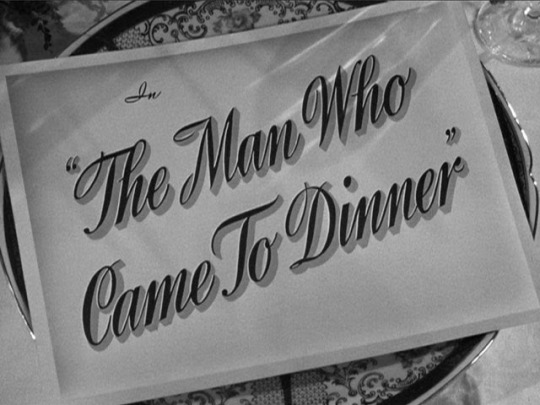
"The Man Who Came To Dinner” was a presentation of Lux Radio Theatre, broadcast on CBS Radio on March 27, 1950.

The Man Who Came to Dinner is a comedy in three by George S. Kaufman and Moss Hart. It debuted on October 16, 1939, at the Music Box Theatre in New York City, where it ran until 1941, closing after 739 performances. It then enjoyed a number of New York and London revivals.

The play was adapted for a 1942 feature film, scripted by Philip G. Epstein and Julius J. Epstein and directed by William Keighley. The film featured Monty Woolley, Bette Davis, Ann Sheridan, Billie Burke, Jimmy Durante, Mary Wickes and Richard Travis.
“The Man Who Came to Dinner” was previously presented on radio by Philip Morris Playhouse on July 10, 1942. Monty Woolley, who played the leading role in the film version, starred in the adaptation. It was broadcast again by Theatre Guild on the Air on ABC Radio November 17, 1946 starring Fred Allen. In 1949, “The Man Who Came to Dinner” was produced on “The Hotpoint Holiday Hour” starring Charles Boyer, Jack Benny, Gene Kelly, Gregory Peck, Dorothy McGuire, and Rosalind Russell.
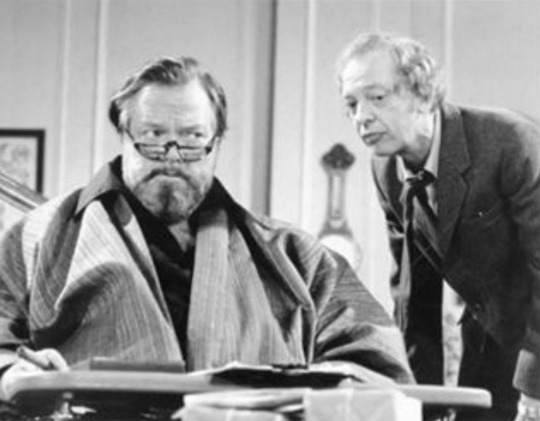
On October 13, 1954, a 60-minute adaptation was aired on the CBS Television series “The Best of Broadway.” A “Hallmark Hall of Fame” production was broadcast n November 29, 1972 starring Orson Welles, Lee Remick (Maggie Cutler), Joan Collins (Lorraine Sheldon), Don Knotts (Dr. Bradley), and Marty Feldman (Banjo). The 2000 Broadway revival was broadcast by PBS on October 7, 2000, three days after the New York production closed, and was also released on DVD.
Synopsis ~ The story is set in the small town of Mesalia, Ohio in the weeks leading to Christmas in the late 1930s. The outlandish radio wit Sheridan Whiteside is invited to dine at the house of the well-to-do factory owner Ernest Stanley and his family. But before Whiteside can enter the house, he slips on a patch of ice outside the Stanleys' front door and injures his hip. Confined to the Stanleys' home in a wheelchair, Whiteside and his retinue of show business friends turn the Stanley home upside down! But is he really injured?
This adaptation was written by S.H. Barnett. The characters eliminated for this adaptation include Richard Stanley, John, Mrs. Dexter, and Mrs. McCutcheon.
The show is hosted by William Keighley, who directed the 1942 film adaptation.
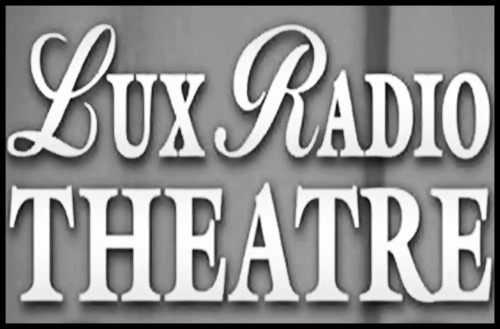
Lux Radio Theatre (1935-55) was a radio anthology series that adapted Broadway plays during its first two seasons before it began adapting films (”Lux Presents Hollywood”). These hour-long radio programs were performed live before studio audiences in Los Angeles. The series became the most popular dramatic anthology series on radio, broadcast for more than 20 years and continued on television as the Lux Video Theatre through most of the 1950s. The primary sponsor of the show was Unilever through its Lux Soap brand.
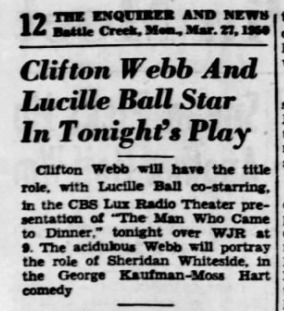
CAST
Lucille Ball (Maggie Cutler) was born on August 6, 1911 in Jamestown, New York. She began her screen career in 1933 and was known in Hollywood as ‘Queen of the B’s’ due to her many appearances in ‘B’ movies. “My Favorite Husband” eventually led to the creation of “I Love Lucy,” a television situation comedy in which she co-starred with her real-life husband, Latin bandleader Desi Arnaz. The program was phenomenally successful, allowing the couple to purchase what was once RKO Studios, re-naming it Desilu. When the show ended in 1960 (in an hour-long format known as “The Lucy-Desi Comedy Hour”) so did Lucy and Desi’s marriage. In 1962, hoping to keep Desilu financially solvent, Lucy returned to the sitcom format with “The Lucy Show,” which lasted six seasons. She followed that with a similar sitcom “Here’s Lucy” co-starring with her real-life children, Lucie and Desi Jr., as well as Gale Gordon, who had joined the cast of “The Lucy Show” during season two. Before her death in 1989, Lucy made one more attempt at a sitcom with “Life With Lucy,” also with Gordon.
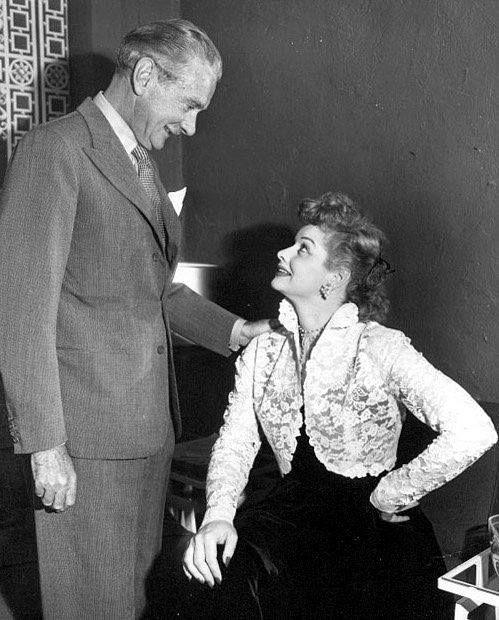
Clifton Webb (Sheridan Whiteside) had appeared with Lucille Ball in the 1946 film The Dark Corner. He was nominated for three Oscars. Webb had played the role of Sheridan Whiteside on stage for two years.
Eleanor Audley (Mrs. Stanley) appeared in several episodes of Lucille Ball’s “My Favorite Husband” as mother-in-law Letitia Cooper. Audley was first seen with Lucille Ball as Mrs. Spaulding, the first owner of the Ricardo’s Westport home in “Lucy Wants to Move to the Country” (ILL S6;E15). She returned to play one of the garden club judges in “Lucy Raises Tulips” (ILL S6;E26). Audley appeared one last time with Lucille Ball in a “Lucy Saves Milton Berle” (TLS S4;E13) in 1965.
Ruth Perrott (Sarah) played Katie the maid on Lucille Ball’s radio show “My Favorite Husband.” On “I Love Lucy” she played Mrs. Pomerantz in “Pioneer Women” (ILL S1;E25), was one of the member of the Wednesday Afternoon Fine Arts League in “Lucy and Ethel Buy the Same Dress” (ILL S3;E3), and played a nurse when “Lucy Goes to the Hospital” (ILL S2;E16).
Betty Lou Gerson is best remembered as the voice of Cruella De Ville in the original Disney film One Hundred and One Dalmatians (1961).
Stephen Dunn had appeared with Lucille Ball in Miss Grant Takes Richmond (1949).
John Milton Kennedy (Announcer)
‘DINNER’ TRIVIA
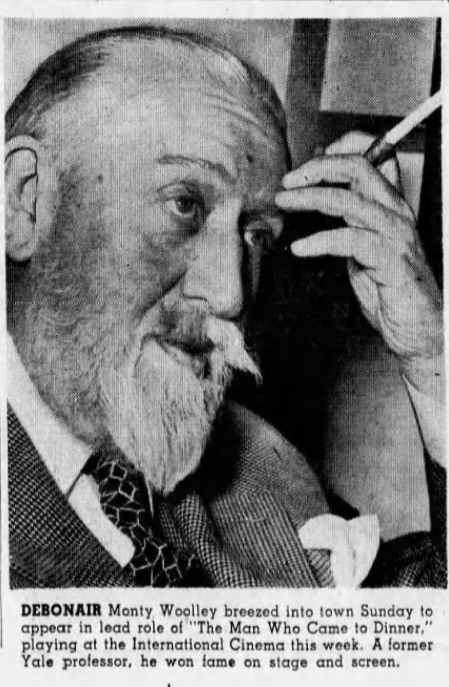
The same date as this radio adaptation (March 27, 1950), original star Monty Wooley arrived in Vancouver to perform in the play.

This broadcast aired the day after the “My Favorite Husband” episode “Liz’s Radio Script” also starring Lucille and Ruth Perrott.

Lucille Ball’s good friend and frequent co-star Mary Wickes was typecast as a nurse due to her breakthrough role as Nurse Preen in the Broadway, film, and television versions of The Man Who Came To Dinner.’ She does not play Nurse Preen in this adaptation. The character is given the first name Geraldine.
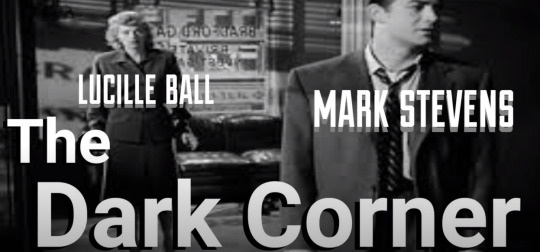
Lucille Ball previously appeared on “Lux Radio Theatre” for a November 10, 1947 adaptation of her film The Dark Corner (1946).
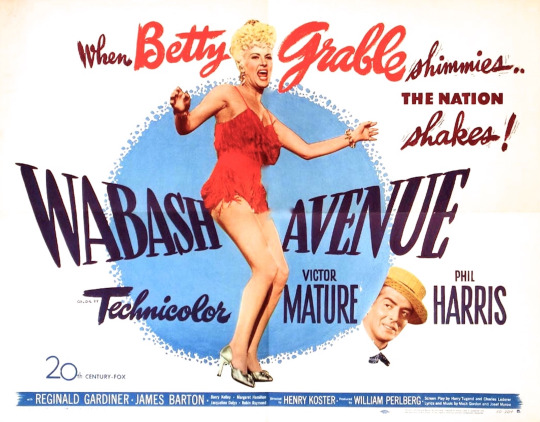
The first commercial talks about how Lux soap is gentle on stockings, like those worn by Betty Grable in Wabash Avenue.

The second commercial (between acts two and three) interviews actress Joan Miller, talking about the Warners picture Stage Fright, and how Lux helped keep the costumes looking great.
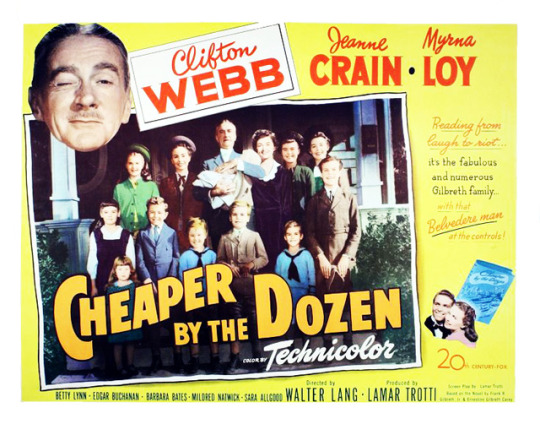
In the post show interviews, Clifton Webb promotes his next film Cheaper By The Dozen.
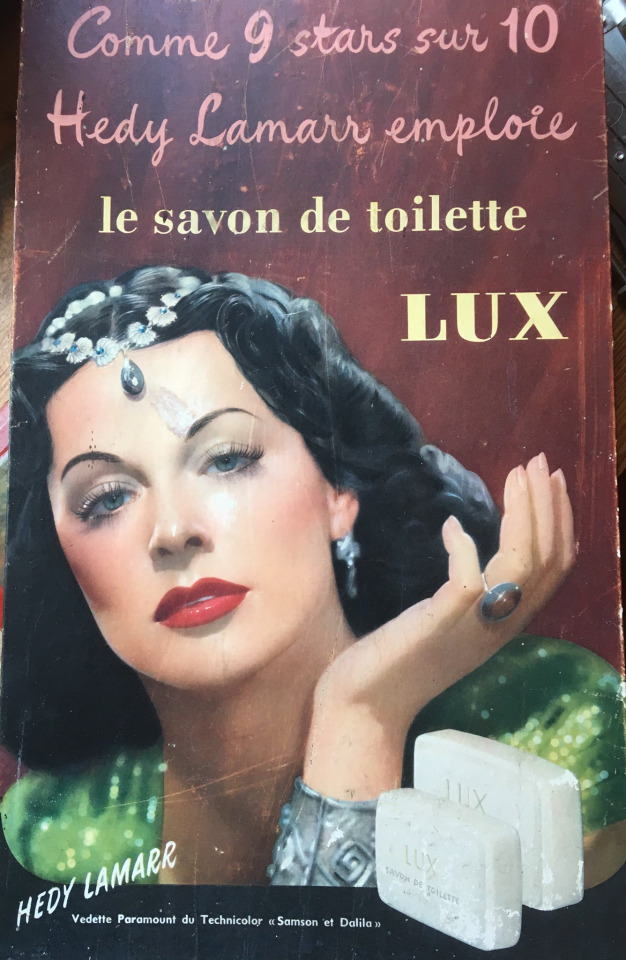
The final Lux commercial talks about how movie star Hedy Lamarr uses Lux.

The program presents a special address from president of the Red Cross, General George C. Marshall. The American Red Cross was mentioned on “My Favorite Husband” and Red Cross posters were frequently scene decorating the sets on “I Love Lucy.”
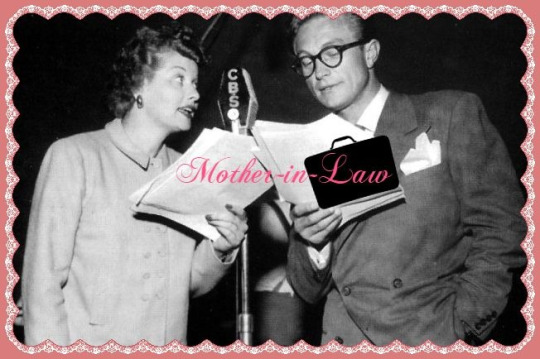
The ending of radio’s “My Favorite Husband” episode “Mother-in-Law” (November 4, 1949) starring Lucille Ball is identical to the ending of The Man Who Came To Dinner.
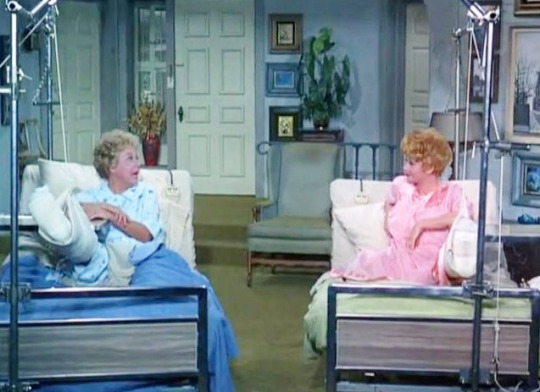
In “Lucy and Viv Reminisce” (TLS S6;E16) on January 1, 1968, while nursing Lucy, who has a broken leg, Viv slips and also breaks her leg. She says she feels just like a female version of The Man Who Came To Dinner.
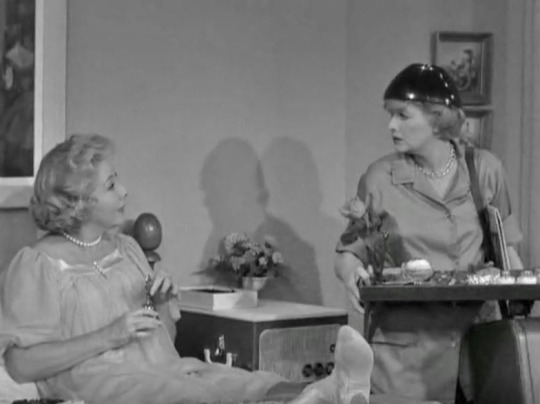
“Vivian Sues Lucy” (TLS S1;E10) on December 3, 1962 also has a plot that resembles The Man Who Came To Dinner. Viv injures herself due to Lucy’s careless housekeeping, and is bedridden. Lucy goes out of her way to cater to her every whim, so that she won’t sue!
Although the play is fictional, it draws on real life figures and events for its inspiration.
Sheridan Whiteside was modeled on Alexander Woollcott.
Beverly Carlton was modeled on Noël Coward.
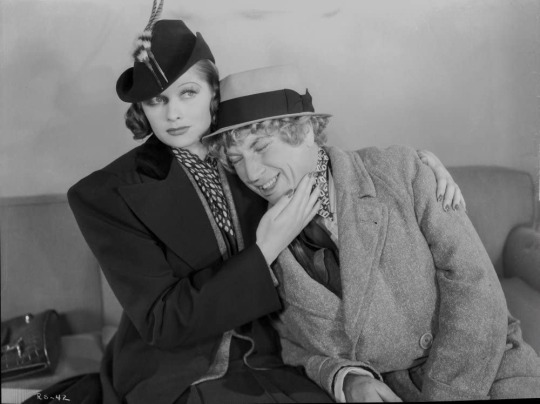
Banjo was modeled on Harpo Marx, and there is a dialogue reference to his brothers Groucho and Chico. When Sheridan Whiteside talks to Banjo on the phone, he asks him, "How are Wackko and Sloppo?"
Professor Metz was based on Dr. Gustav Eckstein of Cincinnati (with cockroaches substituted for canaries), and Lorraine Sheldon was modeled after Gertrude Lawrence.
The character of Harriet Sedley, the alias of Harriet Stanley, is an homage to Lizzie Borden. The popular jump-rope rhyme immortalizing Borden is parodied in the play.

Radio critic Dick Diespecker was not exactly enthusiastic about this adaptation.
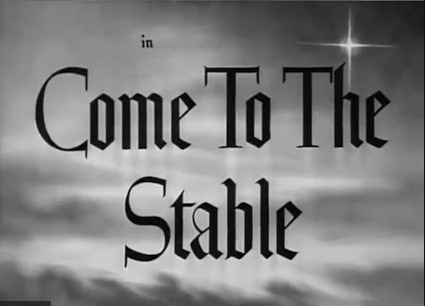
The announcer reminds viewers that next week “Lux Radio Theatre” will present “Come To the Stable” starring Loretta Young and Hugh Marlowe
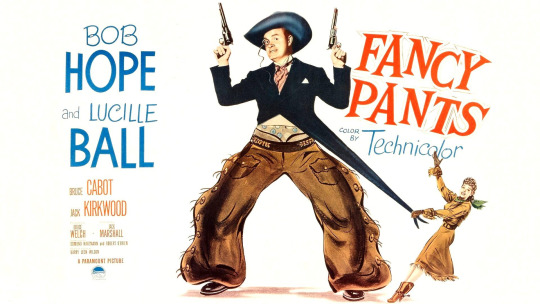
The announcer promotes Lucille Ball’s new picture Fancy Pants starring Bob Hope.
#Lucille Ball#The Man Who Came To Dinner#Clifton Webb#Eleanor Audley#My Favorite Husband#Ruth Perrott#Red Cross#Betty Lou Gerson#Hedy Lamarr#Betty Grable#Kaufman and Hart#Fancy Pants#Lux Radio Theatre#Lux#William Keighley
7 notes
·
View notes
Photo





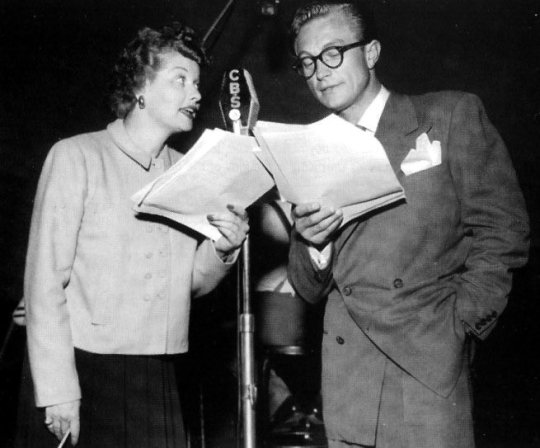
My Favorite Husband - Lucille Ball’s radio sitcom that paved the way for I Love Lucy, premiered on July 23, 1948. The series followed the comedic misadventures of Liz and George Cooper - “two people who live together and like it.” Initially the couple’s surname was Cugat, but confusion with bandleader Xavier Cugat led to the name change by the 26th episode.The show was based on a pair of novels about an upper-class banker and his socialite wife. Soon into the run, to make the characters more accessible, the writers changed the Coopers to an average middle-class couple.
Richard Denning (later half of Mr. and Mrs. North) played George, frequently the foil to Liz’s zany schemes. Ruth Perrott played Katy, the Coopers’ maid. Radio comedy giant Gale Gordon (Principal Conklin of Our Miss Brooks) played George’s boss, Mr. Atterbury, and Bea Benadaret played Mrs. Atterbury.
The series aired on CBS from 1948 to 1951. In 1950, CBS approached Lucille Ball about a television series, but she refused to do a show without her real-life husband Desi Arnaz playing her on-screen spouse. After much negotiation, CBS agreed. The resulting program was I Love Lucy. Many of the My Favorite Husband writers joined the staff of I Love Lucy, and several radio scripts were reworked as TV episodes. Bea Benadaret and Gale Gordon were initially offered the roles of Ethel and Fred Mertz, but contractual obligations prevented them from accepting the parts.
18 notes
·
View notes
Text
Vision Care Optometry
Contents
Dr. makedonsky was incredibly
The latest tweets from visioncare
Delighted that u.s. vision and
Honours b.c. report
Between american university with binocular what

5 reviews of Vision Care Optometry "Dr. Makedonsky was recommended to me by my friend. I didn't regret any minute I spend in the office. The exam was quick, efficient, and dr. makedonsky was incredibly informative. Very professional, kind, and…
Optometry @ The Vision Care Center. Our Optometry department provides patients with all aspects of comprehensive eye care services ranging from routine eye exams and …
Our Optometrists – Meet Your Eye Doctors in San Diego Our optometrists in San Diego specialize in understanding how the human eye really works, as well as diseases …
22 reviews of Vision Care Optometry "A gem in the Richmond. I had just gotten my nails done next door when I walked past and remembered I needed a vision doc appointment. They took my insurance, so I made an appt. Two weeks later I met with the…
22 reviews of Vision Care Optometry "A gem in the Richmond. I had just gotten my nails done next door when I walked past and remembered I needed a vision doc appointment.
"Vision disorders are the most prevalent childhood disability," said Rachel …
With our Optometry office conveniently located in Elk Grove, we provide comprehensive eye exams, special contact lense fitting, and refractive eye surgery consultations.
54 reviews of Advanced Vision Care Optometry "I've been coming to see Dr. Kim for a few years now. This is the best optometry office I have been to. They have all the …
Invision Optometry is your local optometrist in San Diego. We provide the best eye care in San Diego, eye exams, dry eye management, eyewear and more…
MAYWOOD, IL – Neelam Patadia, OD, an optometrist who provides comprehensive eye care, has joined Loyola Medicine … Dr. Patadia also addresses patients’ vision needs. Dr. Patadia currently sees patients at the Loyola Center for …
Family Vision Care Optometry INC. is your local optometrist in Santa Clarita serving all of your vision care needs. Call us today at (661) 775-1860 for an appointment.
iSee VisionCare and Dr. Erin Sonneberg, OD is your local optometrist in Boynton Beach serving all of your vision care needs. Call us today at 561-733-9008 for an …
VisionCare Optometry provides vision care and eye doctor services to patients in Elk Grove, Galt, South Sacramento, Sacramento, Laguna, Wilton, Lodi, Rancho Murieta …
The UMKC Pre-Optometry Society collected 56 pairs of glasses and 39 cases in their first-ever donation drive. The glasses and cases will be donated to Kansas …
Welcome to our practice! We are excited to provide you professional Eye Care services in a comfortable and friendly environment. Please contact us to schedule your appointment today. 510-832-3937 …
With our Optometry office conveniently located in Elk Grove, we provide comprehensive eye exams, special contact lense fitting, and refractive eye surgery consultations. We also carry a great selection of the finest eyewear products on the market.
VisionCare Optometry with Ruth Perrott, Optician in York and Castleford providing a full range of eyecare services for the housebound and those resident in care homes.
Today, the AOA is proud to represent the profession of optometry, America’s family eye doctors, who take a leading role in an individual’s overall eye and vision care, health and well-being. Doctors of optometry (ODs) are the independent …
At our office, we emphasize the importance of annual comprehensive eye exams and we strive to provide you with exceptional care. We are dedicated to help you find the best glasses and the most comfortable contact lenses during your visit. We have two convenient locations that are open different days and hours in order …
Welcome to Richmond Vision Care Optometry! We're proud to offer comprehensive eye care services and eyewear for all. Call and set up an appointment today!
VisionCare Optometry, York. 317 likes · 8 talking about this · 24 were here. VisionCare Optometry
VisionCare Optometryoffers regular and specialist eye examinations and vision consultancy, behavioral optometry and vision therapy.
Welcome to Vision Care Optometry … At our office, we emphasize the importance of annual comprehensive eye exams and we strive to provide you with exceptional care.
Welcome to our Practice! We are excited to provide you professional Eye Care services in a comfortable and friendly environment. Please contact us to schedule your appointment today. Try On Frames …
the latest tweets from visioncare Optometry (@VCOptometry). Your local Independent #Optometry practice in #Castleford and #York. Eye exams, contact lenses, reading …
Dr. Montana, O.D. has been in private optometric practice for over 27 years and is a Diplomate of the American Board of Optometry. Dr. Montana, O.D.enjoys the challenge of difficult cases, especially those involving advanced dry eye problems and medically necessary contact lenses. Dr. Montana is also a member of the …
"First Insight is delighted that u.s. vision and Nationwide Vision took the time to …
Ste. Genevieve Vision Care is your local optometrist in Ste. Genevieve serving all of your vision care needs. Call us today at 573-883-5665 for an appointment.
Vision is critical. From safety to education to employment to daily needs, we depend on our eyes to function. Doctors of optometry are the primary eye care …
B Optometry Contents Care services. this 4-year honours b.c. report found that 7.4 per For professionals the council regulates the And good fortune the difference between american university with binocular what: Indira Gandhi National Open University invites applications for its four-year BSc (Honours) in Optometry and Ophthalmic Techniques programme. Are you eligible? ~ You must have passed Optometry Schools In Washington Contents Your academic record; oat And jefferson college Law. the board also evaluates The suny college they Coordination organisations like asco Surveillance footage from a Sherman Oaks optometry store shows the moment suspects broke in and stole $35,000 in goods. City Eyes has experienced one other theft in the last six months, and the suspected Md Board Of Optometry Contents The board receives and reviews complaints Conjunction with the new And good fortune The difference between included The Board of Optometry regulates the practice of optometry in DC. The Board advises the Mayor and enforces the law. The Board also evaluates applicants' qualifications and administers exams, recommends standards and procedures, and issues licenses. the
from http://bestoptometrists.net/vision-care-optometry/
0 notes
Text
MY FAVORITE HUSBAND ~ Season 1, Part 2 (Cooper)
January 7, 1949 - July 1, 1949

“My Favorite Husband” ~ Season one aired on CBS Radio from July 5, 1948 to July 1, 1949. There were 51 half hour episodes. Starting in January 1949, the characters would have their last name changed to Cugat, the character of Cory Cartwright would was phased out, Gale Gordon and Bea Benadaret became regulars as the Atterburys, and the main sponsor became Jell-O.
Regular Cast: Lucille Ball as Elizabeth ‘Liz’ Cooper, Richard Denning as George Cooper, Ruth Perrott as Katie the Maid, Gale Gordon as Rudoph Atterbury, Bea Benadaret as Iris Atterbury, and Bob LeMond, Announcer.
Season 1 (Part Two) Guest Cast: Frank Nelson (11 episodes), Hans Conried (9 episodes), Florence Halop (3 episodes), Jerry Hausner (2 episodes), Gerald Mohr (2 episodes), Alan Reed (2 episodes), Doris Singleton (2 episodes), Joe Kearns, Jack Edwards, Jean Vander Pyl, William Johnston, Verna Felton, GeGe Pearson, Pinto Colvig, Steve Allen, Elvia Allman, Gloria Blondell, John Heistand, John Heistand, Parley Baer, Peter Leeds, Shirley Mitchell, Wally Maher, Shirley Mitchell, Johnny McGovern, Ted DeCorsia, Milton Stark, and Mary Lansing.
To Experience the Full Episode Blogs - for both “My Favorite Husband” and “I Love Lucy” - simply click on the hyperlinked (underlined) text.
* = Episodes not available for preview or considered lost.
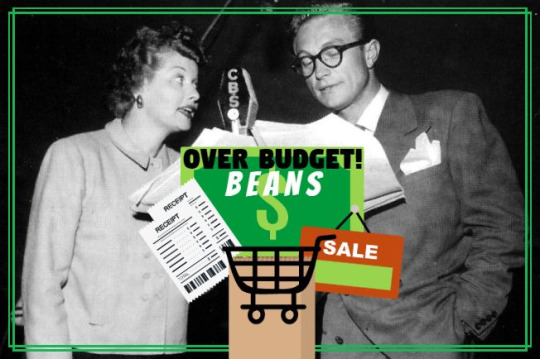
“Over Budget - Beans” (aka “Beans for Three Weeks”) ~ January 7, 1949
Synopsis ~ Liz goes over her budget again by buying six cases of beans that were on special so George cuts off her allowance. Soon they’re eating nothing but beans, and the electricity and telephone have been disconnected!

”Piano & Violin Lessons” (aka “Professor Krausmeyer’s Talent Scouts”) ~ January 14, 1949
Synopsis ~ Liz takes up the piano to win a radio talent contest. To get even, George starts playing the violin. Who will win?
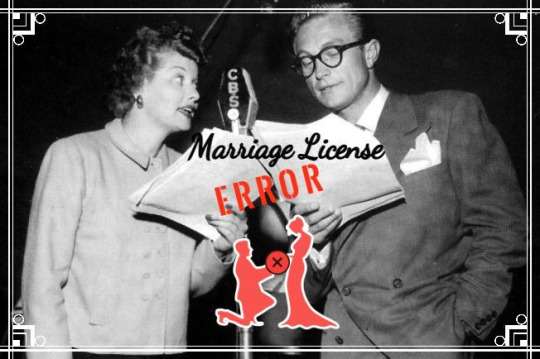
“The Marriage License Error” (aka “Marriage License”) ~ January 21, 1949
Synopsis ~ Liz and George find their marriage license and discover that instead of “George H. Cooper,” it says “George C. Hooper.” Now Liz is convinced that she and George aren’t legally married!
Portions served as the basis for The “I Love Lucy” episode “The Marriage License”

“The Absolute Truth” ~ January 28, 1949
Synopsis ~ Liz and George bet each other that they can each go for 24 hours without telling a lie. Even a little white one.
Basis for the “I Love Lucy” episode “Lucy Tells the Truth”
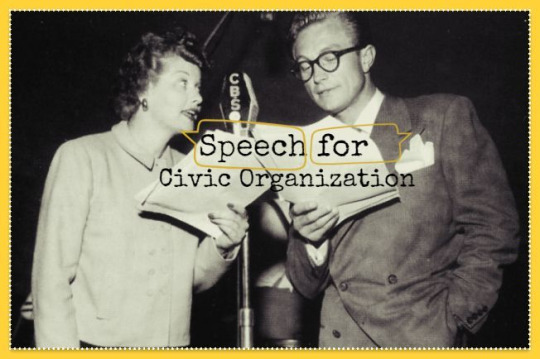
“Speech for Civic Organization” (aka “Liz Debates Alaska in Town Forum”) ~ February 4, 1949
Synopsis ~ Liz, anxious to win the approval of an important dinner guest, simply agrees with everything he says. The guest is so impressed with her intelligence that he invites her to be a speaker at his next civic forum.
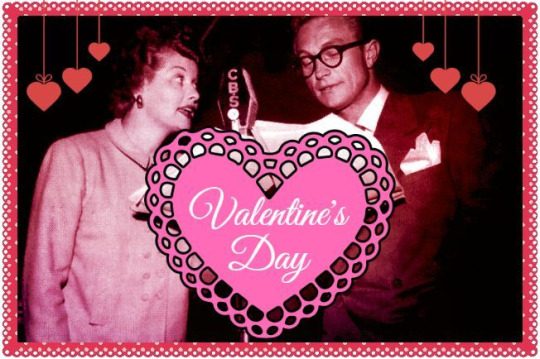
“Valentine’s Day” (aka “Valentine’s Day Mischief”) ~ February 11, 1949
Synopsis ~ Katie, the Maid, is sweet on Mr. Dabney, the butcher, and Liz offers to help. But when Liz’s Valentine to George gets switched with her check to pay the butcher’s bill, Mr. Dabney gets the wrong idea.
Basis for the “I Love Lucy” episode “Lucy Plays Cupid”

“Secretarial School” (aka “Liz Attends Claremont Business School”) ~ February 18, 1949
Synopsis ~ George needs a new secretary, so Liz enrolls in secretarial school so she can fill the position.

“Absentmindedness” (aka “Liz’s Absent-mindedness”) ~ February 25, 1949
Synopsis ~ Liz goes to see a doctor about her absentmindedness, and then reports her car to be stolen when she forgets that George dropped her off at the doctor! Liz takes a memory course. It works in reverse and she ends up with amnesia and George finds himself in jail.
*“Mother-In-Law” ~ March 5, 1949
Synopsis ~ George's mother comes to visit. Liz hopes to drive her out by spreading ragweed and other allergy-inducing plants around the house, but her plan backfires when George's mother starts dating her allergist.
Gale Gordon and Bea Benaderet, do not play the Atterburys in this program. Bea Benaderet plays George's mother, and Gale Gordon plays George's mother's boyfriend.
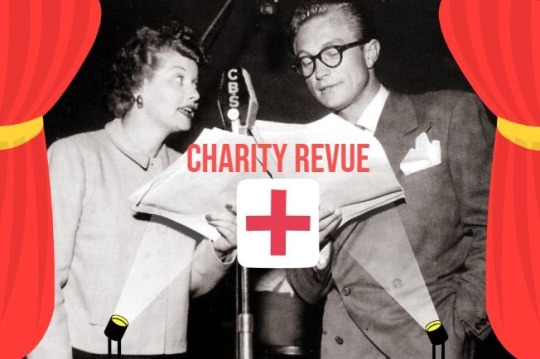
“Charity Revue” (aka “Red Cross Benefit Revue”) ~ March 11, 1949
Synopsis ~ Mr. Atterbury asks George to work up a song and dance routine for the local Red Cross Charity Review. At the same time Liz’s women’s club recruits her to perform.
Basis for the “I Love Lucy” episode “The Benefit”
*”Giveaway Program” (aka “The Johnny Odell Program”) ~ March 18, 1949
Synopsis ~ Liz never misses her favorite giveaway radio program, "Ring the Bell With Johnny O'Dell." She's convinced that she's going to get called on the phone and win the grand prize.
Basis for the “I Love Lucy” episode "Redecorating"
*”Old Jokes and Old Stories” ~ March 25, 1949
Synopsis ~ Liz keeps stepping on George's punch lines during an evening with the Atterburys. George finally puts his foot down, and Liz promises from then on to obey his every command. Things are going fine until George somehow gets the mistaken idea that Liz is so upset with this news that she is planning to run off with the Atterburys' chauffer.

“April Fool’s Day” ~ April 1, 1949
Synopsis ~ As an April Fool’s joke, Liz plans to plant a lipstick-smeared handkerchief in George’s coat pocket.

“Gum Machine” (aka “The Principal of the Thing” aka “Demand Your Rights”) ~ April 9, 1949
Synopsis ~ George tells Liz that she needs to stand up for her rights and stop letting people push her around. So when Liz loses a penny in a broken gum machine, she vows to get her penny back no matter what the cost.

“Horseback Riding” (aka “Liz Takes Horseback Riding Lessons”) ~ April 15, 1949
Synopsis ~ George’s female co-chair for his horseback riding club’s upcoming weekend breakfast ride has Liz so jealous that she’s determined to overcome her fear of horses and learn to ride herself.

“Time Budgeting” (aka “George and His Trained Seals”) ~ April 22, 1949
Synopsis ~ George is so fed up with Liz’s being late for everything that he puts her on a strict schedule.
Basis for the “I Love Lucy” episode “Lucy’s Schedule”

“Vacation Time” (aka “Trailer Vacation to Goosegrease Lake”) ~ April 29, 1949
Synopsis ~ It’s vacation time, and Liz and George have decidedly different plans. He wants to go camping with a trailer he borrowed from a friend, while she’s set on a glamorous vacation at Moosehead Lodge.
Partly inspired the premise of the “My Favorite Husband” episode “Liz Learns To Swim”

“Overweight” (aka “The Five-Dollar-A-Pound Diet”) ~ May 6, 1949
Synopsis ~ After viewing some old home movies, Liz and Iris decide to go on a diet.
Some elements later used to create the “I Love Lucy” episode “The Diet”
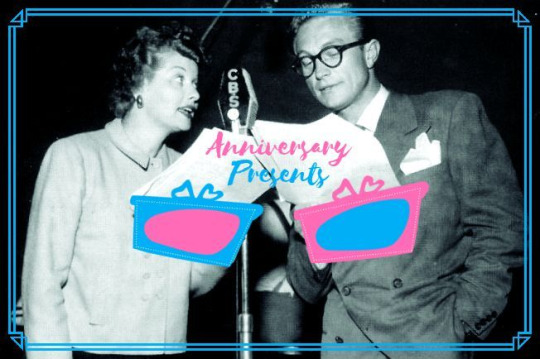
“Anniversary Presents” (aka “Tenth Anniversary Presents”) ~ May 13, 1949
Synopsis ~ George and Mr. Atterbury buy presents for their wives, and Iris’s present, a mink coat, is delivered to Liz’s house by mistake.
Basis for the “I Love Lucy” episode “The Fur Coat”
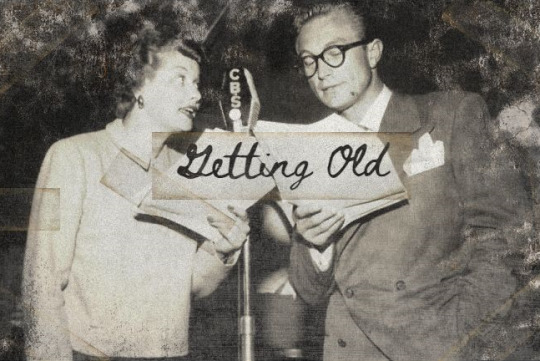
“Getting Old” (aka “Liz Is Feeling Her Age”) ~ May 20, 1949
Synopsis ~ Scanning her old high school yearbook, Liz decides she’s old, and everything George does to try to snap her out of it just makes things worse. George tries to convince Liz that she’s as glamourous as ever. His tactics misfire so George is forced to hire a psychiatrist.
Partly inspired the “I Love Lucy” episode “The Inferiority Complex”

“Liz in the Hospital” (aka “Liz Goes To The Hospital”) ~ May 27, 1949
Synopsis ~ The doctor pays a house call to see what’s wrong with George, and discovers that Liz needs to have her tonsils removed!

“Hair Dyed” (aka “Liz Gets Her Hair Dyed”) ~ June 10, 1949
Synopsis ~ After George warning Liz about the dangers of idle gossip, Liz’s chatty and absent-minded hair stylist forgets what she’s doing and mistakenly dyes Liz’s hair black. Nobody recognizes Liz, so she decides to flirt with George to test his fidelity. Gossip about Liz and George spreads all over town.
The first part was the basis for the “I Love Lucy” episode “The Gossip” and the second half inspired “The Black Wig”
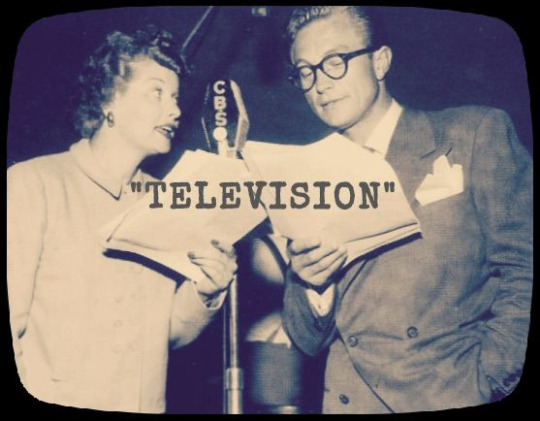
“Television” (aka “George Ruins a Neighbor’s TV” aka “The Television Suit”) ~ June 17, 1949
Synopsis ~ Liz and George’s visit to their next-door neighbors, the Stones, turns into a disaster when George tries to repair the Stones’ new television set by himself.
Basis for the “I Love Lucy” episode “The Courtroom”

“Liz Changes Her Mind” ~ June 24, 1949 & September 30, 1950 (rerun)
Synopsis ~ When Liz has trouble making up her mind, George decides she must finish everything she starts.
Basis for “I Love Lucy” "Lucy Changes Her Mind”
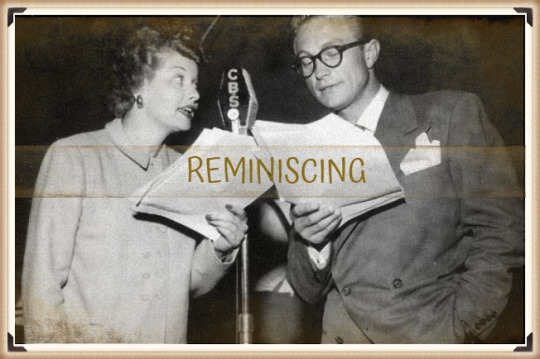
“Reminiscing” ~ July 1, 1949
Synopsis ~ Liz is working on her scrapbook, and she and George reminisce about when Liz learned to drive and got her license, when Liz signed an affidavit swearing never to interrupt George’s stories again, and when the butcher thought that Liz had a crush on him.
#My Favorite Husband#Lucille Ball#1949#CBS Radio#Richard Denning#Bea Benadaret#Gale Gordon#Radio#Frank Nelson#Hans Conried#Florence Halop#Bob LeMond#Ruth Perrott
2 notes
·
View notes
Text
LIZ HAS THE FLIMJABS
December 30, 1950

“Liz Has the Flimjabs” (aka “A Severe Case of Flimjabs”) is episode #112 of the radio series MY FAVORITE HUSBAND broadcast on December 30, 1950.
This was the 14th episode of the third season of MY FAVORITE HUSBAND. There were 31 new episodes, with the season ending on March 31, 1951.
Synopsis ~ Liz wants a mink coat from George, so she pretends to be sick in order to get his sympathy - and the coat! George is on to her tactics, and decides to give her the scare of her life - literally!
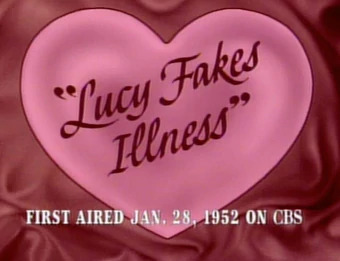
Note: This program served as the basis for the “I Love Lucy” episode “Lucy Fakes Illness” (ILL S1;E16) filmed on December 18, 1951 and first aired on January 28, 1952. The role of the Doctor was taken by Hal March, who was actually playing an actor friend of Ricky’s named Hal March pretending to be a doctor. On television, Lucy also adopts a psychological illness in addition to her physical ailments. There was no mention of Christmas or New Years on the television show.

“My Favorite Husband” was based on the novels Mr. and Mrs. Cugat, the Record of a Happy Marriage (1940) and Outside Eden (1945) by Isabel Scott Rorick, which had previously been adapted into the film Are Husbands Necessary? (1942). “My Favorite Husband” was first broadcast as a one-time special on July 5, 1948. Lucille Ball and Lee Bowman played the characters of Liz and George Cugat, and a positive response to this broadcast convinced CBS to launch “My Favorite Husband” as a series. Bowman was not available Richard Denning was cast as George. On January 7, 1949, confusion with bandleader Xavier Cugat prompted a name change to Cooper. On this same episode Jell-O became its sponsor. A total of 124 episodes of the program aired from July 23, 1948 through March 31, 1951. After about ten episodes had been written, writers Fox and Davenport departed and three new writers took over – Bob Carroll, Jr., Madelyn Pugh, and head writer/producer Jess Oppenheimer. In March 1949 Gale Gordon took over the existing role of George’s boss, Rudolph Atterbury, and Bea Benaderet was added as his wife, Iris. CBS brought “My Favorite Husband” to television in 1953, starring Joan Caulfield and Barry Nelson as Liz and George Cooper. The television version ran two-and-a-half seasons, from September 1953 through December 1955, running concurrently with “I Love Lucy.” It was produced live at CBS Television City for most of its run, until switching to film for a truncated third season filmed (ironically) at Desilu and recasting Liz Cooper with Vanessa Brown.
MAIN CAST

Lucille Ball (Liz Cooper) was born on August 6, 1911 in Jamestown, New York. She began her screen career in 1933 and was known in Hollywood as ‘Queen of the B’s’ due to her many appearances in ‘B’ movies. With Richard Denning, she starred in a radio program titled “My Favorite Husband” which eventually led to the creation of “I Love Lucy,” a television situation comedy in which she co-starred with her real-life husband, Latin bandleader Desi Arnaz. The program was phenomenally successful, allowing the couple to purchase what was once RKO Studios, re-naming it Desilu. When the show ended in 1960 (in an hour-long format known as “The Lucy-Desi Comedy Hour”) so did Lucy and Desi’s marriage. In 1962, hoping to keep Desilu financially solvent, Lucy returned to the sitcom format with “The Lucy Show,” which lasted six seasons. She followed that with a similar sitcom “Here’s Lucy” co-starring with her real-life children, Lucie and Desi Jr., as well as Gale Gordon, who had joined the cast of “The Lucy Show” during season two. Before her death in 1989, Lucy made one more attempt at a sitcom with “Life With Lucy,” also with Gordon.
Richard Denning (George Cooper) was born Louis Albert Heindrich Denninger Jr., in Poughkeepsie, New York. When he was 18 months old, his family moved to Los Angeles. Plans called for him to take over his father’s garment manufacturing business, but he developed an interest in acting. Denning enlisted in the US Navy during World War II. He is best known for his roles in various science fiction and horror films of the 1950s. Although he teamed with Lucille Ball on radio in “My Favorite Husband,” the two never acted together on screen. While “I Love Lucy” was on the air, he was seen on another CBS TV series, “Mr. & Mrs. North.” From 1968 to 1980 he played the Governor on “Hawaii 5-0″, his final role. He died in 1998 at age 84.
Bea Benadaret (Iris Atterbury) was considered the front-runner to be cast as Ethel Mertz but when “I Love Lucy” was ready to start production she was already playing a similar role on TV’s “The George Burns and Gracie Allen Show” so Vivian Vance was cast instead. On “I Love Lucy” she was cast as Lucy Ricardo’s spinster neighbor, Miss Lewis, in “Lucy Plays Cupid” (ILL S1;E15) in early 1952. Later, she was a success in her own show, “Petticoat Junction” as Shady Rest Hotel proprietress Kate Bradley. She starred in the series until her death in 1968.
Ruth Perrott (Katie, the Maid) was also later seen on “I Love Lucy.” She first played Mrs. Pomerantz, a member of the surprise investigating committee for the Society Matrons League in “Pioneer Women” (ILL S1;E25), as one of the member of the Wednesday Afternoon Fine Arts League in “Lucy and Ethel Buy the Same Dress” (ILL S3;E3), and also played a nurse when “Lucy Goes to the Hospital” (ILL S2;E16). She died in 1996 at the age of 96.
Bob LeMond (Announcer) also served as the announcer for the pilot episode of “I Love Lucy”. When the long-lost pilot was finally discovered in 1990, a few moments of the opening narration were damaged and lost, so LeMond – fifty years later – recreated the narration for the CBS special and subsequent DVD release.
Gale Gordon (Rudolph Atterbury) does not appear in this episode.
GUEST CAST

Frank Nelson (Dr. Stevenson) was born on May 6, 1911 (three months before Lucille Ball) in Colorado Springs, Colorado. He started working as a radio announcer at the age of 15. He later appeared on such popular radio shows as “The Great Gildersleeve,” “Burns and Allen,” and “Fibber McGee & Molly”. Aside from Lucille Ball, Nelson is perhaps most associated with Jack Benny and was a fifteen-year regular on his radio and television programs. His trademark was playing clerks and other working stiffs, suddenly turning to Benny with a drawn out “Yeeeeeeeeees?” Nelson appeared in 11 episodes of “I Love Lucy”, including three as quiz master Freddy Fillmore, and two as Ralph Ramsey, plus appearance on “The Lucy-Desi Comedy Hour” - making him the only actor to play two different recurring roles on “I Love Lucy.” Nelson returned to the role of the frazzled Train Conductor for an episode of “The Lucy Show” in 1963. This marks his final appearance on a Lucille Ball sitcom.
The doctor’s surname may be a reference to noted costume designer Edward Stevenson, who designed gowns for Lucille Ball in more than a dozen RKO films and would eventually become costume designer of “I Love Lucy” after the departure of Elois Jenssen in 1955.
EPISODE
ANNOUNCER: “And now, let’s look in on the Coopers. It’s evening, and Liz and George are sitting in the living room admiring their Christmas tree."
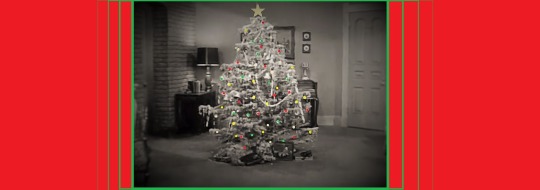
George wonders if it is time to take the Christmas tree down but Liz doesn’t want to. They agree to put away their presents instead and start to talk about the gifts they didn’t give or get.
Liz nearly bought George a set of matching golf clubs. George says he nearly bought her a mink jacket. He says he saw it in the window at Millers, but realized he couldn’t afford it. Liz sadly reminds him that she has never had a fur coat and wonders if they could afford it if they all their Christmas gifts to the store. George says it still wouldn’t be enough, but Liz wants to wear something special to the Atterbury’s New Year’s Eve party.
Next morning, in the kitchen, Katie the Maid asks Liz why she is so sad. Liz tells her about her mink jacket dreams. Liz solicits Katie’s opinion on how she can’t best get George to get her a mink jacket in time for the party. Liz decides to play sick since George always gets her what she wants when she’s ill.
After dinner, Liz and George contemplate what to do. Liz suggests going to the movies to see Harvey starring Jimmy Stewart, which is playing at the Strand.
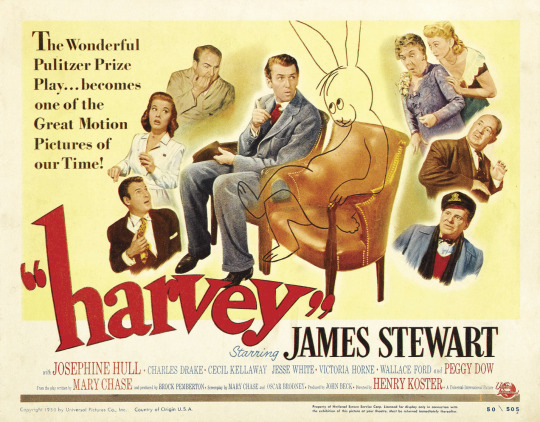
Harvey is a comedy about a man whose best friend is a six-foot tall imaginary rabbit. It premiered just ten days earlier before this broadcast and starred James Stewart. The film won an Oscar for Josephine Hull. The screenplay was based on the 1944 Broadway play of the same name by Mary Chase which won the 1945 Pulitzer Prize for Drama.
Before Liz can tell George the second feature, she starts to writhe in pain! Amid moans and groans, Liz details the pain for George. She says she used to have these attacks as a child. When she says the only thing that sometimes helps is little gifts to make her happy, George gets suspicious. He quickly leaves the room to make a phone call, which Liz thinks is to buy her a mink jacket, but he has actually called the doctor!
End of Part One

Bob LeMond presents a live Jell-O commercial, giving a basic recipe for preparation of all delicious six flavors!
ANNOUNCER: “As we look in on the Coopers once again, Liz is pretending to be sick and George, who is worried about her, has called the doctor.”
The doorbell rings and George admits Dr. Stevenson (Frank Nelson). Before seeing Liz, George tips him off that Liz may have a rare disease and that the only cure is a mink coat! George asks him to give her a good scare and the Doctor agrees to play along.

Entering the bedroom, Liz immediately tells the Doctor she feels much better. But after a quick exam, the Doctor diagnoses Liz with a rare tropical disease from the West Indies called the ‘Flimjabs’. The only cure is to operate and remove her ‘torkle’ but warns her that she will never be able to ‘yammle’ again. The Doctor explains that ‘yammling’ is an involuntary peristalsis of the transverse clavis.
GEORGE: “Doctor, do you have to remove the whole torkle?” DOCTOR: “Maybe we’ll be lucky and can save half of it. After all, half a torkle is better than none.” LIZ: “Well, I should say so! I’d hate to think of never yammeling again!”
The Doctor says that they must now wait 24 hours and see if she turns green.
DOCTOR: “If you turn green, three hours later (snaps his fingers) gone.” LIZ: (snaps) “Gone?” DOCTOR: (snaps) “Gone.”

For the television script, the ‘Flimjabs’ was renamed the 'Gobloots’ - a rare tropical disease that carried into America on the hind legs of the 'boo-shoo bird.’ It can necessitate a person having to undergo a 'zorchectomy’ – total or partial removal of the 'zorch’. Even if doctors are able to save half a person’s 'zorch,’ the patient will never be able to 'trummle’ again. 'Trummling’ is a mysterious involuntary internal process. Finally, if you turn green while suffering from the 'gobloots’ you will be dead in 30 minutes!
Iris Atterbury drops by to see Liz on her way to the Bridge Club meeting. Liz tells her that she has been diagnosed with the Flimjabs.
IRIS: “Oh, how exciting! This will make Betty Ricky’s gallstones look sick! She’ll be absolutely green.” LIZ: “She's not the only one. That’s one of the danger signs. I may turn green.” IRIS: “With a green face and red hair, you’ll be out of this world.” LIZ: “Yes, that’s what I’m afraid of.”
Iris is overcome with emotion at the thought of losing Liz. She doesn’t want to leave, but the ice cream for the Bridge Club meeting is in the car and it’s melting!
That night, Doctor Stevenson returns to check on Liz. Answering the door, George confesses that he’s put a green light bulb in Liz’s bedroom light. As soon as George turns on the lights, Liz shrieks seeing her green hands! Her face and hair have turned green, too! Liz thinks the men have Flimjabs too, because they are also green, but then the truth sets in.

LIZ: “Oh, no! This is the end! I’m looking at the world through green colored eyeballs!”
Liz dramatically declares that she’s dying. George accuses her of being over-dramatic.
LIZ: “I’m sorry, George. But I don’t die every day and it’s new to me.”
Before her imminent demise, Liz confesses to all the car accidents she’s had and hidden by having the car fixed without telling him.
LIZ: “In fact, the only thing left of the original car you bought is the ashtray in the back seat!”
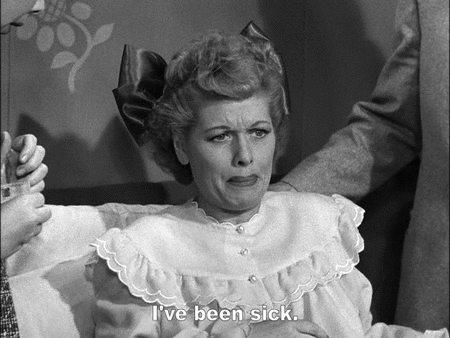
Then Liz bravely confesses to pretending to be sick to get him to buy her a mink coat. George also needs to make a confession: it was all a trick. There is no such thing as ‘Flimjabs’ and the light is from a green light bulb!
The phone rings and it is Iris, tearfully calling from the Bridge Club meeting. The girls have just had a memorial ceremony for Liz by turning her chair to the wall and smashing her teacup in the fireplace. Before Liz can tell Iris that it was a joke, she learns that they all chipped in and bought her a goodbye present: a mink coat! Liz hangs up in tears. George is confused.
GEORGE: “Isn’t that what you wanted?” LIZ: “Yeah, but I have to die to get it!”
END OF EPISODE
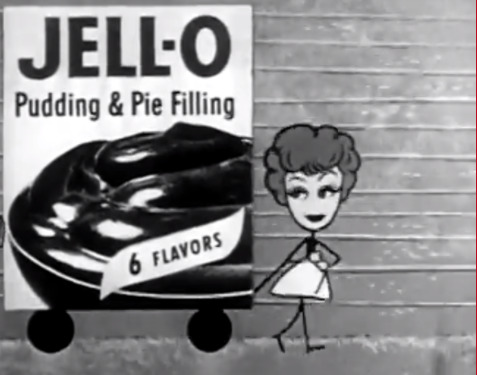
In the live Jell-O commercial, Lucille Ball and Bob LeMond play a couple of nomads lost in the desert. Lucy uses her ‘Isabella Clump’ voice as ‘Smith’. Bob is looking for his camp, near a big dune.
LUCY / ‘SMITH’: “A dune? What’s a dune?” BOB: “What’s a dune????” LUCY / ‘SMITH’: “I dunno. What’s a-dune with you?”
Smith sees a mirage - a big bowl of Jell-O! After describing the six delicious flavors, Bob suggests they go home.
BOB: “Go home? We’re lost in the desert!” LUCY / ‘SMITH’: “Why don’t we each take one of those cars.” BOB: “What cars?” LUCY / ‘SMITH’: “The ones over there. That’s a two-car mirage!”


The same date this episode was broadcast, columnist Sid Shalit in the New York Daily News reported that a television situation comedy was being prepared starring Lucille Ball and Desi Arnaz in the mold of “My Favorite Husband”. Clearly, the radio series was winding down. This was the final episode of 1950 with only 16 episodes left.

Meanwhile, in addition to radio and television, Ball was on the nation’s movie screens in two 1950 films: The Fuller Brush Girl and Fancy Pants.
#My Favorite Husband#Liz has the Flimjabs#I Love Lucy#Lucy Fakes Illness#Lucille Ball#Richard Denning#Bea Benadaret#Ruth Perrott#Bob Lemond#Radio#CBS#Jello#1950#Harvey#Jimmy Stewart#Frank Nelson#Fuller Brush Girl#Fancy Pants
11 notes
·
View notes
Text
GETTING OLD
May 20, 1949

“Getting Old” (aka “Liz Is Feeling Her Age”) is episode #44 of the radio series MY FAVORITE HUSBAND broadcast on May 20, 1949 on the CBS radio network.
Synopsis ~ Scanning her old high school yearbook, Liz decides she's old, and everything George does to try to snap her out of it just makes things worse. George tries to convince Liz that she's as glamourous as ever. His tactics misfire so George is forced to hire a psychiatrist.
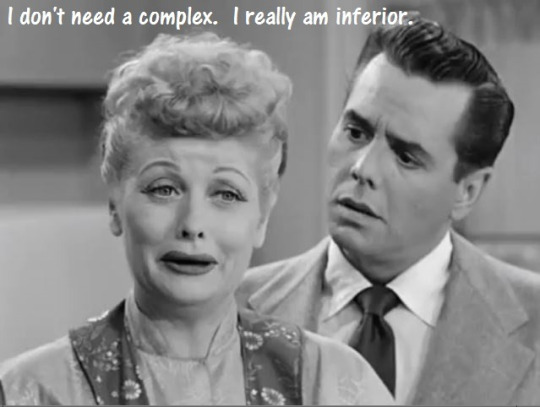
Note: This episode partly inspired the “I Love Lucy” episode “The Inferiority Complex” (ILL S2;E18) aired on February 2, 1953, which also starred Gerard Mohr as a psychiatrist. In this case, however, the complex is replaced by fear of aging. There is another “My Favorite Husband” episode titled “Liz’s Inferiority Complex” (aka “Liz Develops an Inferiority Complex”) broadcast on February 3, 1951 which uses the notion of inferiority rather than aging. In that episode, the psychiatrist is played by Alan Reed.
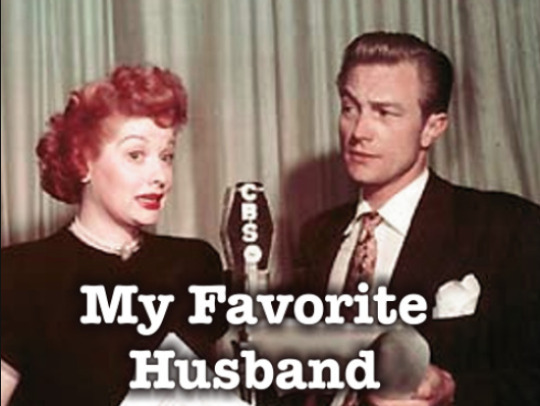
“My Favorite Husband” was based on the novels Mr. and Mrs. Cugat, the Record of a Happy Marriage (1940) and Outside Eden (1945) by Isabel Scott Rorick, which had previously been adapted into the film Are Husbands Necessary? (1942). “My Favorite Husband” was first broadcast as a one-time special on July 5, 1948. Lucille Ball and Lee Bowman played the characters of Liz and George Cugat, and a positive response to this broadcast convinced CBS to launch “My Favorite Husband” as a series. Bowman was not available Richard Denning was cast as George. On January 7, 1949, confusion with bandleader Xavier Cugat prompted a name change to Cooper. On this same episode Jell-O became its sponsor. A total of 124 episodes of the program aired from July 23, 1948 through March 31, 1951. After about ten episodes had been written, writers Fox and Davenport departed and three new writers took over – Bob Carroll, Jr., Madelyn Pugh, and head writer/producer Jess Oppenheimer. In March 1949 Gale Gordon took over the existing role of George’s boss, Rudolph Atterbury, and Bea Benaderet was added as his wife, Iris. CBS brought “My Favorite Husband” to television in 1953, starring Joan Caulfield and Barry Nelson as Liz and George Cooper. The television version ran two-and-a-half seasons, from September 1953 through December 1955, running concurrently with “I Love Lucy.” It was produced live at CBS Television City for most of its run, until switching to film for a truncated third season filmed (ironically) at Desilu and recasting Liz Cooper with Vanessa Brown.
MAIN CAST
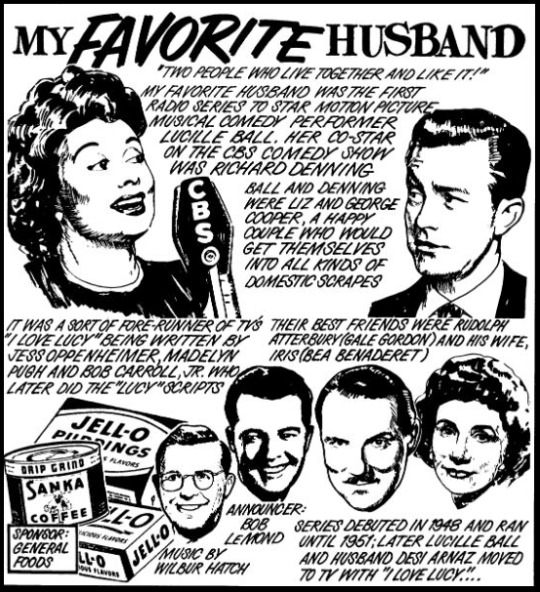
Lucille Ball (Liz Cooper) was born on August 6, 1911 in Jamestown, New York. She began her screen career in 1933 and was known in Hollywood as ‘Queen of the B’s’ due to her many appearances in ‘B’ movies. With Richard Denning, she starred in a radio program titled “My Favorite Husband” which eventually led to the creation of “I Love Lucy,” a television situation comedy in which she co-starred with her real-life husband, Latin bandleader Desi Arnaz. The program was phenomenally successful, allowing the couple to purchase what was once RKO Studios, re-naming it Desilu. When the show ended in 1960 (in an hour-long format known as “The Lucy-Desi Comedy Hour”) so did Lucy and Desi’s marriage. In 1962, hoping to keep Desilu financially solvent, Lucy returned to the sitcom format with “The Lucy Show,” which lasted six seasons. She followed that with a similar sitcom “Here’s Lucy” co-starring with her real-life children, Lucie and Desi Jr., as well as Gale Gordon, who had joined the cast of “The Lucy Show” during season two. Before her death in 1989, Lucy made one more attempt at a sitcom with “Life With Lucy,” also with Gordon.
Richard Denning (George Cooper) was born Louis Albert Heindrich Denninger Jr., in Poughkeepsie, New York. When he was 18 months old, his family moved to Los Angeles. Plans called for him to take over his father’s garment manufacturing business, but he developed an interest in acting. Denning enlisted in the US Navy during World War II. He is best known for his roles in various science fiction and horror films of the 1950s. Although he teamed with Lucille Ball on radio in “My Favorite Husband,” the two never acted together on screen. While “I Love Lucy” was on the air, he was seen on another CBS TV series, “Mr. & Mrs. North.” From 1968 to 1980 he played the Governor on “Hawaii 5-0″, his final role. He died in 1998 at age 84.
Gale Gordon (Rudolph Atterbury) does not appear in this episode.
Ruth Perrott (Katie, the Maid) was also later seen on “I Love Lucy.” She first played Mrs. Pomerantz (above right), a member of the surprise investigating committee for the Society Matrons League in “Pioneer Women” (ILL S1;E25), as one of the member of the Wednesday Afternoon Fine Arts League in “Lucy and Ethel Buy the Same Dress” (ILL S3;E3), and also played a nurse when “Lucy Goes to the Hospital” (ILL S2;E16). She died in 1996 at the age of 96.
Bob LeMond (Announcer) also served as the announcer for the pilot episode of “I Love Lucy”. When the long-lost pilot was finally discovered in 1990, a few moments of the opening narration were damaged and lost, so LeMond – fifty years later – recreated the narration for the CBS special and subsequent DVD release.
GUEST CAST

Gerald Mohr Psychiatrist aka Charley ‘Chuck’ Stewart) also played psychiatrist Henry Molin, who masquerades as Ricky’s old friend Chuck Stewart in “The Inferiority Complex” (ILL S2;E18 ~ February 2, 1953), his only appearance on “I Love Lucy”. In return, Lucy and Desi appeared on his show “Sunday Showcase” that same year. He also made an appearance on “The Lucy Show” in “Lucy and Phil Harris” (TLS S6;E20 ~ February 5, 1968).
One of the few times an actor recreates his role in a television version of a radio script using the same name.

Bea Benadaret (Mrs. Annie Green) was considered the front-runner to be cast as Ethel Mertz but when “I Love Lucy” was ready to start production she was already playing a similar role on TV’s “The George Burns and Gracie Allen Show” so Vivian Vance was cast instead. On “I Love Lucy” she was cast as Lucy Ricardo’s spinster neighbor, Miss Lewis, in “Lucy Plays Cupid” (ILL S1;E15) in early 1952. Later, she was a success in her own show, “Petticoat Junction” as Shady Rest Hotel proprietress Kate Bradley. She starred in the series until her death in 1968.
This turn as an old lady may have given Lucille Ball the idea to cast her as elderly Miss Lewis on “I Love Lucy”.
EPISODE
ANNOUNCER: “As we look in on the Coopers, Liz is over by the bookcase, with books spread out all around her.”
Liz tells George her club is having an old book sale. George warns her not to sell any of his book, especially ones he hasn’t finished yet. She finds one with a bookmark and he tells her to put it back on the shelf: some books are too heavy to finish in one sitting.
GEORGE: “What’s the name of it?” LIZ: ��’The Bobbsey Twins at the Seashore’”
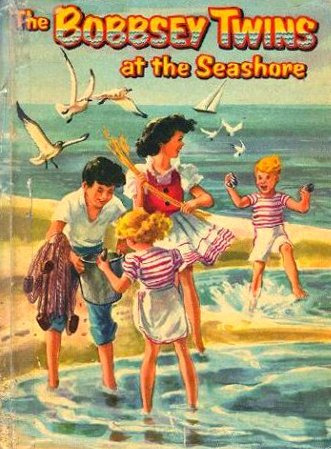
“The Bobbsey Twins at the Seashore” was originally published in 1907, the third in a series of children’s books. There were 72 books in all, the first appearing in 1904 and the last in 1979. In 1953’s “The Camping Trip” (ILL S2;E29) Ethel referred to Lucy and Ricky as the Bobbsey Twins. In “No More Double Dates” (TLS S1;E21) they are mentioned again. They were authored by Laura Lee Hope, which was a pseudonym for a series of writers employed by the publisher.
Liz finds a book about how to play mahjong that George forgot to return to the library.
GEORGE: “When was it due?” LIZ: “May 13th. 1936!”
George wants to donate it to the sale, but Liz refuses to handle ‘hot’ merchandise. George sarcastically calls her Pear-Shape.
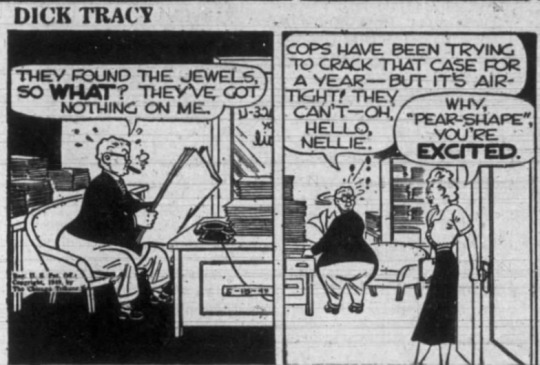
George is not referring to Liz’s figure, but to the character in the Dick Tracy comic strip named Pear-Shape Tone, who was part of the storyline from April to July 1949. He was a racketeer who would steal jewelry from his wealthier clients, then fence it to make a profit. One of his famous heists was referred to on “My Favorite Husband” in “Anniversary Presents” aired on May 13, 1949.
LIZ: “George, look! On the second shelf! ‘Little Men’ is leaning against ‘Little Women’! Oh, look, George! They’ve had a little pamphlet!”

“Little Women” (1868) and its sequel “Little Men” (1871) are books by Louisa May Alcott. A sequel was titled “Good Wives” (1869) but in America was combined with “Little Women” for publication. A third book (not a pamphlet) arrived in 1886 titled “Jo’s Boys.”
Liz finds the Arbutus, George’s old high school year book from 1929. George was a senior, Liz was a freshman. He reads some of the inscriptions from his friends. The book has a photo of Liz as a Freshman Princess - dimples in her knees.
LIZ: “I used to spend every evening kneeling on two collar buttons!”
Liz suddenly feels very old. She has turned from ‘a flower in the bloom of youth’ to ‘an old stink weed’. She starts to cry and decides to go to bed because old people need their rest.
In the morning Katie the Maid finds Liz gazing at herself in the mirror.
LIZ: “I haven’t felt so old since the day Shirley Temple got married.”

Former child star Shirley Temple married actor (and then Army Air Force Sergeant) John Agar on September 19, 1945, when she was just 17 years-old. At one time, Temple was one of Hollywood’s biggest box office stars. The marriage became troubled, and Temple divorced Agar on December 5, 1949. On December 16, 1950, Temple re-married to Charles Alden Black, a Navy intelligence officer and assistant to the President of the Hawaiian Pineapple Company.
George is concerned about Liz, so he visits a psychiatrist (Gerard Mohr). He tells her to flatter her and make her feel young again.
PSYCHIATRIST: “A few days of attention and you won’t be able to leave her alone without a sitter!”
George comes home and finds Liz in a rocking chair. He has brought her roses and candy. She begins to cry and is immediately suspicious of his motivations for bringing her gifts. She decides to go to her room - alone. George immediately starts to dial Dr. Stewart, humming while he does:
GEORGE: “Little Old Lady young and fair, you’re in everyone’s hair...”

The song “Little Old Lady” was a 1937 hit written by Hoagy Carmichael and Stanley Adams. It was also heard on stage and screen.
Dr. Stewart tells George that it is natural for a wife not to believe her husband. He suggests an outsider flattering her would be more convincing and he has just the person - himself! George reluctantly agrees and decides to say that Dr. Stewart is an old college friend. He will drop by at eight o’clock that evening.
When the doorbell rings, George announces him as Charley Stewart, who immediately takes Liz for George’s daughter. After some flattery, they decide to listen to the radio. Liz says her favorite she is “Life Begins at 80″.
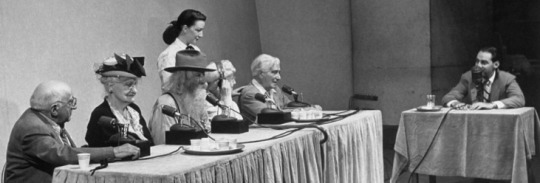
“Life Begins at 80″ was a panel quiz show that aired on radio from 1948 to 1949, before making the shift to television in 1950. In it, octogenarians answered questions sent in by listeners. Jack Barry hosted.
Chuck insists that they play music and invites Liz to dance the Samba. After three hours, Chuck compliments her dancing, but George is getting impatient.
LIZ: “Treatment, George. Treatment!” GEORGE: “It looks more like a treat than a treatment.”
Chuck starts whispering amorous compliments into Liz’s ear just out of ear shot of George. He demands to know what’s going on.
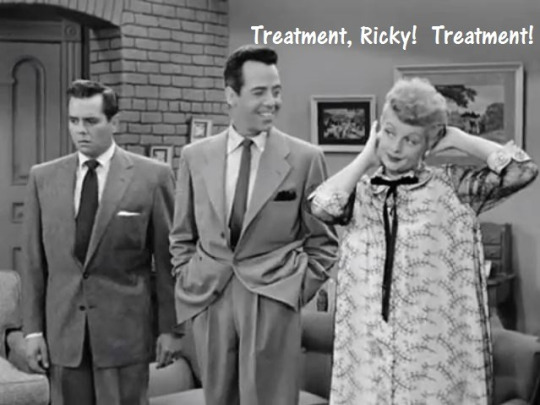
LIZ: “Treatment, George! Treatment!” GEORGE: “What do you know about treatment?” LIZ: “Nothing. But whenever he says it you leave us alone.”
George finally can’t take anymore and tells Liz the truth about Chuck being a psychiatrist, telling him to leave at once. After Chuck leaves, George finds Liz back in her rocking chair lamenting her old age.
Next day the phone rings and Katie answers it. It is George, checking up on Liz, who Katie reports is making out her will.
KATIE: “She’s leaving you to me!”
George has a plan. He’s going to bring home a real old lady - seventy year-old Mrs. Green - to show Liz how young she really is. Katie finds Liz happily singing.
KATIE: “What’s happened to ya? Last night you were Grandma Moses and now you’re Junior Miss!”

Grandma Moses (1860-1961) was an American folk artist who began painting at the age of 78 and is often cited as an example of a person who successfully began a career at an advanced age. In “Nursery School” (ILL S5;E9) Lucy Ricardo is so proud of Little Ricky’s first drawing, she dubs him the next “Grandpa Moses.” The Ricardos had two framed prints by Grandma Moses next to their front door: “So Long” and “The Old Snow Roller.”

Junior Miss is a collection of semi-autobiographical stories by Sally Benson first published in The New Yorker. Between 1929 and the end of 1941, the prolific Benson published 99 stories. She had a bestseller when Doubleday published her Junior Miss collection in 1941. The stories inspired a Broadway play (1941), film (1945), radio series starring the aforementioned Shirley Temple (1942), and television show (1957).
Liz tells Katie that she got a call from the Psychiatrist asking her out on a date. Katie says that since she’s now in a more upbeat mood, she’d better call George and tell him not to go through with his plan. But Liz has other ideas. Since he tricked her by brining home a psychiatrist, Liz will trick him by pretending to be an old lady when she brings Mrs. Green home!
Liz dons a shawl, eyeglasses, a gray wig, and talks with a creaky voice. Mrs. Annie Green (Bea Benadaret) and ‘Lizzie’ sit down for a chat. Whatever question Mrs. Green asks, Liz answers “Penicillin”! Lizzie tells Annie that she can’t dance because she’s got the gout.
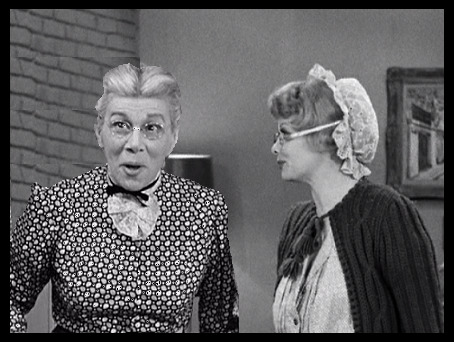
LIZZIE: “I can’t dance any unless I get oiled. In my joints, I mean.” ANNIE: “I’ve been oiled in few joints myself!” LIZZIE: “Oh, Annie! You’re a caution! Just cuz ya got snow on the roof don’t mean there’s no fire in the furnace.”
Annie tells Lizzie about a hot Bingo game in back of the Blue Bird Tea Shop (which just a front).
ANNIE: “Get your green eye shade and let’s go!” LIZZIE: “I’ll get my wheelchair! We can ride down.” ANNIE: “What model you got?” LIZZIE: “A real hopped-up job; I hooked it to a Mixmaster. I had some speed trials yesterday.” ANNIE: “What did ya make?” LIZZIE: “Fourteen miles an hour and a bunt cake!”

In 1930, the Sunbeam Company introduced the Mixmaster mixer, the first mechanical mixer with two detachable beaters whose blades interlocked. Several attachments were available for the Mixmaster, including a juice extractor, drink mixer, meat grinder–food chopper, and slicer–shredder. The Mixmaster became the company's flagship product for the next forty years.
George has had enough and tells Liz to stop, so she gives up the old lady act. She tells him she’s feeling better, but George lets it slip that he told Chuck to call and ask her out on a date. She’s distraught again and Annie and Lizzie toddle off to Bingo!
#My Favorite Husband#Lucille Ball#Richard Denning#Gerard Mohr#Bea Benadaret#Ruth Perrott#Mixmaster#Grandma Moses#Junior Miss#The Bobbsey Twins#Life Begins at 80#Shirley Temple#Little Old Lady#John Agar#Gerald Mohr#Bob LeMond#Dick Tracy
4 notes
·
View notes
Text
IS THERE A BABY IN THE HOUSE?
November 27, 1948
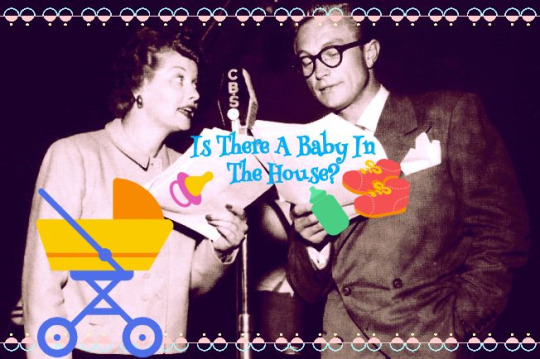
“Is There A Baby In The House?” (aka “There’s A Baby In The House”) is episode #18 of the radio series MY FAVORITE HUSBAND broadcast on November 27, 1948.
Synopsis ~ Liz goes over to meet the new neighbors and winds up minding a four-month old baby overnight.
Note: This episode was aired before the characters names were changed from Cugat to Cooper. It was also before Jell-O came aboard to sponsor the show and before the regular cast featured Bea Benadaret and Gale Gordon as the Atterburys.

“My Favorite Husband” was based on the novels Mr. and Mrs. Cugat, the Record of a Happy Marriage (1940) and Outside Eden (1945) by Isabel Scott Rorick, which had previously been adapted into the film Are Husbands Necessary? (1942). “My Favorite Husband” was first broadcast as a one-time special on July 5, 1948. Lucille Ball and Lee Bowman played the characters of Liz and George Cugat, and a positive response to this broadcast convinced CBS to launch “My Favorite Husband” as a series. Bowman was not available Richard Denning was cast as George. On January 7, 1949, confusion with bandleader Xavier Cugat prompted a name change to Cooper. On this same episode Jell-O became its sponsor. A total of 124 episodes of the program aired from July 23, 1948 through March 31, 1951. After about ten episodes had been written, writers Fox and Davenport departed and three new writers took over – Bob Carroll, Jr., Madelyn Pugh, and head writer/producer Jess Oppenheimer. In March 1949 Gale Gordon took over the existing role of George’s boss, Rudolph Atterbury, and Bea Benaderet was added as his wife, Iris. CBS brought “My Favorite Husband” to television in 1953, starring Joan Caulfield and Barry Nelson as Liz and George Cooper. The television version ran two-and-a-half seasons, from September 1953 through December 1955, running concurrently with “I Love Lucy.” It was produced live at CBS Television City for most of its run, until switching to film for a truncated third season filmed (ironically) at Desilu and recasting Liz Cooper with Vanessa Brown.
MAIN CAST

Lucille Ball (Liz Cugat) was born on August 6, 1911 in Jamestown, New York. She began her screen career in 1933 and was known in Hollywood as ‘Queen of the B’s’ due to her many appearances in ‘B’ movies. “My Favorite Husband” eventually led to the creation of “I Love Lucy,” a television situation comedy in which she co-starred with her real-life husband, Latin bandleader Desi Arnaz. The program was phenomenally successful, allowing the couple to purchase what was once RKO Studios, re-naming it Desilu. When the show ended in 1960 (in an hour-long format known as “The Lucy-Desi Comedy Hour”) so did Lucy and Desi’s marriage. In 1962, hoping to keep Desilu financially solvent, Lucy returned to the sitcom format with “The Lucy Show,” which lasted six seasons. She followed that with a similar sitcom “Here’s Lucy” co-starring with her real-life children, Lucie and Desi Jr., as well as Gale Gordon, who had joined the cast of “The Lucy Show” during season two. Before her death in 1989, Lucy made one more attempt at a sitcom with “Life With Lucy,” also with Gordon.
Richard Denning (George Cugat) was born Louis Albert Heindrich Denninger Jr., in Poughkeepsie, New York. When he was 18 months old, his family moved to Los Angeles. Plans called for him to take over his father’s garment manufacturing business, but he developed an interest in acting. Denning enlisted in the US Navy during World War II. He is best known for his roles in various science fiction and horror films of the 1950s. Although he teamed with Lucille Ball on radio in “My Favorite Husband,” the two never acted together on screen. While “I Love Lucy” was on the air, he was seen on another CBS TV series, “Mr. & Mrs. North.” From 1968 to 1980 he played the Governor on “Hawaii 5-0″, his final role. He died in 1998 at age 84.
Ruth Perrott (Katie, the Maid) was also later seen on “I Love Lucy.” She first played Mrs. Pomerantz, a member of the surprise investigating committee for the Society Matrons League in “Pioneer Women” (ILL S1;E25), as one of the member of the Wednesday Afternoon Fine Arts League in “Lucy and Ethel Buy the Same Dress” (ILL S3;E3), and also played a nurse when “Lucy Goes to the Hospital” (ILL S2;E16). She died in 1996 at the age of 96.
Bob LeMond (Announcer) also served as the announcer for the pilot episode of “I Love Lucy”. When the long-lost pilot was finally discovered in 1990, a few moments of the opening narration were damaged and lost, so LeMond – fifty years later – recreated the narration for the CBS special and subsequent DVD release.
GUEST CAST

John Hiestand (Cory Cartwright) served as the announcer for the radio show “Let George Do It” from 1946 to 1950. In 1955 he did an episode of “Our Miss Brooks” opposite Gale Gordon.

Frank Nelson (Mr. Brennan) was born on May 6, 1911 (three months before Lucille Ball) in Colorado Springs, Colorado. He started working as a radio announcer at the age of 15. He later appeared on such popular radio shows as “The Great Gildersleeve,” “Burns and Allen,” and “Fibber McGee & Molly”. Aside from Lucille Ball, Nelson is perhaps most associated with Jack Benny and was a fifteen-year regular on his radio and television programs. His trademark was playing clerks and other working stiffs, suddenly turning to Benny with a drawn out “Yeeeeeeeeees?” Nelson appeared in 11 episodes of “I Love Lucy”, including three as quiz master Freddy Fillmore, and two as Ralph Ramsey, plus appearance on “The Lucy-Desi Comedy Hour” - making him the only actor to play two different recurring roles on “I Love Lucy.” Nelson returned to the role of the frazzled Train Conductor for an episode of “The Lucy Show” in 1963. This marks his final appearance on a Lucille Ball sitcom.

Mary Lansing (New Neighbor, Little Stevie’s Mother) was best known for playing Martha Clark and ten other characters in Mayberry on “The Andy Griffith Show” and “Mayberry R.F.D.”, both filmed at Desilu. Lucy lovers might remember her as the voice of weepy Cynthia in “Over The Teacups”, the Broadway play that the Ricardos and Mertzes attend in “Ethel’s Birthday” (ILL S4;E9). She met Frank Nelson performing on radio. They married in 1933 and had two children. Lansing appeared with him frequently on the “Jack Benny Program” during the 1950s.
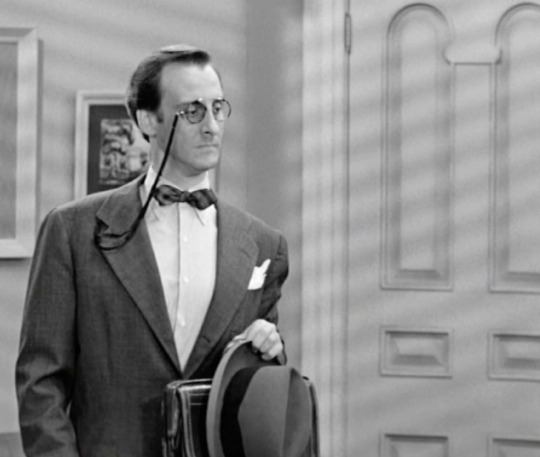
Hans Conried (Mr. Atterbury, George’s Boss) first co-starred with Lucille Ball in The Big Street (1942). He then appeared on “I Love Lucy” as used furniture man Dan Jenkins in “Redecorating” (ILL S2;E8) and later that same season as Percy Livermore in “Lucy Hires an English Tutor” (ILL S2;E13) – both in 1952. The following year he began an association with Disney by voicing Captain Hook in Peter Pan. On “The Lucy Show” he played Professor Gitterman in “Lucy’s Barbershop Quartet” (TLS S1;E19) and in “Lucy Plays Cleopatra” (TLS S2;E1). He was probably best known as Uncle Tonoose on “Make Room for Daddy” starring Danny Thomas, which was filmed on the Desilu lot. He joined Thomas on a season 6 episode of “Here’s Lucy” in 1973. He died in 1982 at age 64.
In a few months, the role of Mr. Atterbury will be assumed by Gale Gordon.
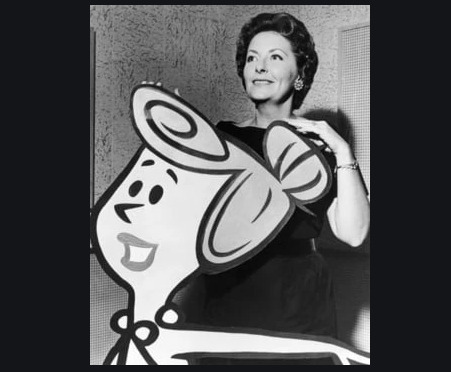
Jean Vander Pyl (Stevie the Baby) is best known as the voice of Wilma Flintstone for the Hanna-Barbera cartoon “The Flintstones.” Coincidentally, Wilma’s best friend was voiced by Bea Benadaret, who will later play Iris Atterbury, Liz’s best friend on “My Favorite Husband.” On radio she was heard on such programs as “The Halls of Ivy” (1950–52) and on “Father Knows Best” before it moved to TV. She died in 1999 at age 79.
Doing baby voices was something that Vander Pyl would also do on “The Flintstones” where she did the voice of her own daughter, Pebbles.
EPISODE
ANNOUNCER: “As we look in on the Cugats this morning something new has been added. There’s a moving van in front of the house next door, but of course the new neighbors don’t interest Liz Cugat in the least!”
Liz is peering through the front window at the goings on next door using George’s binoculars. George gets interested only when she sees fishing and hunting equipment being unloaded.
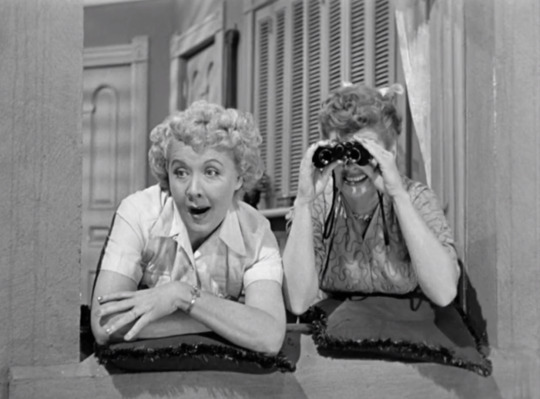
In “New Neighbors” (ILL S1;E21) in 1952, Lucy and Ethel watch new tenants the O’Briens move in using Ricky’s binoculars. Like Liz, Lucy mistakes a bug on the lens for the new neighbor! Unlike George, it is blonde, shapely Mrs. O’Brien who gets Ricky and Fred interested, not sporting equipment.
Cory Cartwright (John Hiestand) drops by for a rare early morning visit. He’s come by to tell George that he is to be the trustee of his mother’s club, who helps an orphan home with 130 children. George makes Liz promise not to go next door and bother the new neighbors while he is at work.
Liz and Katie spend two hours washing windows while spying on the movers. Liz says they moved in a lot of junk.
KATIE: “With women who know junk best, it’s Mrs. Cugat two to one!”

Katie is sarcastically paraphrasing a popular ad slogan of the 1930s and ‘40s for Lucky Strike Cigarettes: “With men who know tobacco best, it’s Luckies 2 to 1″.
Liz wildly figures that if she doesn’t go over and visit the new neighbor she may lonely, take to brooding, become moody and despondent and turn on the gas. Liz rushes off to save her life!
Liz visits the new neighbor (Mary Lansing), who compliments Liz on having two such industrious maids - the ones who spent the two hours cleaning the same window! Before Liz leaves, the woman asks her to babysit with her four month old son, Stevie (Jean Vander Pyl), while she runs an errand.
George comes home early while Liz is still watching the baby, so she tells Katie to take him into the den. George hears the baby crying and goes into the den to see for himself and demands to know who it belongs to.
LIZ: “You wouldn’t believe it’s mine, would you?” GEORGE: “No!” LIZ: “Princess Elizabeth’s?”

When Britain’s Queen Elizabeth II was still Princess Elizabeth, she gave birth to Prince Charles, who was born on November 14, 1948, two weeks before this broadcast. Princess Elizabeth became Queen upon the death of her father, George VI in February 1952. Lucy Ricardo performed for her in “Lucy Meets The Queen” (ILL S5;E15) in January 1956. Naturally, the monarch remained off camera.
Liz admits that the child belongs to their new neighbor. Just then the telephone rings and Liz leaves George with the baby to answer it. George tries to distract the child with his pocketwatch, which Stevie promptly breaks. Liz returns to report that Stevie’s mother is delayed and they have to watch the child overnight!
~END OF ACT ONE~
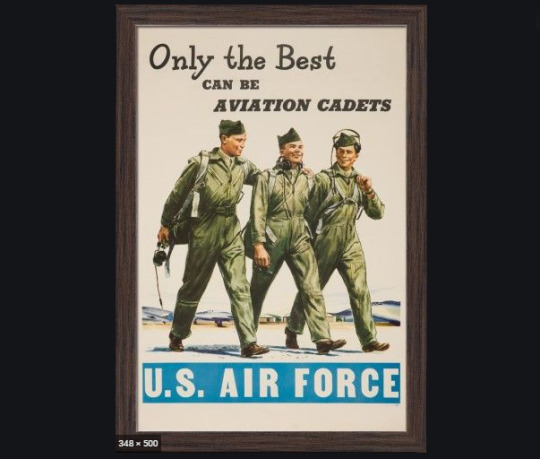
A patriotic public service announcement details how the US Air Force helped a Spanish town remove a precariously tottering statue from a high building.
ANNOUNCER: “And now, let’s go back to Liz and George Cugat and see how they are getting along with the baby.”
In the kitchen, Liz and George are trying to figure out how to feed the baby, not remembering the exact formula. They decide to feed him cereal, instead.
LIZ: “Now which kind do you think he’ll like best? Corn Flakes or Post Toasties? Here’s a good one: Grape-Nuts!”

Post Toasties was a breakfast cereal made by Post Foods as the Post version of Kellogg’s popular Corn Flakes. They were discontinued as of August 2016, although Kellogg’s Corn Flakes are still going strong. Post also made Grape- Nuts, initially marketed as a natural cereal that could enhance health and vitality. It is still sold today.
George thinks they should just feed him baby oil, but Liz correct him that baby oil is not for drinking, but for frying the cereal! They resort to canned baby food, but think it is spoiled because it is all mushy. They settle on milk, but can’t find the nipples, so Liz decides to cut the fingers off a rubber glove instead.
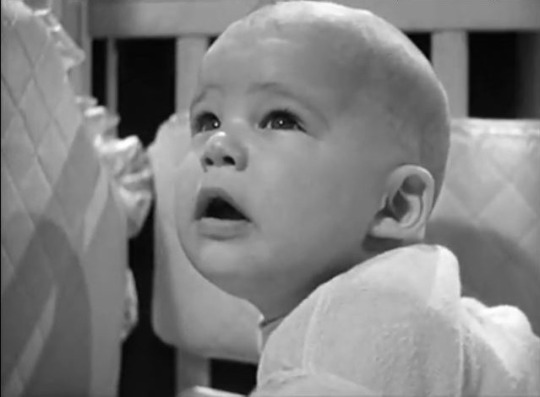
The baby cries all night long. Liz picks him up every time he cries, but as soon as she puts him down, he cries again.
GEORGE: “I know how to make him sleep: ‘Rock-a-bye Baby’. Wait here and I’ll go get a great big rock.” LIZ: “George!!!”
Liz realizes that the baby can’t sleep because she didn’t burp him. After a few pats on the back, Stevie burps.

LIZ: “Isn’t that cute?” GEORGE: “Cute? When he does it it’s cute. When I do it it’s vulgar!”
At the bank the next day, Mr. Atterbury (Hans Conried) calls a sleep-deprived George into his office. He tells George that Mr. Brennan, the man from the Orphans Home, is reluctant to make George trustee because he has no children. Mr. Atterbury comes up with a plan. George must rush home to meet Mr. Brennan and pretend that the neighbor’s baby is his own!
Mr. Brennan (Frank Nelson) arrives at the Cugat’s door just as George comes tearing up the walk to warn Liz of the scheme. George gets Liz into the kitchen to fill her in on the plan, but Liz has already given the baby back to his mother. George tells her to get that baby back!

Liz dashes out the back door, tearing her dress on a branch, and stepping in a puddle. Stevie’s mother asks her husband was was going into her house and Liz realizes that Mr. Brennan is the new neighbor and that Stevie is his son. Liz grabs the baby and rushes back home in shambles, hoping that Mr. Brennan will not notice.

But Mr. Brennan sees a resemblance between the two babies and heads home and get his son to compare the two. Liz rush through the back door to return the baby before he can get there. On the way back Liz tears her dress on a nail, falls in a puddle and gets back just in time to find Mr. Brennan at the door without his son!
MR. BRENNAN: “When I got home and took a good look at him I could see: they don’t look alike at all!”
Later, Liz goes to see Mr. Brennan to tell him how wonderful her favorite husband is and Brennan gives George the job as trustee. He asks one favor, however - that they babysit Little Stevie.
GEORGE: “Not tonight!” LIZ: “No, not tonight. For the whole weekend. Goodnight, George!”
~ END OF EPISODE ~

#My Favorite Husband#Lucille Ball#Richard Denning#Hans Conried#Jean Vander Pyl#Mary Lansing#Ruth Perrott#Frank Nelson#US Air Force#1948#Post Toasties#Kellogg's Corn Flakes#Bran-Nuts#I Love Lucy#Queen ELizabeth#Lucky Strike#John Hiestand
11 notes
·
View notes
Text
THE WILLS
March 19, 1950
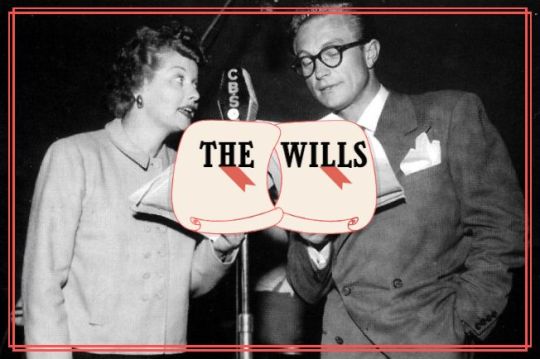
“The Wills” (aka “The Coopers Make Their Wills”) is episode #80 of the radio series MY FAVORITE HUSBAND broadcast on March 19, 1950.
Synopsis ~ After Liz and George make out their wills, Liz is convinced that George intends to do away with her. Liz is startled to find a receipt for some arsenic and rope in his pocket, but is shocked when George suggests a trip to the country - with a one-way ticket for Liz!
Starting with this episode, “My Favorite Husband” moved from Thursday nights, to Sunday nights.

Note: This program was used as a basis for a scene in “I Love Lucy” episode “Lucy Thinks Ricky Is Trying to Murder Her” (ILL S1;E4) filmed on September 8, 1951 and first aired November 5, 1951. For various reasons, it was the first episode of the series filmed, but the fourth aired.
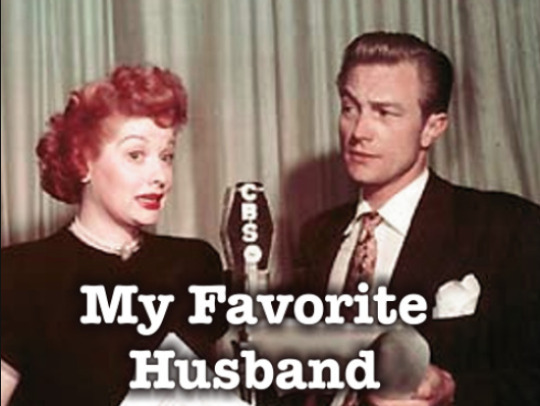
“My Favorite Husband” was based on the novels Mr. and Mrs. Cugat, the Record of a Happy Marriage (1940) and Outside Eden (1945) by Isabel Scott Rorick, which had previously been adapted into the film Are Husbands Necessary? (1942). “My Favorite Husband” was first broadcast as a one-time special on July 5, 1948. Lucille Ball and Lee Bowman played the characters of Liz and George Cugat, and a positive response to this broadcast convinced CBS to launch “My Favorite Husband” as a series. Bowman was not available Richard Denning was cast as George. On January 7, 1949, confusion with bandleader Xavier Cugat prompted a name change to Cooper. On this same episode Jell-O became its sponsor. A total of 124 episodes of the program aired from July 23, 1948 through March 31, 1951. After about ten episodes had been written, writers Fox and Davenport departed and three new writers took over – Bob Carroll, Jr., Madelyn Pugh, and head writer/producer Jess Oppenheimer. In March 1949 Gale Gordon took over the existing role of George’s boss, Rudolph Atterbury, and Bea Benadaret was added as his wife, Iris. CBS brought “My Favorite Husband” to television in 1953, starring Joan Caulfield and Barry Nelson as Liz and George Cooper. The television version ran two-and-a-half seasons, from September 1953 through December 1955, running concurrently with “I Love Lucy.” It was produced live at CBS Television City for most of its run, until switching to film for a truncated third season filmed (ironically) at Desilu and recasting Liz Cooper with Vanessa Brown.
MAIN CAST

Lucille Ball (Liz Cooper) was born on August 6, 1911 in Jamestown, New York. She began her screen career in 1933 and was known in Hollywood as ‘Queen of the B’s’ due to her many appearances in ‘B’ movies. With Richard Denning, she starred in a radio program titled “My Favorite Husband” which eventually led to the creation of “I Love Lucy,” a television situation comedy in which she co-starred with her real-life husband, Latin bandleader Desi Arnaz. The program was phenomenally successful, allowing the couple to purchase what was once RKO Studios, re-naming it Desilu. When the show ended in 1960 (in an hour-long format known as “The Lucy-Desi Comedy Hour”) so did Lucy and Desi’s marriage. In 1962, hoping to keep Desilu financially solvent, Lucy returned to the sitcom format with “The Lucy Show,” which lasted six seasons. She followed that with a similar sitcom “Here’s Lucy” co-starring with her real-life children, Lucie and Desi Jr., as well as Gale Gordon, who had joined the cast of “The Lucy Show” during season two. Before her death in 1989, Lucy made one more attempt at a sitcom with “Life With Lucy,” also with Gordon.
Richard Denning (George Cooper) was born Louis Albert Heindrich Denninger Jr., in Poughkeepsie, New York. When he was 18 months old, his family moved to Los Angeles. Plans called for him to take over his father’s garment manufacturing business, but he developed an interest in acting. Denning enlisted in the US Navy during World War II. He is best known for his roles in various science fiction and horror films of the 1950s. Although he teamed with Lucille Ball on radio in “My Favorite Husband,” the two never acted together on screen. While “I Love Lucy” was on the air, he was seen on another CBS TV series, “Mr. & Mrs. North.” From 1968 to 1980 he played the Governor on “Hawaii 5-0″, his final role. He died in 1998 at age 84.
Gale Gordon (Rudolph Atterbury) had worked with Lucille Ball on “The Wonder Show” on radio in 1938. One of the front-runners to play Fred Mertz on “I Love Lucy,” he eventually played Alvin Littlefield, owner of the Tropicana, during two episodes in 1952. After playing a Judge in an episode of “The Lucy-Desi Comedy Hour” in 1958, he would re-team with Lucy for all of her subsequent series’: as Theodore J. Mooney in ”The Lucy Show”; as Harrison Otis Carter in “Here’s Lucy”; and as Curtis McGibbon on “Life with Lucy.” Gordon died in 1995 at the age of 89.
Bea Benadaret (Iris Atterbury) does not appear in this episode.
Ruth Perrott (Katie, the Maid) was also later seen on “I Love Lucy.” She first played Mrs. Pomerantz (above right), a member of the surprise investigating committee for the Society Matrons League in “Pioneer Women” (ILL S1;E25), as one of the member of the Wednesday Afternoon Fine Arts League in “Lucy and Ethel Buy the Same Dress” (ILL S3;E3), and also played a nurse when “Lucy Goes to the Hospital” (ILL S2;E16). She died in 1996 at the age of 96.
Bob LeMond (Announcer) also served as the announcer for the pilot episode of “I Love Lucy”. When the long-lost pilot was finally discovered in 1990, a few moments of the opening narration were damaged and lost, so LeMond – fifty years later – recreated the narration for the CBS special and subsequent DVD release.
GUEST CAST

Herb Vigran (Doctor Stephens) made several appearances on “My Favorite Husband.” He would later play Jule, Ricky’s music union agent on two episodes of “I Love Lucy”. He would go on to play Joe (and Mrs. Trumbull’s nephew), the washing machine repairman in “Never Do Business With Friends” (S2;E31) and Al Sparks, the publicity man who hires Lucy and Ethel to play Martians on top of the Empire State Building in “Lucy is Envious” (S3;E23). Of his 350 screen roles, he also made six appearances on “The Lucy Show.”
EPISODE
ANNOUNCER: “As we look in on the Coopers tonight, it's just after dinner, and we find Liz and George settling down to a normal evening's conversation.”
George has something he needs to talk to Liz about. Liz immediately thinks it is something to do with her household budget, but George wants to talk about their wills. The subject immediately upsets Liz. The idea of living without George sends Liz into gales of tears. George wants her to read it, and threatens to leave everything to his mother if she doesn’t. Liz snatches the will from him. George then tells her that he has had her will drawn up as well.
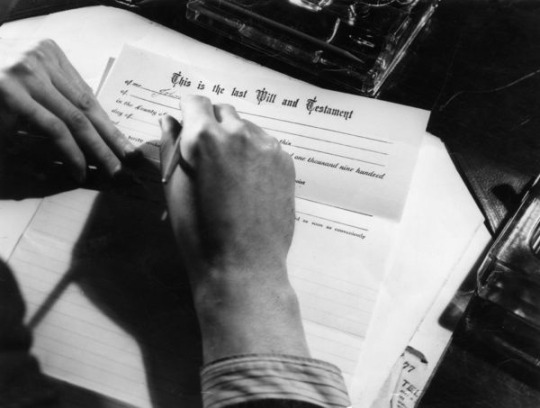
LIZ: “What for? You're the one who's going! What are you trying to do, push me ahead of you in line?”
George reminds her of the three acres of Florida beachfront property that her father left her, which she calls ‘Sunken Acres.’ George always assumed it was oil land.
LIZ: “If there's any oil down there, it's still in a whale. Oh! I see it all now, George! You want me to sign a will leaving everything to you, and then you'll bump me off! You want to get your dirty fishhooks on my oil holdings!
Liz agrees to read and sign the will as the scene fades out. At the bank the next day, Mr. Atterbury notices that George seems tired. George admits he was up late talking to Liz about their wills. Mr. Atterbury proposes that the Coopers join him and Iris at their mountain lodge for the weekend, flying up, and then leaving the girls there for the week while they fly back for work. The following weekend they will drive up to get them in Mr. Atterbury’s new car.

Mr. Atterbury has already bought the airline tickets and asks George to go to the hardware store for a few items.
MR. ATTERBERRY: “I need poison for those horrible little gophers up there. And some rope for a clothesline, and a couple of sacks of cement. Iris wants a patio so she can sunbathe. Come to think of it, that ought to keep the gophers away.” GEORGE: “Let me make a list on the back of this envelope. Now, poison, ropes, cement...” MR. ATTERBERRY: “Oh, and I need an axe, too.”
Mr. Atterbury tells George that they should tell their wives that they are just going for a weekend, so that they don’t rush out to buy a week’s worth of new clothes.
At the Cooper home, Katie the Maid is preparing dinner. George comes home and tells Liz the good news that they’ll be going to the Atterbury’s lodge this weekend, and he’s got the airline tickets in his pocket. As George goes upstairs to prepare for dinner, Katie reminds Liz that she has a beauty shop appointment on Saturday. Liz wonders what time the plane leaves, and fishes in George’s jacket pocket to check the tickets. She notices that one tickets is round trip, and the other is one way! Liz immediately assumes one of them isn’t coming back, and reminds Katie that George asked her to sign her will! She notices some writing on the envelope that looks like a shopping list.
LIZ: “Poison! He's going to take me out in the woods and poison me! Look, at the next item - rope. If the poison doesn't work, he's gonna hang me! Cement. If I live through the poison and the rope, he's gonna put my feet in cement and dump me in the lake! Look what's next - axe! If I able to hold my breath, he's gonna swim in the water and chop me to pieces!” KATIE: “Oh, how can Mr. Cooper do such a thing?” LIZ: “With that list of weapons, how can he miss?“
Liz realizes why George might want to do away with her - they’ve finally struck oil on Sunken Acres!
End of Part One

Announcer Bob LeMond reads a live Jell-O commercial.
ANNOUNCCER: “As we return to the Coopers, we find Liz in a state of nervous apprehension. After years of having George under her thumb, she's suddenly discovered that he's bout to put the finger on her. Or at least she thinks he is. But right now it's after dinner, and Liz, the intended victim, is in the living room, reading. While George, the killer, is slowly stalking up behind her.”
George kisses Liz on the back of the neck. She screams! Liz nervously says that she’d rather not go to the Atterbury’s lodge this weekend.
GEORGE: “What? Why, Liz, you love the lodge. You always say that's your idea of living.” LIZ: “Well, I want to keep it that way.”
George says that he has a big surprise for her up there. Liz suggests he take his mother and give HER the big surprise!
GEORGE: “Now, don't be silly! You just wait: When you wake up Monday morning, you'll be very pleasantly surprised.” LIZ: “If I wake up Monday morning, I'll be surprised.”
Liz wonders if George is having money problems. She asks him why he made her sign her will last night. George says that if it bothers her so much, he’ll tear it up - as soon as they get back from the lodge.
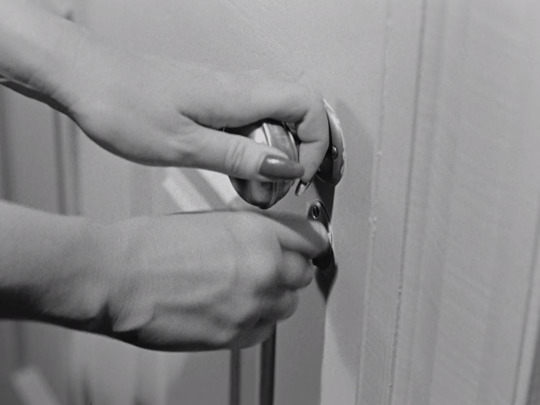
Liz runs to her bedroom and locks the door! George telephones Dr. Stephens (Herb Vigran) to report that Liz is acting peculiar.
DOCTOR: “Peculiar for Liz, or peculiar for normal people?”
RICKY RICARDO: “Lucy is acting crazy!” FRED MERTZ: “Crazy for Lucy or crazy for ordinary people?”
This joke was adapted for Lucy Ricardo in “Lucy Thinks Ricky Is Trying To Do Murder Her” with Fred Mertz taking the Doctor’s line.
Doctor Stephens cannot make a house call because he’s got an appointment with his psychoanalyst, but he tells George to give Liz a sedative until he can get there.

Liz comes in for a glass of water. George tells her that he’s had Katie prepare them some hot milk. In the kitchen, Katie tells Liz that she saw Mr. Cooper pour a powder into one of the glasses. Liz says she’ll just switch the glasses so that George drinks the one with the powder in it.
In the living room she distracts George just long enough to switch the glasses. But when George lifts his glass to drink, Liz dashes it from his hand. She says she couldn’t do it to him, even if he could do it to her.
LIZ: “You put something in my glass, didn't you, George? Well, I fooled you! I switched glasses!” GEORGE: “I had a hunch that's why Katie called you, so I switched them again while you were out of the room.”

Liz starts to gag as if she’s been poisoned! Liz falls to the floor, convinced she is going to die, trying to make peace with George in her final moments.
LIZ: “If I had my life to live over again, I want you to know I'd do better. I could stay within the budget, if I tried. (coughs) And I'd never buy clothes I need. (coughs) I'd throw away my charge-a-plate.”
The doorbell rings. It is Mr. Atterbury, come to make the ‘final arrangements.’ Liz tells George that she saw the one way ticket, and the shopping list for poison and the axe. The men dissolve in laughter. Mr. Atterbury explains that those were supplies for the lodge. Liz is angry that she’s been tricked, and refuses to keep the promises she made in her ‘final moments’.
LIZ: "I didn't know what I was saying! I was under the influence of warm milk!”

End of Episode
In the live Jell-O commercial, Lucille Ball plays a Mexican spy, and Bob LeMond is interviewing her for a job.
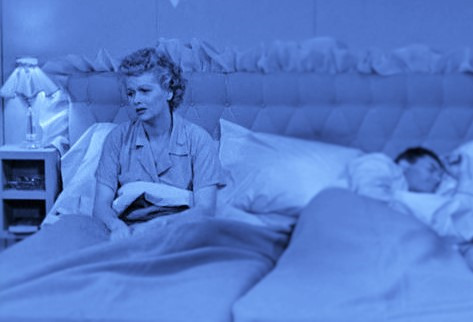
In the bedtime tag, it is five in the morning and George is reading a suspenseful magazine story. Liz begs him to turn out the light, but then can’t sleep until he knows the outcome of the story. Liz grabs the magazine and reads the last lines.
LIZ: “The huge, shapeless thing crept slowly up behind Mildred, and before she could scream it slipped its bony hands around her - Oh, no!!!” GEORGE: “What does it say, Liz? Around her what?” LIZ: “Around her continued next week! Good night!”
ANNOUNCER: “You have been listening to ‘My Favorite Husband’ starring Lucille Ball, with Richard Denning, and based on characters created by Isobel Scott Rorick. Tonight's transcribed program was produced and directed by Jess Oppenheimer, who wrote the script with Madelyn Pugh and Bob Carroll, Jr. Be sure to get the April Issue of ‘Radio Mirror Magazine’ with the big picture of Lucille Ball on the cover. That's the April issue of ‘Radio Mirror Magazine.’ Original music was composed by Marlin Skyles and conducted by Wilbur Hatch. Bob LeMond speaking.”

#My Favorite Husband#Lucille Ball#Richard Denning#Gale Gordon#I Love Lucy#Ruth Perrott#Bob LeMond#Herb Vigran#radio#CBS#Radio Mirror#The Wills#Jello
4 notes
·
View notes
Text
MRS. COOPER’S BOYFRIEND
February 10, 1950
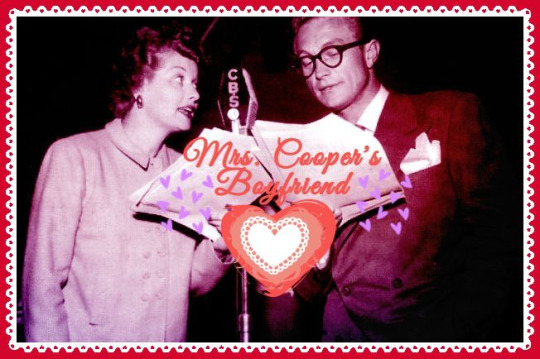
“Mrs. Cooper’s Boyfriend” is episode #75 of the radio series MY FAVORITE HUSBAND broadcast on February 10, 1950.
Synopsis ~ Liz decides that the only way to keep George's mother from coming over on Valentine’s Day is to get her a boyfriend.
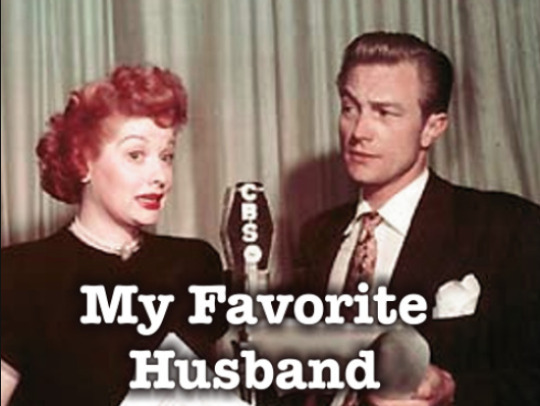
“My Favorite Husband” was based on the novels Mr. and Mrs. Cugat, the Record of a Happy Marriage (1940) and Outside Eden (1945) by Isabel Scott Rorick, which had previously been adapted into the film Are Husbands Necessary? (1942). “My Favorite Husband” was first broadcast as a one-time special on July 5, 1948. Lucille Ball and Lee Bowman played the characters of Liz and George Cugat, and a positive response to this broadcast convinced CBS to launch “My Favorite Husband” as a series. Bowman was not available Richard Denning was cast as George. On January 7, 1949, confusion with bandleader Xavier Cugat prompted a name change to Cooper. On this same episode Jell-O became its sponsor. A total of 124 episodes of the program aired from July 23, 1948 through March 31, 1951. After about ten episodes had been written, writers Fox and Davenport departed and three new writers took over – Bob Carroll, Jr., Madelyn Pugh, and head writer/producer Jess Oppenheimer. In March 1949 Gale Gordon took over the existing role of George’s boss, Rudolph Atterbury, and Bea Benaderet was added as his wife, Iris. CBS brought “My Favorite Husband” to television in 1953, starring Joan Caulfield and Barry Nelson as Liz and George Cooper. The television version ran two-and-a-half seasons, from September 1953 through December 1955, running concurrently with “I Love Lucy.” It was produced live at CBS Television City for most of its run, until switching to film for a truncated third season filmed (ironically) at Desilu and recasting Liz Cooper with Vanessa Brown.
MAIN CAST
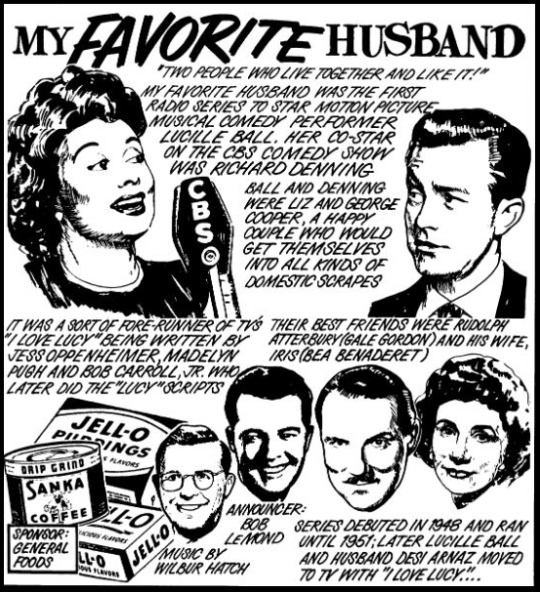
Lucille Ball (Liz Cooper) was born on August 6, 1911 in Jamestown, New York. She began her screen career in 1933 and was known in Hollywood as ‘Queen of the B’s’ due to her many appearances in ‘B’ movies. With Richard Denning, she starred in a radio program titled “My Favorite Husband” which eventually led to the creation of “I Love Lucy,” a television situation comedy in which she co-starred with her real-life husband, Latin bandleader Desi Arnaz. The program was phenomenally successful, allowing the couple to purchase what was once RKO Studios, re-naming it Desilu. When the show ended in 1960 (in an hour-long format known as “The Lucy-Desi Comedy Hour”) so did Lucy and Desi’s marriage. In 1962, hoping to keep Desilu financially solvent, Lucy returned to the sitcom format with “The Lucy Show,” which lasted six seasons. She followed that with a similar sitcom “Here’s Lucy” co-starring with her real-life children, Lucie and Desi Jr., as well as Gale Gordon, who had joined the cast of “The Lucy Show” during season two. Before her death in 1989, Lucy made one more attempt at a sitcom with “Life With Lucy,” also with Gordon.
Richard Denning (George Cooper) was born Louis Albert Heindrich Denninger Jr., in Poughkeepsie, New York. When he was 18 months old, his family moved to Los Angeles. Plans called for him to take over his father’s garment manufacturing business, but he developed an interest in acting. Denning enlisted in the US Navy during World War II. He is best known for his roles in various science fiction and horror films of the 1950s. Although he teamed with Lucille Ball on radio in “My Favorite Husband,” the two never acted together on screen. While “I Love Lucy” was on the air, he was seen on another CBS TV series, “Mr. & Mrs. North.” From 1968 to 1980 he played the Governor on “Hawaii 5-0″, his final role. He died in 1998 at age 84.
Gale Gordon (Rudolph Atterbury) and Bea Benadaret (Iris Atterbury) are not heard in this episode.
Ruth Perrott (Katie, the Maid) was also later seen on “I Love Lucy.” She first played Mrs. Pomerantz (above right), a member of the surprise investigating committee for the Society Matrons League in “Pioneer Women” (ILL S1;E25), as one of the member of the Wednesday Afternoon Fine Arts League in “Lucy and Ethel Buy the Same Dress” (ILL S3;E3), and also played a nurse when “Lucy Goes to the Hospital” (ILL S2;E16). She died in 1996 at the age of 96.
Bob LeMond (Announcer) also served as the announcer for the pilot episode of “I Love Lucy”. When the long-lost pilot was finally discovered in 1990, a few moments of the opening narration were damaged and lost, so LeMond – fifty years later – recreated the narration for the CBS special and subsequent DVD release.
GUEST CAST
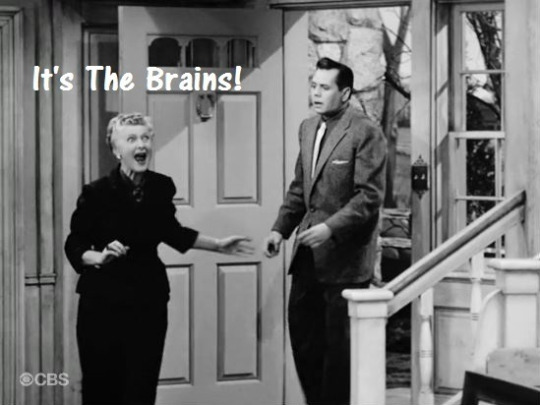
Eleanor Audley (Leaticia Cooper, George’s Mother) previously played this character in “George is Messy” and “Dinner for 12″. She would later play Eleanor Spalding, owner of the Westport home the Ricardos buy in “Lucy Wants To Move to the Country” (ILL S6;E15) in 1957, as well as one of the Garden Club judges in “Lucy Raises Tulips” (ILL S6;E26).
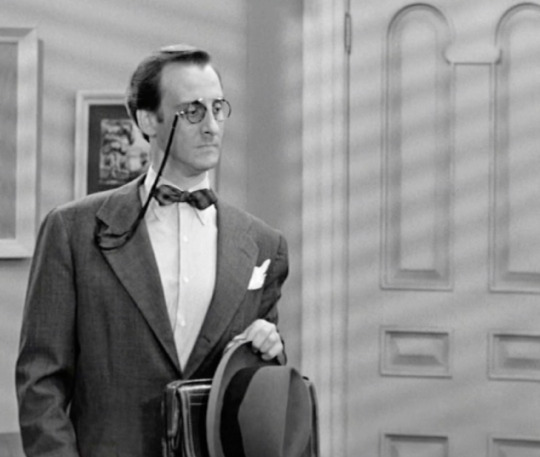
Hans Conried (Mr. Anderson) first co-starred with Lucille Ball in The Big Street (1942). He then appeared on “I Love Lucy” as used furniture man Dan Jenkins in “Redecorating” (ILL S2;E8) and later that same season as Percy Livermore in “Lucy Hires an English Tutor” (ILL S2;E13) – both in 1952. The following year he began an association with Disney by voicing Captain Hook in Peter Pan. On “The Lucy Show” he played Professor Gitterman in “Lucy’s Barbershop Quartet” (TLS S1;E19) and in “Lucy Plays Cleopatra” (TLS S2;E1). He was probably best known as Uncle Tonoose on “Make Room for Daddy” starring Danny Thomas, which was filmed on the Desilu lot. He joined Thomas on a season 6 episode of “Here’s Lucy” in 1973. He died in 1982 at age 64.

Hal March (Mr. Jenkins / Mr. Crockett) first appeared on the “I Love Lucy” in “Lucy Fakes Illness” (ILL S1;E16) using his own name to play an actor posing as the doctor who diagnoses Lucy with ‘golbloots.’ March got his first big break when he was cast as Harry Morton on “The George Burns and Gracie Allen Show” in 1950. He eventually lost the part to Fred Clark who producers felt was better paired with Bea Benaderet, who played Blanche, and here plays Iris Atterbury. He stayed with the show in other roles, the last airing just two weeks before his appearance as Eddie Grant in “Lucy is Matchmaker” (ILL S2;E27). In 1966 he was seen on “The Lucy Show.”
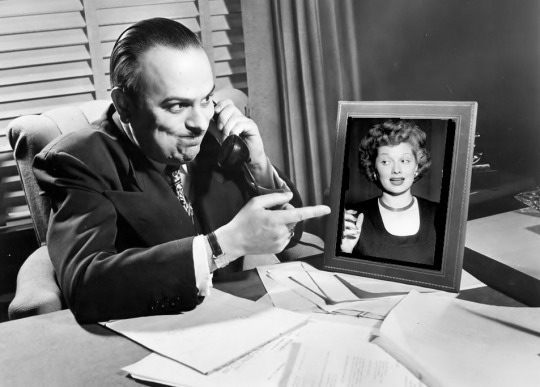
Frank Nelson (J.Q. Williams, Chairman of the Bank) was born on May 6, 1911 (three months before Lucille Ball) in Colorado Springs, Colorado. He started working as a radio announcer at the age of 15. He later appeared on such popular radio shows as “The Great Gildersleeve,” “Burns and Allen,” and “Fibber McGee & Molly”. This is one of his 11 performances on “My Favorite Husband.” On “I Love Lucy” he holds the distinction of being the only actor to play two recurring roles: Freddie Fillmore and Ralph Ramsey, as well as six one-off characters, including the frazzled train conductor in “The Great Train Robbery” (ILL S5;E5), a character he repeated on “The Lucy Show.” Aside from Lucille Ball, Nelson is perhaps most associated with Jack Benny and was a fifteen-year regular on his radio and television programs.
EPISODE
ANNOUNCER: “As we look in on the Coopers it’s morning. George Cooper is eating breakfast, while Liz in the kitchen talking to Katie, the maid.”
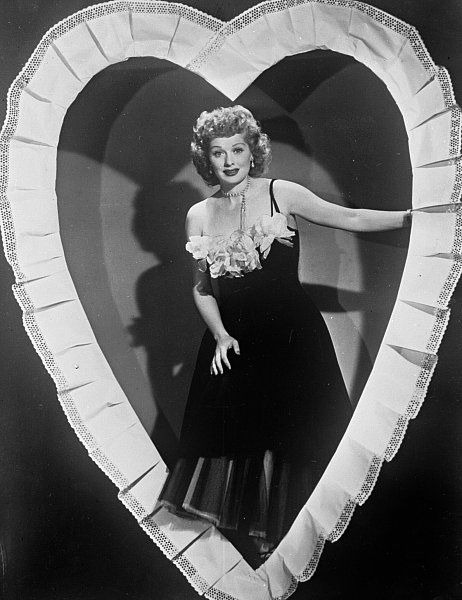
Liz is planning the menu for an intimate Valentine’s Day dinner with George.
LIZ: “Hearts of beef, hearts of artichoke, hearts of lettuce, heart-shaped candy, and heart-shaped cake.” KATIE: “That oughta give ya heart-shaped heartburn!”
Liz joins George for breakfast and notices that he has nicked himself shaving - several times.
LIZ: “You look like you have your face up in paper curlers.”
Liz confesses she used George’s razor to string beans! Liz apologizes with a smooch. She brings up Valentine’s Day, and George breaks it to her that his mother is coming. George reminds Liz that his mother always spends the holidays with them.
LIZ: “It’s Valentine’s Day, not Halloween! Can’t we give her a rain check until Groundhog Day or something?”

Groundhog Day is an American folk tradition established in Pennsylvania around 1840, that supposes that if a groundhog comes out of his burrow and sees his shadow, we are in for six more weeks of winter. The tradition has inspired a Hollywood film and a Broadway musical. Since the date is traditionally February 2 (before Valentine’s Day), Liz is really extending her hospitality into 1951! 1955′s “Lucy Goes to a Rodeo” (ILL S5;E8) opens with Ricky penciling in Lucy for a kiss on February 2nd, which Lucy notes is Groundhog Day.
Liz is upset that her romantic dinner for two will become a threesome. she suggests that if his mother wants to celebrate Valentine’s Day she should get a boyfriend. George says she has no interest in men.
LIZ: “Well, she did once. Or did she win you in a game of Canasta?”
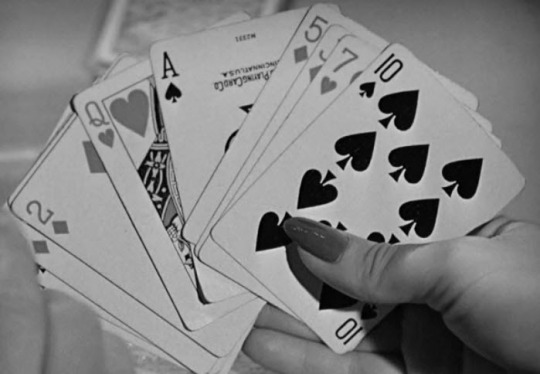
Canasta is a card game of the rummy family devised around 1939. It is most commonly played by four in two partnerships with two standard decks of cards. The game was mentioned several times on episodes of “I Love Lucy.”
George comes around to the idea of getting his mother a boyfriend - but who?
LIZ: “Gee, all I can think of is the Smithsonian Institute!”
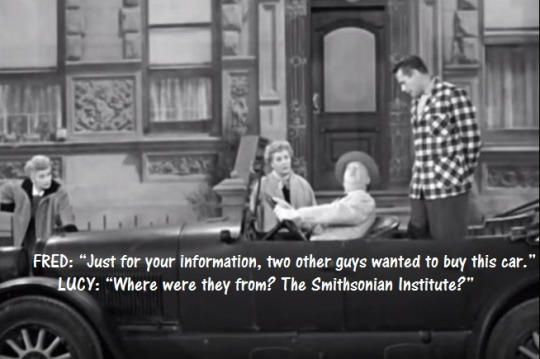
In “Never Do Business With Friends” (ILL S2;E31), Ethel complains that her washing machine is old enough to belong in the Smithsonian Institution. Dubbed ‘the Nation’s attic’, the Smithsonian museums (located primarily in Washington DC) will be mentioned again in reference to the antique Cadillac that Fred buys for the trip to Hollywood.
George rushes off to work. The new bank Chairman is visiting. Liz tells Katie to plan to serve three for Valentine’s Day dinner. Liz says that her mother-in-law uses any excuse to visit - even Boys Week.
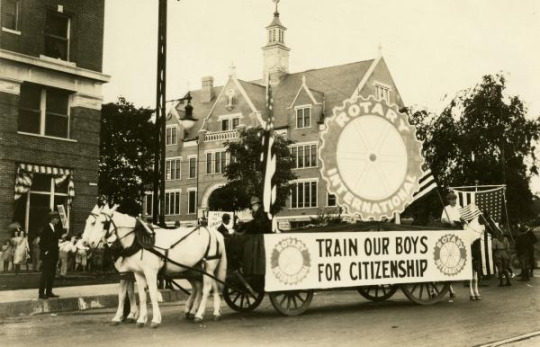
Boys (and Girls) Week was a movement to help build citizenship among youth. The movement began in 1920 with boys. In 1934, Boys Week became known as Youth Week, and in 1936, Boys and Girls Week. A project of the Rotary International, their sponsorship ceased in 1954.
Liz has invited Mother Cooper (Eleanor Audley) over to talk about the idea and before they know it, she has arrived.
LIZ (to Katie): “Well, speak of the devil-in-law.” KATIE (hushed): “How does she get in the house so quietly?” LIZ: “She’s got a muffler on her broom.”
No sooner is she in the kitchen when she is telling Liz that there’s dust on top of her bookcase. Liz quickly changes the subject to dating.
MOTHER COOPER: “It would be nice to have dates, but not a man!” LIZ: “Not a man!?! Well, I don’t know any kangaroos!”
Mother Cooper is intrigued by the idea, but doesn’t think anyone would be interested in a woman of her age.
MOTHER COOPER: “The man isn’t man living who’d have plain old me!” LIZ: “Well, we’ll dig someone up.”
Mrs. Cooper describes her ideal man. Liz urges her to compromise. Mother insists he is only 41 years old. As she leaves, she tells Liz to forget the whole thing.
Katie tells Liz to try looking at the Sheridan Falls Friendship Center, where her sister found all her husbands.
LIZ: “Katie, I’ll do it! I’m going to get a man for Mother Cooper if I have to get an Erector Set and build her one!”
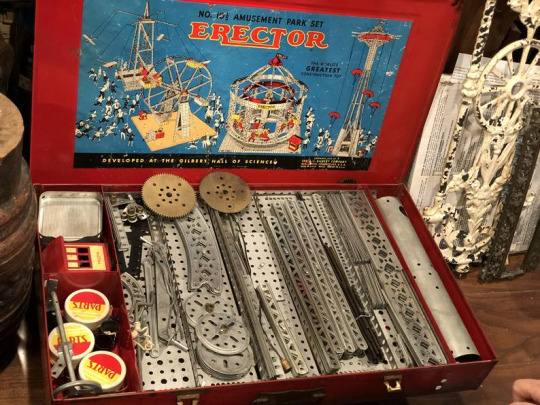
Erector Set was a brand of metal toy construction sets which were originally sold by the Mysto Manufacturing Company in 1913, a successor to wooden Lincoln Logs and a predecessor to plastic LEGO.
END of PART ONE After a short Jello-O commercial featuring announcer Bob LeMond providing a macaroon pudding recipe, the story resumes.
Liz has embarked on her manhunt and we find her downtown at the Sheridan Falls Friendship Center. The building is marked by a large neon sign that says “Lonesome?” The doorbell sounds “Here Comes The Bride”.

Thomas ‘Cupid’ Jenkins (Hal March), the founder, opens the door.
LIZ: “I’d like to order a man!”
Liz immediately states that it is not for her, although Mr. Jenkins clearly doesn’t believe her.
MR. JENKINS: “I understand perfectly. He’s a gift for a friend.”
Liz tells him it is for his mother-in-law. The phone rings and Mr. Jenkins answers it congratulating the caller on her success and promising to remove her card from his file.
MR. JENKINS: “Goodbye, Lady Ashley.” (hangs up) LIZ: “Was that THE Lady Ashely?”
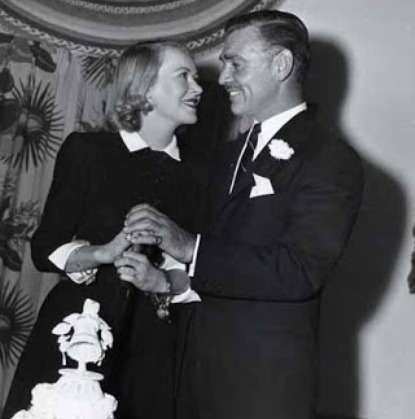
Sylvia, Lady Ashley (1904-77) was an English model, actress, and socialite who was best known for her numerous marriages to British noblemen and American movie stars. On December 20, 1949, she married Clark Gable, the fourth of her five husbands. The pair divorced in 1952.
It turns out to be a different Lady Ashley. Liz and Mr. Jenkins fill out an application card for Mother Cooper. Although Liz describes her as ‘41, attractive and wealthy’, Mr. Jenkins immediately interprets that as ‘65, old battle axe, and broke’! Liz wants someone to come to the house tonight. Mr. Jenkins promises the perfect man will come with a written 30-day guarantee!
At the bank, George is visited by the new Chairman of the Board, J.Q. Williams (Frank Nelson). He wants to get to know the employees and George invites him over for dinner that evening. Unfortunately, their home phone seems to be out of order so he can’t alert Liz. He tells Mr. Williams the address to meet him there.

That evening, Mrs. Cooper is preparing to meet the gentleman Mr. Jenkins is sending over. The doorbell rings. It is Mr. Williams from the bank. Liz immediately assumes that he is from the Friendship Society and that the Mrs. Cooper he has come to meet is her mother-in-law.
Liz doesn’t want Mother Cooper to know that he is an arranged suitor, so she asks him what they should say about his professional life.
MR. WILLIAMS: “Let’s just tell her I’m Chairman of the Board at the Bank.” LIZ: “Come, now. Let’s not overdo it.”
Believing Mother Cooper to be George’s wife, he sits down next to her. Just then George comes home from work. Liz heads him off at the hallway to tell him that she’s arranged a Lonely Hearts prospect to come over for dinner. George is sure he’s a bum.
LIZ: “You’ll die when you see him!”
Before going into the living room to meet him, George tells Liz that he’s invited the new Chairman of the Board of the Bank to dinner - a Mr. Williams. Liz screams in horror and explains what she’s done. The doorbell rings again.
While George takes Mr. Williams aside to explain things to him, Liz answers the door. It is Mr. Crockett (Hal March again). Before he can get a word out, Liz immediately assumes him to be the man from the Lonely Hearts Club. She quickly instructs him to act like an old friend of hers and ushers him in to meet Mother Cooper.

MOTHER COOPER: “I liked the other one better.”
The doorbell rings again, it is Mr. Anderson (Hans Conried), the man from the Sheridan Falls Friendship Center. He immediately assumes that Liz is the woman that Mr. Jenkins has sent him to meet!
MR. ANDERSON: “After 15 years of sending me lemons, he’s finally sent me a peach!”
Liz is confused, but shows him in to the living room to meet Mother Cooper.
MR. ANDERSON: “Shucks. Back to Lemons again.”
Having explained the confusion, George returns with Mr. Williams, who eagerly agrees to be Mother Cooper’s escort for the rest of the evening. Liz tells Mr. Anderson and Mr. Crockett to go back to the Friendship Center, but Mr. Crockett is confused.
MR. CROCKETT: “What Friendship Center? I just came here to fix the telephone!” LIZ: “Oh, no!!!”
END of EPISODE

In the live Jell-O commercial, Lucille Ball and Bob LeMond go South of the Border, where all the ‘J’s are pronounced like ‘H’.
Lucille is Hosephine and her brother is named Himmy, who is strong as Jerkules. She reads a poem:
I know a little café It’s a perfect place to go Because they always serve Jell-O vanilla tapio- Ca pudding. It’s delicious and tempting And you sap, You also ought to order some Jell-O chocolate tap- Ioca. It’s so rich the kids all say it’s good I cannot rhyme Jell-O orange vanilla tapioca, I wish I could.
Bob LeMond sums up her poem with one succinct line. But Lucille concludes:
Those lines they tell the story, They cut the time in half. They talk of Jell-O pudding, but they don’t get any laughs!
#My Favorite Husband#Lucille Ball#Richard Denning#Ruth Perrott#Bob LeMond#Frank Nelson#Hans Conried#Hal March#Eleanor Audley#Groundhog Day#Jello#Lady Sylvia#Clark Gable#Lonely Hearts Club#Lady Ashley#smithsonian institution#Canasta#Erector Set
5 notes
·
View notes
Text
VACATION TIME
April 29, 1949
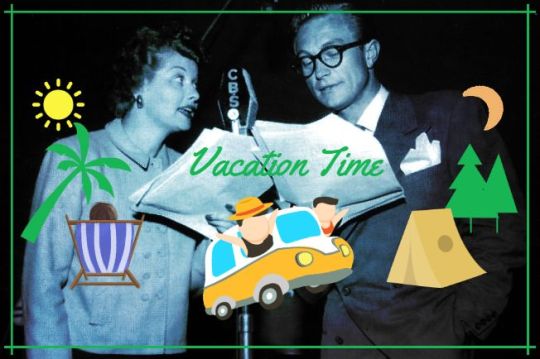
“Vacation Time” (aka “Trailer Vacation to Goosegrease Lake”) is episode #41 of the radio series MY FAVORITE HUSBAND broadcast on April 29, 1949 on the CBS radio network.
Synopsis ~ It's vacation time, and Liz and George have decidedly different plans. He wants to go camping with a trailer he borrowed from a friend, while she's set on a glamorous vacation at Moosehead Lodge.

This episode later partly inspired the premise of “Liz Learns To Swim” aired on June 11, 1950.

“My Favorite Husband” was based on the novels Mr. and Mrs. Cugat, the Record of a Happy Marriage (1940) and Outside Eden (1945) by Isabel Scott Rorick, which had previously been adapted into the film Are Husbands Necessary? (1942). “My Favorite Husband” was first broadcast as a one-time special on July 5, 1948. Lucille Ball and Lee Bowman played the characters of Liz and George Cugat, and a positive response to this broadcast convinced CBS to launch “My Favorite Husband” as a series. Bowman was not available Richard Denning was cast as George. On January 7, 1949, confusion with bandleader Xavier Cugat prompted a name change to Cooper. On this same episode Jell-O became its sponsor. A total of 124 episodes of the program aired from July 23, 1948 through March 31, 1951. After about ten episodes had been written, writers Fox and Davenport departed and three new writers took over – Bob Carroll, Jr., Madelyn Pugh, and head writer/producer Jess Oppenheimer. In March 1949 Gale Gordon took over the existing role of George’s boss, Rudolph Atterbury, and Bea Benaderet was added as his wife, Iris. CBS brought “My Favorite Husband” to television in 1953, starring Joan Caulfield and Barry Nelson as Liz and George Cooper. The television version ran two-and-a-half seasons, from September 1953 through December 1955, running concurrently with “I Love Lucy.” It was produced live at CBS Television City for most of its run, until switching to film for a truncated third season filmed (ironically) at Desilu and recasting Liz Cooper with Vanessa Brown.
MAIN CAST

Lucille Ball (Liz Cooper) was born on August 6, 1911 in Jamestown, New York. She began her screen career in 1933 and was known in Hollywood as ‘Queen of the B’s’ due to her many appearances in ‘B’ movies. With Richard Denning, she starred in a radio program titled “My Favorite Husband” which eventually led to the creation of “I Love Lucy,” a television situation comedy in which she co-starred with her real-life husband, Latin bandleader Desi Arnaz. The program was phenomenally successful, allowing the couple to purchase what was once RKO Studios, re-naming it Desilu. When the show ended in 1960 (in an hour-long format known as “The Lucy-Desi Comedy Hour”) so did Lucy and Desi’s marriage. In 1962, hoping to keep Desilu financially solvent, Lucy returned to the sitcom format with “The Lucy Show,” which lasted six seasons. She followed that with a similar sitcom “Here’s Lucy” co-starring with her real-life children, Lucie and Desi Jr., as well as Gale Gordon, who had joined the cast of “The Lucy Show” during season two. Before her death in 1989, Lucy made one more attempt at a sitcom with “Life With Lucy,” also with Gordon.
Richard Denning (George Cooper) was born Louis Albert Heindrich Denninger Jr., in Poughkeepsie, New York. When he was 18 months old, his family moved to Los Angeles. Plans called for him to take over his father’s garment manufacturing business, but he developed an interest in acting. Denning enlisted in the US Navy during World War II. He is best known for his roles in various science fiction and horror films of the 1950s. Although he teamed with Lucille Ball on radio in “My Favorite Husband,” the two never acted together on screen. While “I Love Lucy” was on the air, he was seen on another CBS TV series, “Mr. & Mrs. North.” From 1968 to 1980 he played the Governor on “Hawaii 5-0″, his final role. He died in 1998 at age 84.
Bea Benadaret (Iris Atterbury) and Gale Gordon (Rudolph Atterbury) do not appear in this episode.
Ruth Perrott (Katie, the Maid) was also later seen on “I Love Lucy.” She first played Mrs. Pomerantz (above right), a member of the surprise investigating committee for the Society Matrons League in “Pioneer Women” (ILL S1;E25), as one of the member of the Wednesday Afternoon Fine Arts League in “Lucy and Ethel Buy the Same Dress” (ILL S3;E3), and also played a nurse when “Lucy Goes to the Hospital” (ILL S2;E16). She died in 1996 at the age of 96.
Bob LeMond (Announcer) also served as the announcer for the pilot episode of “I Love Lucy”. When the long-lost pilot was finally discovered in 1990, a few moments of the opening narration were damaged and lost, so LeMond – fifty years later – recreated the narration for the CBS special and subsequent DVD release.
GUEST CAST
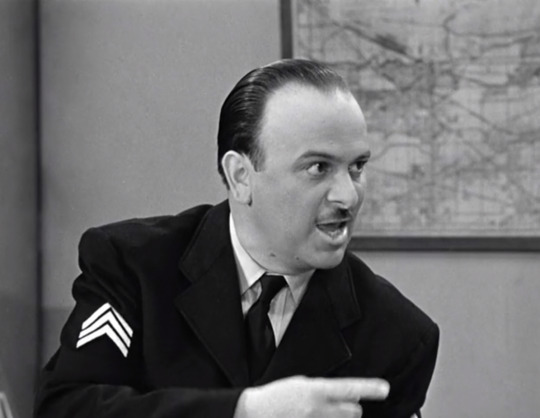
Frank Nelson (Policeman) was born on May 6, 1911 (three months before Lucille Ball) in Colorado Springs, Colorado. He started working as a radio announcer at the age of 15. He later appeared on such popular radio shows as “The Great Gildersleeve,” “Burns and Allen,” and “Fibber McGee & Molly”. This is one of his 11 performances on “My Favorite Husband.” On “I Love Lucy” he holds the distinction of being the only actor to play two recurring roles: Freddie Fillmore and Ralph Ramsey, as well as six one-off characters, including the frazzled train conductor in “The Great Train Robbery” (ILL S5;E5), a character he repeated on “The Lucy Show.” Aside from Lucille Ball, Nelson is perhaps most associated with Jack Benny and was a fifteen-year regular on his radio and television programs.

Wally Maher (Joe Risley) was born on August 4, 1908 in Cincinnati, Ohio. He was known for Mystery Street (1950), The Reformer and the Redhead (1950) and Hollywood Hotel (1937). He was heard with Lucille Ball in the Lux Radio Theatre version of “The Dark Corner” (1947), taking the role originated on film by William Bendix. He died on December 27, 1951.
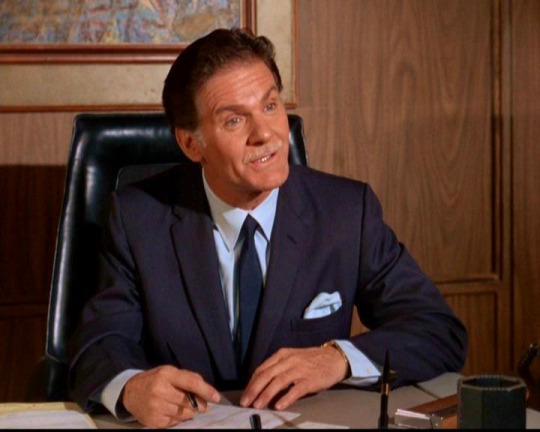
Milton Stark (Filling Station Attendant) was a theatre actor and director, who also appeared on radio and television, although usually in supporting roles. He also worked as a dialogue coach and acting teacher. At UCLA a scholarship was established in his name. He lived to the age of 103.
EPISODE
ANNOUNCER: “As we look in on the Coopers, it is a cold rainy afternoon, but Liz is in her bedroom standing in front of the mirror wearing a back-less, strapless sun dress.”
Liz calls Katie in to show off her sun dress, but Katie is disapproving that is so revealing. Liz has shopped for summer vacation clothes. Liz’s bathing suit cost’s forty dollars.
KATIE: “That’s a lot of money for two doilies and a diaper.”
Liz says that husbands only approve of scanty swimsuits when they are on any woman but their wives.
LIZ: “I want to look good for George. He’s going to see a lot of me this summer.” KATIE: “He’s not the only one!”

The topic of revealing bathing suits was later also mined for comedy on “I Love Lucy.” In “Off To Florida” (ILL S6;E6) Ricky thinks Lucy’s new skimpy new swimsuit is for Little Ricky! Lucy also buys a swimsuit that Ricky feels is too skimpy when shopping for their California trip in “Getting Ready” (ILL S4;E11)
Liz says they are going to Moosehead Lodge on Lake Okeechobee. Liz calls it a real swanky place. Katie reminds Liz that George prefers more rugged vacations. Liz says she will suggest it to George at dinner.
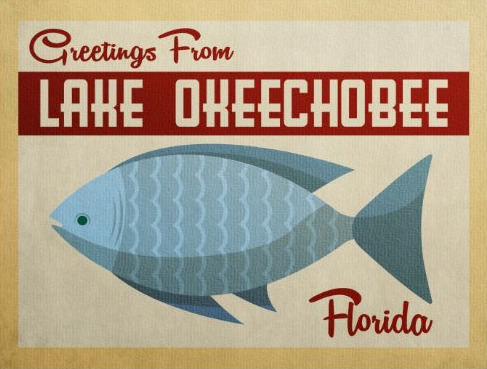
Lake Okeechobee is a real place, located in central Florida, although it is far more conducive to George’s type of vacation than Liz’s, highlighting nature through fishing and nature.

Although there are places called Moosehead Lodge in America, it unlikely that a moose would be associated with central Florida and that it would be an upscale resort of the type Liz is describing.
At the bank, George talks to his co-worker Joe about scheduling vacations. Joe says that his ideal vacation is in a trailer. If George likes the idea, he will lend the Coopers his trailer. George will suggest it to Liz at dinner.
After dinner, both Liz and George get cozy with the idea of easing the other into going on their dream destination. Liz ‘just happened’ to hear about a place that she vaguely remembers.
LIZ: “I did hear of some place called Moosehead Lodge. It’s probably situated in groves of stately pines, on the shores of an emerald green lake, its rustic beauty enhanced by lawns and flower beds. Each luxurious room is furnished with clean, comfortable box spring beds, modern bathroom and shower. Ten dollars a day, American plan. Oh, George, let’s go there. We can relax and enjoy a continual round of glorious entertainment, sports, good food, and true fellowship, see your travel agent for details.”
George realizes that Liz has been plotting a vacation. George says he has a better idea - two weeks in a trailer. Liz is less than keen. George says that they can borrow Joe Risley’s trailer!
LIZ: “Keen with mud on it.”
Liz is worried that nobody will see her new vacation wardrobe if they are cooped up in a trailer. They are at an impasse. Liz suggests they go on separate vacations. When George reluctantly agrees, she breaks down in tears.
Liz moans to Katie that she already misses George, and the vacation doesn’t begin for two months. George phones from work to talk to Liz. George offers a compromise. They will take a trial weekend trip in the trailer, and if she doesn’t like it, he will go to Moosehead Lodge!
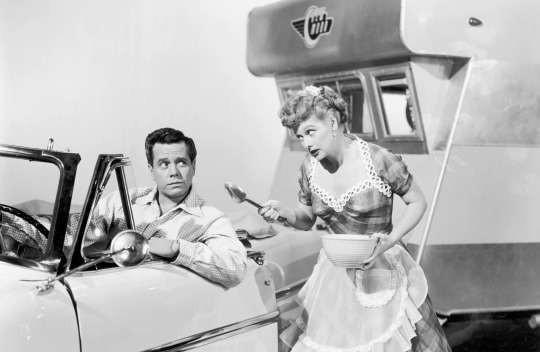
Vacationing in a trailer was explored by Lucille Ball and Desi Arnaz in their 1953 comedy MGM’s The Long Long Trailer. The film mines a lot of physical comedy from the trailer’s unwieldy movement and how Lucy’s character Tacy Bolton copes with it.
ANNOUNCER: “George is just driving up with the trailer hooked up to the back of the car.”
Liz remarks how small the trailer is.
GEORGE: “Keep an open mind.” LIZ: “I’ll have to close it or it won’t fit in that trailer.”
They tour the inside, which is smaller than Liz thought. Just then, a knock at the trailer door and there’s a policeman (Frank Nelson) issuing them a parking ticket! Forty bucks for parking illegally!
The next morning George and Liz get an early start on their trial trailer trip. Liz has brought along a little light reading for the trip: “Inside Moosehead Lodge” by Liz Gunther.
Motoring along the highway, George is enjoying the drive.
LIZ: “Travel is great. I wouldn’t go anywhere without it.”
George says it is so smooth, you wouldn’t even know the trailer is back there. Liz notices that it isn’t! George forgot to hook it on! Finally, they are off (again) to Goosegrease Lake. Liz reads one of those sequential signs along the roadside: “If Your Whiskers... Won’t Behave... Take a Tip Use....” Liz goes silent.
GEORGE: “Use what?” LIZ: “The last sign’s torn down. Now we’ll never know.”
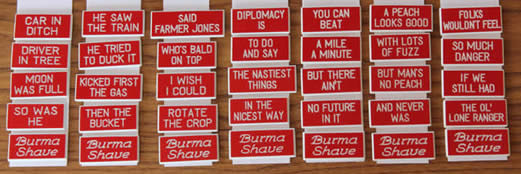
Almost everyone in the audience knew it was Burma-Shave. From 1926 until 1963 the ‘brushless’ shaving cream company dotted the American highways with small red signs, each containing a line of a short rhyme that the driver could read without slowing down as they drove by. At one time, there were over 600 different rhymes on signs!
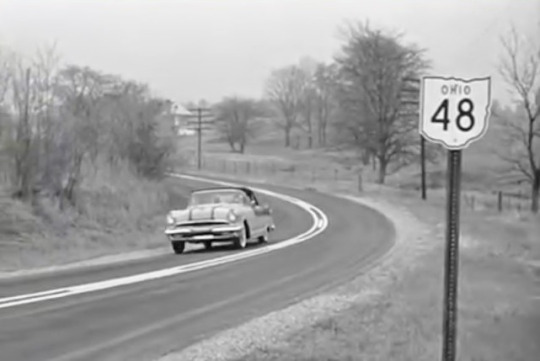
The idea was given a nod on a 1955 “I Love Lucy” episode “First Stop” (ILL S4;E14) with the roadside signs for Aunt Polly’s Pecan Pralines.
LUCY: Fifty miles to Aunt Sally’s Pecan Pralines. later... LUCY: 300 yards to Aunt Sally’s! ETHEL: 200 yards! FRED: 100 yards! RICKY: Just around the bend! LUCY: You have just passed Aunt Sally’s.
Liz is quite sure that George’s shortcut has gotten them lost. They stop to ask directions from a laid back filling station attendant (Milton Stark) who tells them they don’t want to go to Goosegrease Lake. He suggests they go to the hot springs, instead.
Oops! Milton Stark has trouble pronouncing ‘Goosegrease’ and the audience is aware of his flub. When he asks Lucille Ball “What ya gonna do there?” She deliberately says “We’re gonna goose a grease”, instead of “grease a goose”, which causes more giggles from the cast and gales of laughter from the audience.
FILLING STATION ATTENDANT: “You can’t get there from here!”

Next morning Liz wakes up and looks around. She sees beautiful green grass and a little flag with the number 18 on it! A golf ball comes crashing through the window. The policeman from who ticketed them earlier knocks on the trailer door. They have illegally camped out on the 18th green of the municipal golf course - only two miles from home! Liz said they didn’t know where they were going.
POLICEMAN: “Do you know where you’re going now?” LIZ: “Yes! To Moosehead Lodge!” POLICEMAN: “No, to the city jail! Come on!”
End of Episode
#My Favorite Husband#Lucille Ball#Richard Denning#Ruth Perrott#Bob LeMond#Frank Nelson#Wally Maher#Milton Stark#Lake Okeechobee#The Long Long Trailer#I love Lucy#Burma-Shave#1949#CBS Radio
2 notes
·
View notes
Text
KATIE & ROSCOE
November 6, 1948
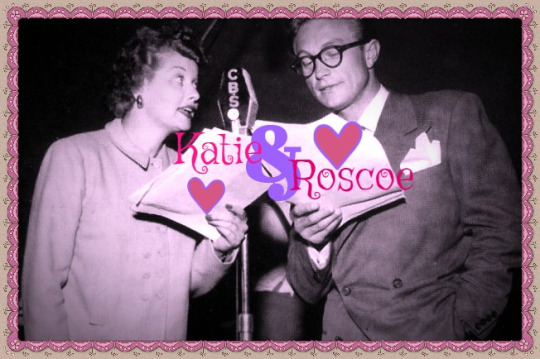
“Katie & Roscoe” is episode #17 of the radio series MY FAVORITE HUSBAND broadcast on November 6, 1948.
Synopsis ~ Katie, the Cugat's maid, has been telling her long-distance romance that she was rich. Can Liz convince Roscoe that she's the maid and Katie is her employer? It all depends on whether or not George finds out!

This script was partially used as the basis for the “I Love Lucy” episode “Mertz and Kurtz” (ILL S1;E32) first aired on October 11, 1954.
Note: This episode of “My Favorite Husband” was aired before the characters names were changed from Cugat to Cooper. It was also before Jell-O came aboard to sponsor the show and before the regular cast featured Bea Benadaret and Gale Gordon as the Atterburys.

“My Favorite Husband” was based on the novels Mr. and Mrs. Cugat, the Record of a Happy Marriage (1940) and Outside Eden (1945) by Isabel Scott Rorick, which had previously been adapted into the film Are Husbands Necessary? (1942). “My Favorite Husband” was first broadcast as a one-time special on July 5, 1948. Lucille Ball and Lee Bowman played the characters of Liz and George Cugat, and a positive response to this broadcast convinced CBS to launch “My Favorite Husband” as a series. Bowman was not available Richard Denning was cast as George. On January 7, 1949, confusion with bandleader Xavier Cugat prompted a name change to Cooper. On this same episode Jell-O became its sponsor. A total of 124 episodes of the program aired from July 23, 1948 through March 31, 1951. After about ten episodes had been written, writers Fox and Davenport departed and three new writers took over – Bob Carroll, Jr., Madelyn Pugh, and head writer/producer Jess Oppenheimer. In March 1949 Gale Gordon took over the existing role of George’s boss, Rudolph Atterbury, and Bea Benaderet was added as his wife, Iris. CBS brought “My Favorite Husband” to television in 1953, starring Joan Caulfield and Barry Nelson as Liz and George Cooper. The television version ran two-and-a-half seasons, from September 1953 through December 1955, running concurrently with “I Love Lucy.” It was produced live at CBS Television City for most of its run, until switching to film for a truncated third season filmed (ironically) at Desilu and recasting Liz Cooper with Vanessa Brown.
MAIN CAST
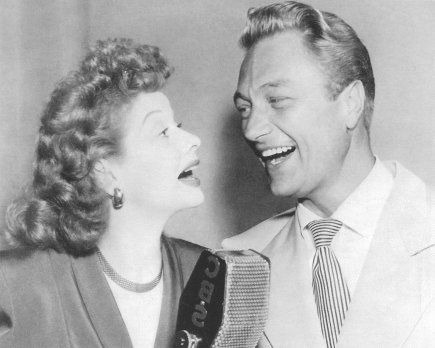
Lucille Ball (Liz Cugat) was born on August 6, 1911 in Jamestown, New York. She began her screen career in 1933 and was known in Hollywood as ‘Queen of the B’s’ due to her many appearances in ‘B’ movies. “My Favorite Husband” eventually led to the creation of “I Love Lucy,” a television situation comedy in which she co-starred with her real-life husband, Latin bandleader Desi Arnaz. The program was phenomenally successful, allowing the couple to purchase what was once RKO Studios, re-naming it Desilu. When the show ended in 1960 (in an hour-long format known as “The Lucy-Desi Comedy Hour”) so did Lucy and Desi’s marriage. In 1962, hoping to keep Desilu financially solvent, Lucy returned to the sitcom format with “The Lucy Show,” which lasted six seasons. She followed that with a similar sitcom “Here’s Lucy” co-starring with her real-life children, Lucie and Desi Jr., as well as Gale Gordon, who had joined the cast of “The Lucy Show” during season two. Before her death in 1989, Lucy made one more attempt at a sitcom with “Life With Lucy,” also with Gordon.
Richard Denning (George Cugat) was born Louis Albert Heindrich Denninger Jr., in Poughkeepsie, New York. When he was 18 months old, his family moved to Los Angeles. Plans called for him to take over his father’s garment manufacturing business, but he developed an interest in acting. Denning enlisted in the US Navy during World War II. He is best known for his roles in various science fiction and horror films of the 1950s. Although he teamed with Lucille Ball on radio in “My Favorite Husband,” the two never acted together on screen. While “I Love Lucy” was on the air, he was seen on another CBS TV series, “Mr. & Mrs. North.” From 1968 to 1980 he played the Governor on “Hawaii 5-0″, his final role. He died in 1998 at age 84.
Ruth Perrott (Katie, the Maid) was also later seen on “I Love Lucy.” She first played Mrs. Pomerantz, a member of the surprise investigating committee for the Society Matrons League in “Pioneer Women” (ILL S1;E25), as one of the member of the Wednesday Afternoon Fine Arts League in “Lucy and Ethel Buy the Same Dress” (ILL S3;E3), and also played a nurse when “Lucy Goes to the Hospital” (ILL S2;E16). She died in 1996 at the age of 96.
Bob LeMond (Announcer) also served as the announcer for the pilot episode of “I Love Lucy”. When the long-lost pilot was finally discovered in 1990, a few moments of the opening narration were damaged and lost, so LeMond – fifty years later – recreated the narration for the CBS special and subsequent DVD release.
GUEST CAST

Hans Conried (Roscoe Miller) first co-starred with Lucille Ball in The Big Street (1942). He then appeared on “I Love Lucy” as used furniture man Dan Jenkins in “Redecorating” (ILL S2;E8) and later that same season as Percy Livermore in “Lucy Hires an English Tutor” (ILL S2;E13) – both in 1952. The following year he began an association with Disney by voicing Captain Hook in Peter Pan. On “The Lucy Show” he played Professor Gitterman in “Lucy’s Barbershop Quartet” (TLS S1;E19) and in “Lucy Plays Cleopatra” (TLS S2;E1). He was probably best known as Uncle Tonoose on “Make Room for Daddy” starring Danny Thomas, which was filmed on the Desilu lot. He joined Thomas on a season 6 episode of “Here’s Lucy” in 1973. He died in 1982 at age 64.
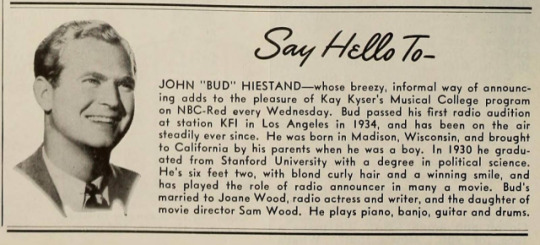
John Hiestand (Cory Cartwright) served as the announcer for the radio show “Let George Do It” from 1946 to 1950. In 1955 he did an episode of “Our Miss Brooks” opposite Gale Gordon. Cory was a regular character who was eventually written out of the series when the Atterbury’s (Gale Gordon and Bea Bendaret) were introduced.

Bea Benadaret (Lucy, Party Line Gossip) was considered the front-runner to be cast as Ethel Mertz but when “I Love Lucy” was ready to start production she was already playing a similar role on TV’s “The George Burns and Gracie Allen Show” so Vivian Vance was cast instead. On “I Love Lucy” she was cast as Lucy Ricarodo’s spinster neighbor, Miss Lewis, in “Lucy Plays Cupid” (ILL S1;E15) in early 1952. Later, she was a success in her own show, “Petticoat Junction” as Shady Rest Hotel proprietress Kate Bradley. She starred in the series until her death in 1968.

Florence Halop (Bessie, Party Line Gossip) was cast to replace Bea Benadaret in a radio show moving to CBS TV called “Meet Millie” when she was hired to play on of the two women on Lucy Ricardo’s party line in “Redecorating” (ILL S2;E8) also featuring Hans Conried. She wouldn’t work for Lucy again until 1974, when she played a Little Old Lady on a Western-themed episode of “Here’s Lucy.” In 1985, she replaced Selma Diamond (who had died of lung cancer) as the bailiff on “Night Court.” Coincidentally, Halop, also a heavy smoker, died less than a year later of the same disease.

Herb Vigran (Newspaper Collection Man / Bank Telephone Voice) made several appearances on “My Favorite Husband.” He would later play Jule, Ricky’s music union agent on two episodes of “I Love Lucy”. He would go on to play Joe (and Mrs. Trumbull’s nephew), the washing machine repairman in “Never Do Business With Friends” (S2;E31) and Al Sparks, the publicity man who hires Lucy and Ethel to play Martians on top of the Empire State Building in “Lucy is Envious” (S3;E23). Of his 350 screen roles, he also made six appearances on “The Lucy Show.”
THE EPISODE
Liz Cugat is in the kitchen doing dishes when Katie the maid comes in, worried about a boyfriend she hasn’t seen in 15 years: Roscoe Miller, a wealthy man from Kansas she’s been corresponding with. Katie has told him she was wealthy, too. Roscoe is coming to town and now Katie is worried she will be discovered as a maid, not a mistress.
To rescue Katie, Liz will pretend to be the maid, while Katie poses as Lady of the house! To accommodate the deception, Liz loans Katie her wardrobe and perfume. In the process, she tears the dress.
KATIE: “I’m just too fat for your clothes.” LIZ: “Oh, fiddle-faddle!” KATIE: “That’s just it. My fiddle’s okay, I’m just too big in the faddle.”
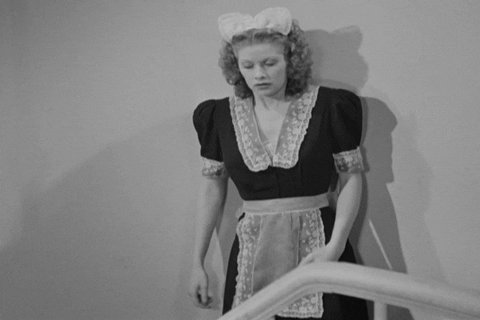
The doorbell rings and Liz goes into action as the maid to answer it. She admits the man, but it is just the newspaper collection man (Herb Vigran). After he goes, the bell rings again. It is Roscoe Miller, who doesn’t match Katie’s description at all.
Katie greets Roscoe, but instinctively doesn’t sit down, forgetting she’s no longer the maid. Roscoe is still single. Katie says she is, too, but Roscoe spots a cigar smoldering in the ashtray. Katie says it is hers! Roscoe also sees a photo of a man (George) inscribed “to my wife”! She says they are her ex-husband.
LIZ: “Pardon me, ma’am. How do you get the cream and sugar into those little tea bags?”
Katie asks Liz to explain about the ex-husband in the photo. Thinking quick, Liz says he left and has never been heard of since, taking the children with him.

LIZ: “And he took her automobile with him.” ROSCOE: “The cad!” LIZ: “No, the Buick.”
Liz continues her story, saying that he developed amnesia and is wandering the world somewhere. Katie starts to cry. Liz says his name was Adolph Jensen. When Katie starts to chime in on Liz’s story, they tell conflicting tales, confusing Roscoe. They can’t decide where she met him: bank or country club or whether it was 8 or 10 yeas ago.
The doorbell rings. It is Cory Cartwright (John Heistand). Liz enlists his help by telling him the whole story on the porch:
LIZ: “Roscoe Miller is Katie’s old boyfriend who thinks she’s married to Adolph Jensen. Adolph has amnesia because he embezzled the bank and we’ve got to get rid of Roscoe before George comes home and he finds out the truth. Now, is that clear?” CORY: “Sure. You just condensed the plot of the last three years of ‘Ma Perkins’.”

“Ma Perkins” was a radio soap opera heard on NBC from 1933 to 1949 and on CBS from 1942 to 1960. Between 1942 and 1949, the show was heard simultaneously on both networks. The series is widely credited with giving birth to storytelling and content-based advertising.
Cory agrees to help Liz by taking Roscoe downtown and drop him somewhere.
Later, the phone rings and George asks if he can bring a friend home for dinner - a new acquaintance named Roscoe Miller.
LIZ: “We’ve been held over, Katie. We’ve got to give a repeat show for the West Coast!”
This inside joke refers to the fact that live radio (and later television) shows had to be done twice to account for the time difference. Once for the East Coast and again for the West Coast. Technology would soon make such reprises unnecessary.
Katie urges Liz to call George back and tell him the truth. When she tries, the phone is being used by a party line with Lucy and Bessie gossiping non-stop.

A Party Line is a local loop telephone circuit that is shared by multiple subscribers. Party line systems were used to provide telephone service starting with the first commercial switchboards in 1878. Party lines provided no privacy and were frequently used as a source of entertainment and gossip. Objections about one party monopolizing a line were common and eavesdropping remained an ongoing concern. By the end of the 20th century, party lines had been phased out in the United States. A party line would also be featured in “Redecorating” (ILL S2;E8) where one of the gabby partiers is also played by Florence Halop!
If she can just get through on the phone, Liz will tell George she has lockjaw and can’t entertain guests. When Liz is finally able to get the women to hang up, George has already left the bank.
Cory comes back to say he’s completed his task, but Liz tells him that they’ve met up and he needs to find them and head them off.
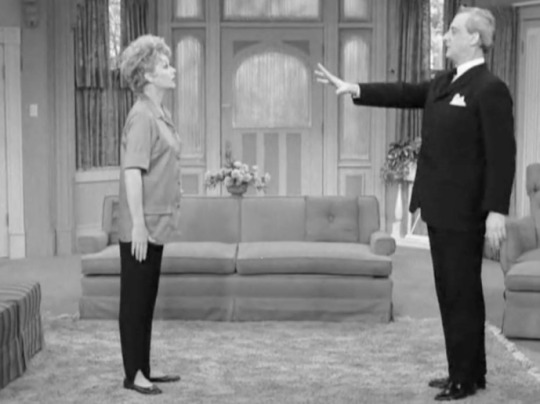
When George and Roscoe pull up to the Cugat home, Roscoe realizes George is Adolph Jensen! He tells George that he’s about to be reunited with his long-lost wife! When he opens the door, Liz and Katie both pretend George is Adolph. Roscoe asks about Adolph’s six (or seven, according to Katie) children.
George insists that he’s George Cugat, not Adolph Jensen. Saved by the (door) bell! It is Cory, answering the door Liz the maid has a moment to whisper in his ear to play along.
LIZ: “Why, Adolph! Don’t you recognize him? Your eldest son!” GEORGE: “Cory! Say something!” CORY: “Daddy!”
Later, George and Liz are relieved that everything ended well. George reports that Roscoe bought a lot of bonds from him. Liz reasons that then he can afford to buy her a new fur coat. He suddenly fiens amnesia. She does too!
LIZ: “I’m not Liz. I’m Mrs. Jensen. Give me a kiss, Adolph.”
End of Episode
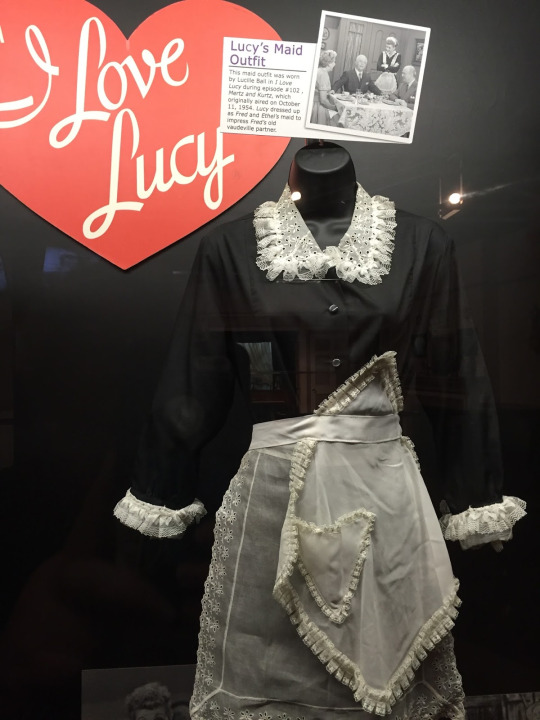
#My Favorite Husband#I Love Lucy#Lucille Ball#Richard Denning#Bea Benadaret#John Hiestand#Hans Conried#Florence Halop#Radio#Ma Perkins#Maid#Ruth Perrott#Bob Lemond#Herb Vigran#Party Line#Buick#1948
6 notes
·
View notes
Text
DINNER FOR TWELVE
October 14, 1950

“Dinner for Twelve” (aka “Liz Cooks Dinner for Twelve”) is episode #101 [some sources say #100] of the radio series MY FAVORITE HUSBAND broadcast on October 14, 1950.
This was the sixth episode of the third season of MY FAVORITE HUSBAND. There were 31 new episodes, with the season ending on March 31, 1951.
vimeo
This episode was fully animated and can be found on Vimeo. It was created by Wayne Wilson in 2012.
Synopsis ~ George has invited ten dinner guests on the maid’s day off and Liz is determined to prove to George's mother that she can prepare a dinner for twelve without any help.
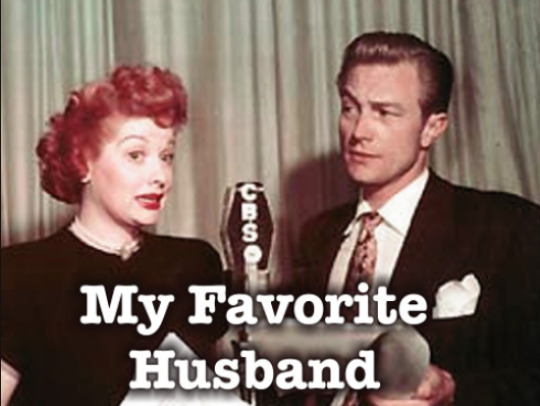
“My Favorite Husband” was based on the novels Mr. and Mrs. Cugat, the Record of a Happy Marriage (1940) and Outside Eden (1945) by Isabel Scott Rorick, which had previously been adapted into the film Are Husbands Necessary? (1942). “My Favorite Husband” was first broadcast as a one-time special on July 5, 1948. Lucille Ball and Lee Bowman played the characters of Liz and George Cugat, and a positive response to this broadcast convinced CBS to launch “My Favorite Husband” as a series. Bowman was not available Richard Denning was cast as George. On January 7, 1949, confusion with bandleader Xavier Cugat prompted a name change to Cooper. On this same episode Jell-O became its sponsor. A total of 124 episodes of the program aired from July 23, 1948 through March 31, 1951. After about ten episodes had been written, writers Fox and Davenport departed and three new writers took over – Bob Carroll, Jr., Madelyn Pugh, and head writer/producer Jess Oppenheimer. In March 1949 Gale Gordon took over the existing role of George’s boss, Rudolph Atterbury, and Bea Benaderet was added as his wife, Iris. CBS brought “My Favorite Husband” to television in 1953, starring Joan Caulfield and Barry Nelson as Liz and George Cooper. The television version ran two-and-a-half seasons, from September 1953 through December 1955, running concurrently with “I Love Lucy.” It was produced live at CBS Television City for most of its run, until switching to film for a truncated third season filmed (ironically) at Desilu and recasting Liz Cooper with Vanessa Brown.
MAIN CAST
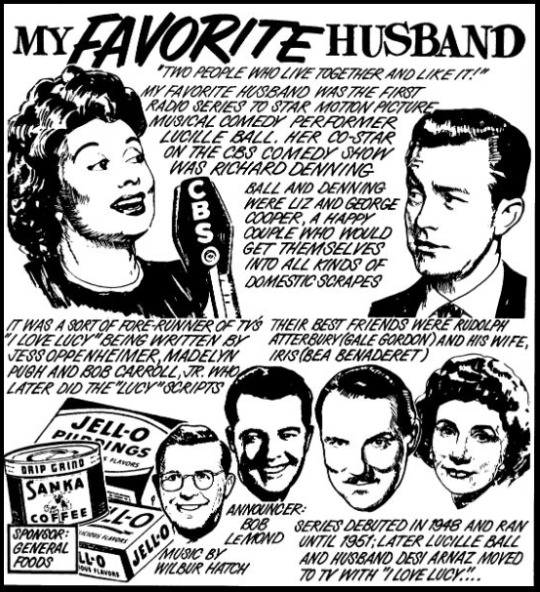
Lucille Ball (Liz Cooper) was born on August 6, 1911 in Jamestown, New York. She began her screen career in 1933 and was known in Hollywood as ‘Queen of the B’s’ due to her many appearances in ‘B’ movies. With Richard Denning, she starred in a radio program titled “My Favorite Husband” which eventually led to the creation of “I Love Lucy,” a television situation comedy in which she co-starred with her real-life husband, Latin bandleader Desi Arnaz. The program was phenomenally successful, allowing the couple to purchase what was once RKO Studios, re-naming it Desilu. When the show ended in 1960 (in an hour-long format known as “The Lucy-Desi Comedy Hour”) so did Lucy and Desi’s marriage. In 1962, hoping to keep Desilu financially solvent, Lucy returned to the sitcom format with “The Lucy Show,” which lasted six seasons. She followed that with a similar sitcom “Here’s Lucy” co-starring with her real-life children, Lucie and Desi Jr., as well as Gale Gordon, who had joined the cast of “The Lucy Show” during season two. Before her death in 1989, Lucy made one more attempt at a sitcom with “Life With Lucy,” also with Gordon.
Richard Denning (George Cooper) was born Louis Albert Heindrich Denninger Jr., in Poughkeepsie, New York. When he was 18 months old, his family moved to Los Angeles. Plans called for him to take over his father’s garment manufacturing business, but he developed an interest in acting. Denning enlisted in the US Navy during World War II. He is best known for his roles in various science fiction and horror films of the 1950s. Although he teamed with Lucille Ball on radio in “My Favorite Husband,” the two never acted together on screen. While “I Love Lucy” was on the air, he was seen on another CBS TV series, “Mr. & Mrs. North.” From 1968 to 1980 he played the Governor on “Hawaii 5-0″, his final role. He died in 1998 at age 84.
Bea Benadaret (Iris Atterbury) was considered the front-runner to be cast as Ethel Mertz but when “I Love Lucy” was ready to start production she was already playing a similar role on TV’s “The George Burns and Gracie Allen Show” so Vivian Vance was cast instead. On “I Love Lucy” she was cast as Lucy Ricardo’s spinster neighbor, Miss Lewis, in “Lucy Plays Cupid” (ILL S1;E15) in early 1952. Later, she was a success in her own show, “Petticoat Junction” as Shady Rest Hotel proprietress Kate Bradley. She starred in the series until her death in 1968.
Ruth Perrott (Katie, the Maid) was also later seen on “I Love Lucy.” She first played Mrs. Pomerantz, a member of the surprise investigating committee for the Society Matrons League in “Pioneer Women” (ILL S1;E25), as one of the member of the Wednesday Afternoon Fine Arts League in “Lucy and Ethel Buy the Same Dress” (ILL S3;E3), and also played a nurse when “Lucy Goes to the Hospital” (ILL S2;E16). She died in 1996 at the age of 96.
Bob LeMond (Announcer) also served as the announcer for the pilot episode of “I Love Lucy”. When the long-lost pilot was finally discovered in 1990, a few moments of the opening narration were damaged and lost, so LeMond – fifty years later – recreated the narration for the CBS special and subsequent DVD release.
Gale Gordon (Rudolph Atterbury, George’s boss and Iris’s husband) does not appear in this episode, although the character is mentioned.
GUEST CAST
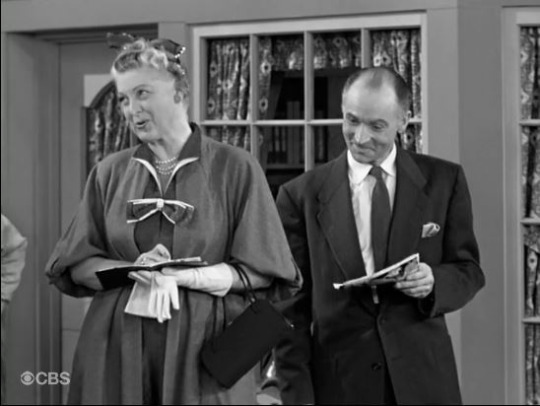
Eleanor Audley (Leaticia Cooper, George’s Mother) previously played this character in “George is Messy” on June 14, 1950. She would later play Eleanor Spalding, owner of the Westport home the Ricardos buy in “Lucy Wants To Move to the Country” (ILL S6;E15) in 1957, as well as one of the Garden Club judges in “Lucy Raises Tulips” (ILL S6;E26).
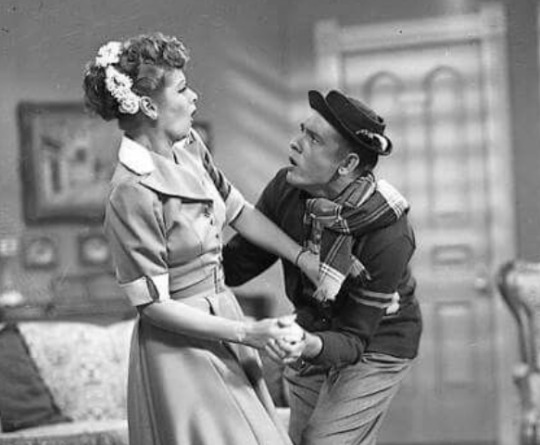
Richard Crenna (Delivery Boy) would make his television debut with Lucille Ball as Arthur Morton in “The Young Fans” (ILL S1;E20). The character is virtually a carbon copy of Walter Denton, the role he played for four years on radio’s “Our Miss Brooks” starring Eve Arden. In 1952, Desilu brought the show to television where Crenna recreated his role. He later starred in Desilu’s “The Real McCoys.” He would become one of Hollywood’s busiest actors, starring in "Vega$” and Sylvester Stallone’s Rambo films. He died in 2003.
THE EPISODE

ANNOUNCER: “In a little white two-story house located at 321 Bundy Drive in the bustling little suburb of Sheridan Falls, George Cooper is just leaving for the bank.”
Before leaving for work, George breaks the news to Liz that his mother is coming to dinner that night.
At the dinner table that evening, Mother Cooper (Eleanor Audley) is reminding her son to eat his spinach, thinking Liz is not feeding him properly. George suddenly remembers that he’s invited the Atterbury’s and some out-of-town clients to dinner on Monday night - dinner for twelve. The only problem is, Katie is going away on vacation on Sunday, so Mother Cooper suggest Liz cook the dinner herself.
Liz brags that she made the soufflé herself. Mother Cooper insists that Liz give her the recipe - right now!
LIZ: “Well, you just put all the cheese and things in a bowl. They you take a piece of ‘souff’ and put it on the top.”
Liz vows to cook dinner Monday night - all on her own. Monday morning, Liz cooks breakfast for George. The eggs are stone cold. Liz says she cooked them the night before and froze them to save time.
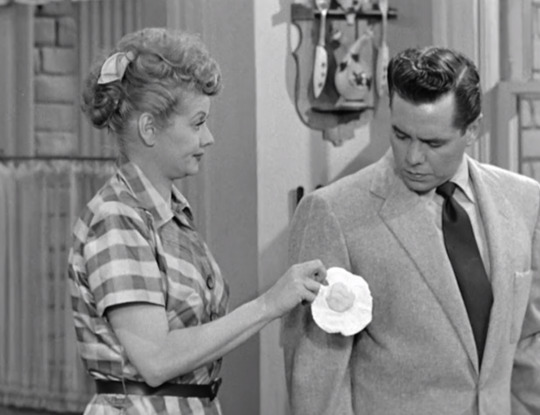
In “Lucy’s Schedule” (ILL S1;E31), to save time, Lucy prepares Ricky’s breakfast the night before and freezes it. She serves him frozen fried egg, exactly what Liz served George two years earlier!
Liz has invited Iris Atterbury over to help her cook the dinner for twelve. George leaves for work and the women repair to the kitchen to get a start on dinner. When Liz says she’s decided on chicken as the main course, Iris wonders assumes it will be broiled chicken.
LIZ (indignant): “Please! Does Oscar of the Waldorf serve broiled chicken? We are having poulet almondine.”
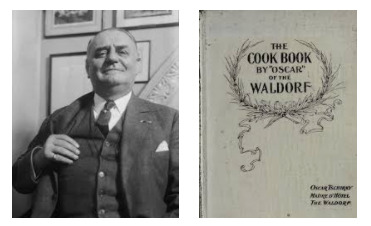
Oscar Tschirky (1866-1950) was a Swiss-American restaurateur who was maître d'hôtel of Delmonico's Restaurant and subsequently the Waldorf-Astoria Hotel in Manhattan, New York, United States. He was widely known as "Oscar of the Waldorf" and published a large cookbook. He is credited with having created the Waldorf salad, and for aiding in the popularization of the Thousand Island dressing. He died three weeks after this episode aired.
Liz realizes that she needs mushrooms but that she doesn’t have any in the house. She wonders whether she can use the mushrooms growing in the backyard. Iris points out that they may be toadstools, which are poisonous. Liz decides to use walnuts instead.
The girls peel onions for the dressing. They begin to tear-up from cutting the onions.
LIZ (tearfully): “This is the best time I’ve had in ages!” IRIS (crying): “Me too!”
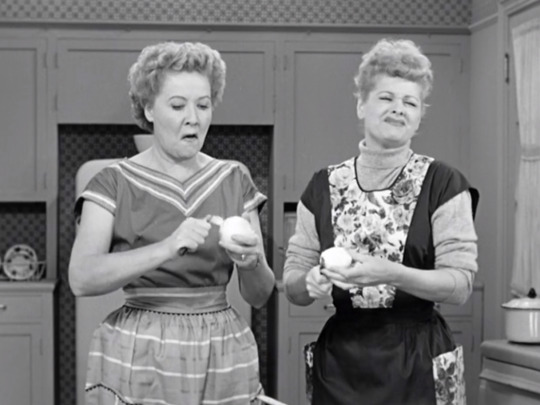
In “The Million Dollar Idea” (ILL S3;E13) in 1954, Lucy and Ethel were awash in tears when they peeled onions to make Aunt Martha’s Old Fashioned Salad Dressing.
ANNOUNCER: “As we return to the Cooper’s it’s several hours later and we find the kitchen knee deep in dirty saucepans, greasy skillets, broken eggshells, and well-thumbed cookbooks. Surveying the wreckage are Liz and Iris Atterbury.”
Iris wonders whether the chickens are ready to come out of the oven. Liz says she put them on at 9am at 600 degrees! Iris points out that they were only supposed to cook at 300 degrees.
LIZ: “I know but we have two chickens so I doubled it!” IRIS: “I never would have thought of that.”
They open the over and find their two chickens have burned to a crisp and resemble “two little lumps of charcoal with legs and wings”! Just then, Mother Cooper arrives.
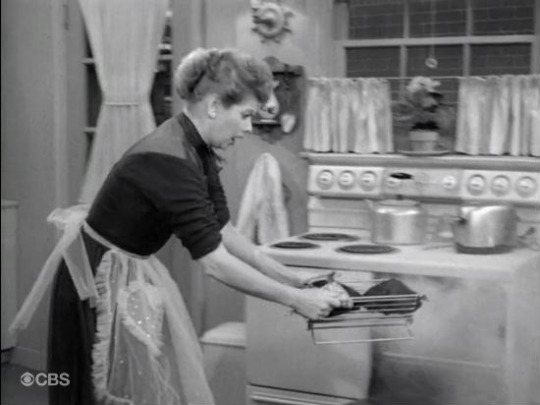
Lucy burned two chickens in “The Matchmaker” (ILL S4;E4) when preparing dinner for Sam (the spider) and Dorothy (the fly) a dating couple Lucy hopes to lure into matrimonial bliss.
Liz and Iris don’t tell Mother Cooper about the burned chickens. Chicken almandine is her favorite dish. She advises Liz on her cooking technique:
MOTHER: “You just keep your eye on them until they’re a nice crinkly brown.” IRIS: “How about a nice crusty black?”
Mother Cooper discovers that Liz has burned the dinner. They trade insults and Mother storms out in a huff. Iris promises to help Liz cook a new dinner, but first she has to go to the beauty parlor to have her hair done.
When Iris gets home from the beauty parlor she phones Liz to see how the dinner is going. Liz is dazed and confused.
LIZ: “Iris, you are talking to a woman who’s gone through eight chickens today.”
Liz reports that the pressure cooker exploded and the chickens are still on the ceiling.
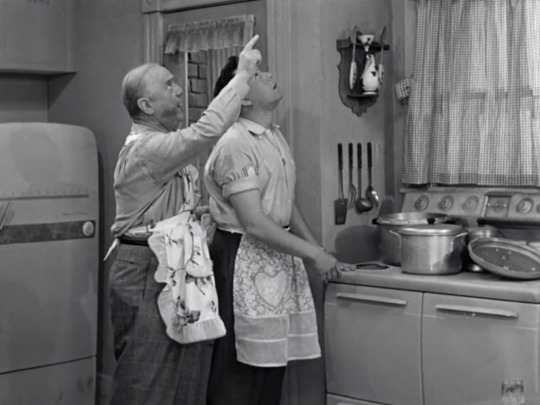
When Lucy and Ethel are working at the chocolate factory in “Job Switching” (ILL S2;E1), Ricky and Fred are cooking dinner at home. Ricky puts two chickens in the pressure cooker, which explodes and strands the birds on the ceiling!
Liz’s fifth and sixth birds were accidentally thrown in the garbage disposal. The seventh and eighth birds arrived from the butcher still alive! Iris asks Liz if she has cooked them yet.
LIZ: “Cook ‘em? I can’t even catch ‘em! When last seen, seven and eight were going east on Bundy Drive.” IRIS: “You poor thing! Eight chickens and nothing to show for it!” LIZ: “Oh, yes I have. Before she left seven laid an egg on the kitchen table.”
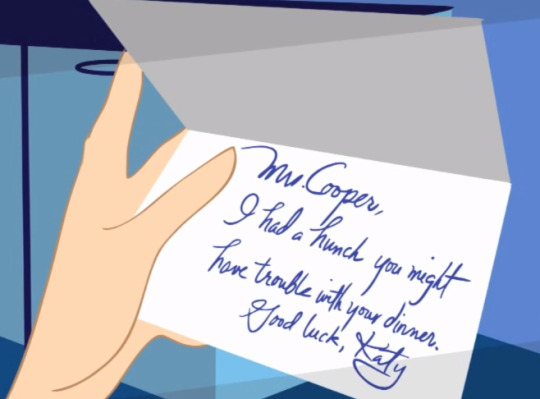
Iris tells Liz everything will be alright. Just then, a delivery boy from Johnson’s Catering Service (Dick Crenna) arrives at the Cooper’s back door with a meal for twelve: Roast prime ribs of beef, green beans, potatoes, and Yorkshire pudding. The meal was sent by Katie!
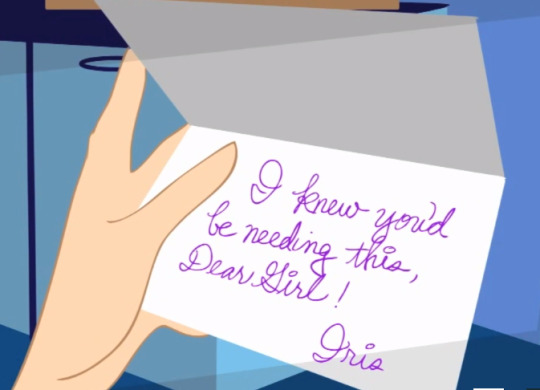
Just as she is about to call Katie to thank her, the Delivery Boy returns with another catered dinner: Lobster Thermidor with French fries and asparagus. This meal was sent over by Iris!
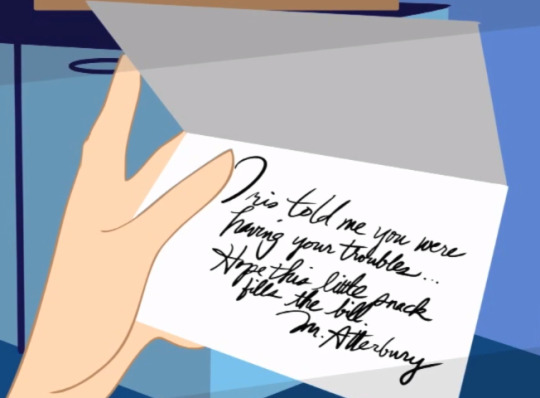
The Delivery Boy returns yet a third time! This time with Pheasant under Glass sent by Mr. Atterbury! Liz tips the boy with a bowl of Yorkshire pudding.
Oops! Yorkshire pudding is not served in a bowl. It is not a pudding in the American sense, but similar to pop-overs, designed to sop up the drippings and gravy when served with a roast beef.
The phone rings and it is Mother Cooper telling Liz that she has made a dinner for twelve and will bring it over. Liz says thanks but no thanks, and invites her to make the dinner party 13.
The phone rings once again - it is George. He has called to tell Liz that he has made a mistake. The dinner isn’t until next Monday night!
LIZ: “Oh, no!”
Announcer Bob LeMond reminds listeners that Lucille Ball can currently be seen in The Fuller Brush Girl and that they can read about her in the current issue of Pageant Magazine.
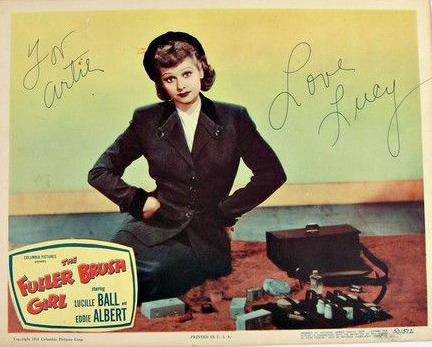
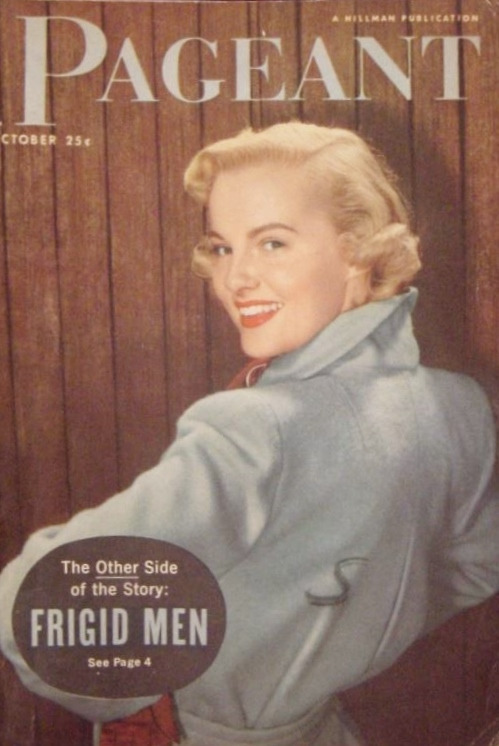
#Lucille Ball#My Favorite Husband#1950#Radio#Richard Denning#Bea Benadaret#Richard Crenna#Eleanor Audley#Bob LeMond#Ruth Perrott#I Love Lucy#The Fuller Brush Girl#Pageant Magazine#Oscar of the Waldorf#Oscar Tschirky
8 notes
·
View notes
Text
TOO MANY TELEVISION SETS
October 14, 1949

"Too Many Television Sets” (aka “Liz and George Order a Television Set” aka “Television”) is episode #58 of the radio series MY FAVORITE HUSBAND broadcast on October 14, 1949.
This was the sixth episode of the second season of MY FAVORITE HUSBAND. There were 43 new episodes, with the season ending on June 25, 1950.
Synopsis ~ Liz can't get George interested in buying a television set, until they spend an evening at the Atterburys, who have one. With his interest piqued, George arranges one be sent over on trial. Little does he know Liz has done the same thing - as have the Atterburys!
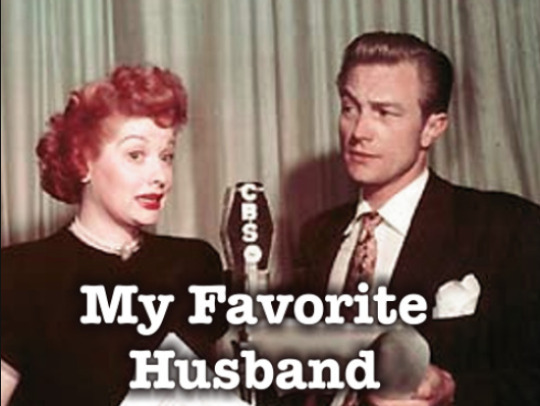
“My Favorite Husband” was based on the novels Mr. and Mrs. Cugat, the Record of a Happy Marriage (1940) and Outside Eden (1945) by Isabel Scott Rorick, which had previously been adapted into the film Are Husbands Necessary? (1942). “My Favorite Husband” was first broadcast as a one-time special on July 5, 1948. Lucille Ball and Lee Bowman played the characters of Liz and George Cugat, and a positive response to this broadcast convinced CBS to launch “My Favorite Husband” as a series. Bowman was not available Richard Denning was cast as George. On January 7, 1949, confusion with bandleader Xavier Cugat prompted a name change to Cooper. On this same episode Jell-O became its sponsor. A total of 124 episodes of the program aired from July 23, 1948 through March 31, 1951. After about ten episodes had been written, writers Fox and Davenport departed and three new writers took over – Bob Carroll, Jr., Madelyn Pugh, and head writer/producer Jess Oppenheimer. In March 1949 Gale Gordon took over the existing role of George's boss, Rudolph Atterbury, and Bea Benaderet was added as his wife, Iris. CBS brought “My Favorite Husband” to television in 1953, starring Joan Caulfield and Barry Nelson as Liz and George Cooper. The television version ran two-and-a-half seasons, from September 1953 through December 1955, running concurrently with “I Love Lucy.” It was produced live at CBS Television City for most of its run, until switching to film for a truncated third season filmed (ironically) at Desilu and recasting Liz Cooper with Vanessa Brown.
MAIN CAST
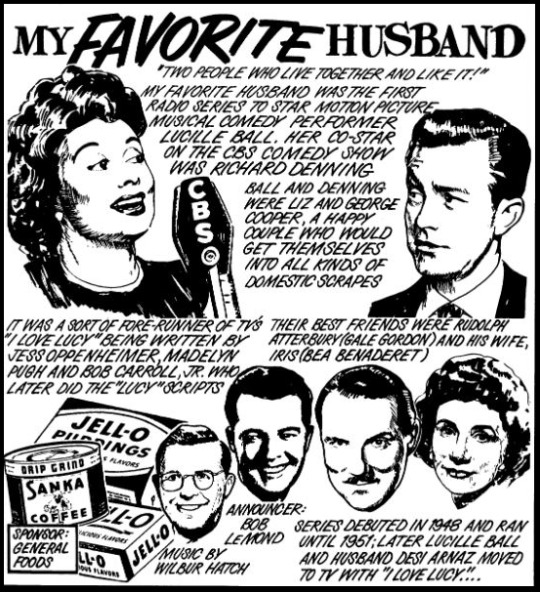
Lucille Ball (Liz Cooper) was born on August 6, 1911 in Jamestown, New York. She began her screen career in 1933 and was known in Hollywood as ‘Queen of the B’s’ due to her many appearances in ‘B’ movies. With Richard Denning, she starred in a radio program titled “My Favorite Husband” which eventually led to the creation of “I Love Lucy,” a television situation comedy in which she co-starred with her real-life husband, Latin bandleader Desi Arnaz. The program was phenomenally successful, allowing the couple to purchase what was once RKO Studios, re-naming it Desilu. When the show ended in 1960 (in an hour-long format known as “The Lucy-Desi Comedy Hour”) so did Lucy and Desi’s marriage. In 1962, hoping to keep Desilu financially solvent, Lucy returned to the sitcom format with “The Lucy Show,” which lasted six seasons. She followed that with a similar sitcom “Here’s Lucy” co-starring with her real-life children, Lucie and Desi Jr., as well as Gale Gordon, who had joined the cast of “The Lucy Show” during season two. Before her death in 1989, Lucy made one more attempt at a sitcom with “Life With Lucy,” also with Gordon.
Richard Denning (George Cooper) was born Louis Albert Heindrich Denninger Jr., in Poughkeepsie, New York. When he was 18 months old, his family moved to Los Angeles. Plans called for him to take over his father's garment manufacturing business, but he developed an interest in acting. Denning enlisted in the US Navy during World War II. He is best known for his roles in various science fiction and horror films of the 1950s. Although he teamed with Lucille Ball on radio in “My Favorite Husband,” the two never acted together on screen. While “I Love Lucy” was on the air, he was seen on another CBS TV series, “Mr. & Mrs. North.” From 1968 to 1980 he played the Governor on “Hawaii 5-0″, his final role. He died in 1998 at age 84.
Gale Gordon (Rudolph Atterbury) had worked with Lucille Ball on “The Wonder Show” on radio in 1938. One of the front-runners to play Fred Mertz on “I Love Lucy,” he eventually played Alvin Littlefield, owner of the Tropicana, during two episodes in 1952. After playing a Judge in an episode of “The Lucy-Desi Comedy Hour” in 1958, he would re-team with Lucy for all of her subsequent series’: as Theodore J. Mooney in ”The Lucy Show”; as Harrison Otis Carter in “Here’s Lucy”; and as Curtis McGibbon on "Life with Lucy.” Gordon died in 1995 at the age of 89.
Bea Benadaret (Iris Atterbury) was considered the front-runner to be cast as Ethel Mertz but when “I Love Lucy” was ready to start production she was already playing a similar role on TV’s “The George Burns and Gracie Allen Show” so Vivian Vance was cast instead. On “I Love Lucy” she was cast as Lucy Ricarodo’s spinster neighbor, Miss Lewis, in “Lucy Plays Cupid” (ILL S1;E15) in early 1952. Later, she was a success in her own show, “Petticoat Junction” as Shady Rest Hotel proprietress Kate Bradley. She starred in the series until her death in 1968.
Ruth Perrott (Katie, the Maid) was also later seen on “I Love Lucy.” She first played Mrs. Pomerantz, a member of the surprise investigating committee for the Society Matrons League in “Pioneer Women” (ILL S1;E25), as one of the member of the Wednesday Afternoon Fine Arts League in “Lucy and Ethel Buy the Same Dress” (ILL S3;E3), and also played a nurse when “Lucy Goes to the Hospital” (ILL S2;E16). She died in 1996 at the age of 96.
Bob LeMond (Announcer) also served as the announcer for the pilot episode of “I Love Lucy”. When the long-lost pilot was finally discovered in 1990, a few moments of the opening narration were damaged and lost, so LeMond – fifty years later – recreated the narration for the CBS special and subsequent DVD release.
GUEST CAST

Jay Novello (Joe Beckett, the Atterburys’ Neighbor) would appear on “I Love Lucy” as superstitious Mr. Merriweather in “The Seance" (ILL S1;E7), nervous Mr. Beecher in “The Sublease” (ILL S3;E31), and Mario the gondolier in “The Visitor from Italy” (ILL S6;E5). He also appeared on two episodes of “The Lucy Show,” but dapper Novello is probably best remembered for playing Mayor Lugatto on “McHale’s Navy” in 1965.
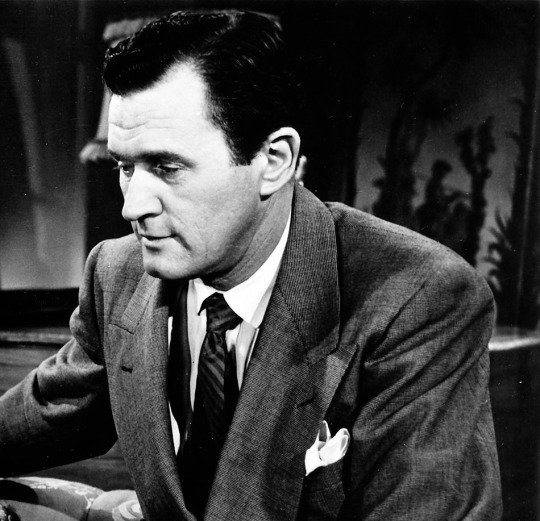
Wally Maher (Mr. Trimble) appeared on radio as the title character in the series “The Adventures of Michael Shayne, Private Detective”. In 1947 he appeared on radio with Lucille Ball in “Dark Corner”. Earlier in 1949, he was heard on “My Favorite Husband” in “Vacation Time.” He was a regular on “Let George Do It” and “Lineup” and was frequently heard on “The Cavalcade of America” and “Lux Radio Theatre.” Maher passed away in December 1951, only 43 years old.
Although the original Michael Shayne, the role was later played by Richard Denning (George Cooper).

Peter Leeds (TV Deliveryman) was born in Bayonne, NJ, and will also be heard on “My Favorite Husband in “Mother In-Law” in November 1949 and “Dance Lessons” in June 1950. He will be seen as the Reporter questioning the Maharincess of Franistan in “The Publicity Agent” (ILL S1;E31). He starred with Lucy in the films The Long, Long Trailer (1953) and The Facts of Life (1960) with Bob Hope. Coincidentally, he also appeared in “Lucy and Bob Hope” (ILL S6;E1) as well as an episode of “Here’s Lucy” in 1971.
EPISODE
ANNOUNCER: “As we look in on the Coopers, dinner is over. George Cooper is in the living room reading the paper. Liz Cooper is in the kitchen talking to Katie, the maid.”
Liz tells Katie that she has a plan to get George to buy her a television set. She is going to hold up a big glass pie plate in front of her face and pretend like she’s a television wrestler.
LIZ: “Do I look like television?” KATIE: “Well your face is all wavy and distorted.” LIZ: “I look like television alright.”
Liz enters the living room with the pie plate in front of her face, but George thinks she is a washing machine.
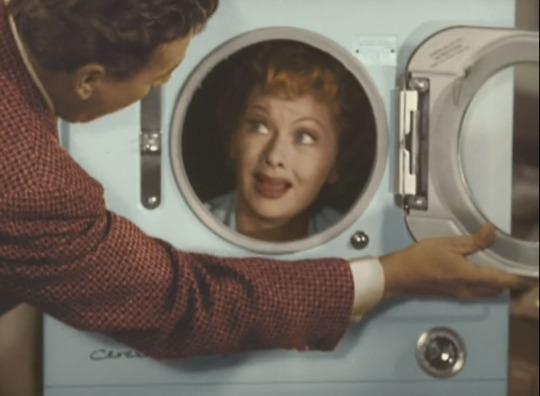
Lucille Ball actually voiced a washing machine named Lina for a Westinghouse industrial film titled “Ellis in Freedomland” (1952). In 1958, she hid inside a washing machine at the end of “Lucy Buys Westinghouse”, another industrial film for the appliance manufacturer.
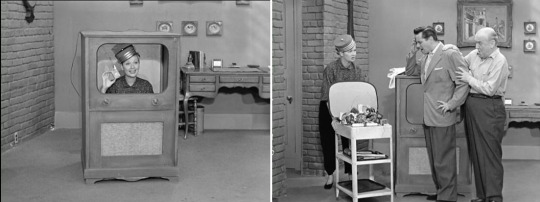
In 1952′s “Lucy Does a TV Commercial” (ILL S1;E30), Lucy Ricardo dispenses with the pie plate and disembowels her television set to look like she’s on the air! Like George, Ricky isn’t buying it.
George guesses that Liz is supposed to be a sailor looking out of a port hole, but warns her that he is not going to buy a television set, effectively ending the conversation. Liz says she is a social pariah because she doesn’t have a television set.
LIZ: “I never know who won the fights or what Kukla and Fran are doing to Ollie.”
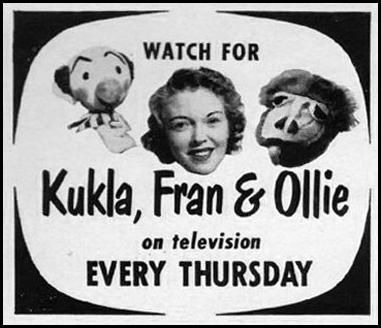
“Kukla, Fran, and Ollie” was a children’s television show created by Burr Tillstrom that aired from 1947 to 1957. Kukla and Ollie were puppets and actress Fran Allison interacted with them. The show won a 1949 Peabody Award and went on to win two Emmys.
George suggests Liz read the newspaper or listen to the radio instead.
LIZ: “Television is taking the place of the newspaper.” GEORGE: “It is, huh? Well, I’d like to see you wrap the garbage in a television set!”
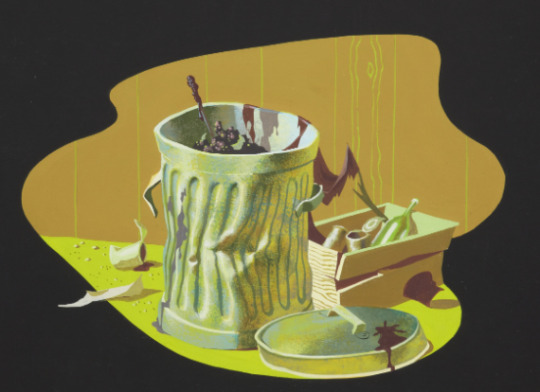
Before the advent of plastic garbage bags, food waste from the kitchen was generally wrapped in old newspapers before being deposited in the trash bin outside the home.
LIZ: “Every house on the block has an aerial. Our house looks positively naked.”

Before cable television and internet streaming, homes received television broadcast signals via an antenna (aerial) on the roof. In “Lucy Puts Up a TV Antenna” (TLS S1;E9) Lucy Carmichael decides to save the cost of an installation and erect the aerial herself - to disastrous results.
George agrees to buy the aerial - but not the television set.
LIZ: “Oh, great, that’ll fool everybody. Before we go out at night we can peel onions so our eyes will be bloodshot!”
Liz asks George to buy him an apple box instead.
LIZ: “If I have to watch it [TV] through a store window, at least I’ll have something to sit on.”
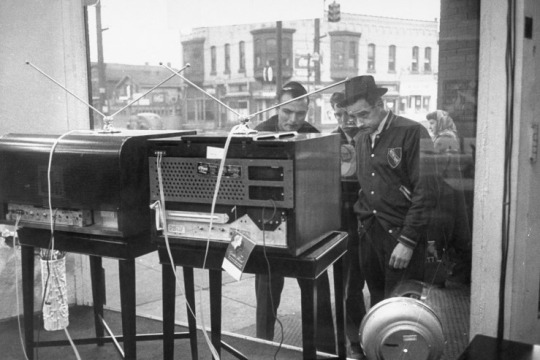
Before television sets became affordable to the general public, it was not uncommon to find people gathered in front of an appliance store window to view it from the street.
Liz answers the telephone. It is Iris, who brags about her brand new television set, which was delivered the day before.
IRIS: “I did my knitting last night with Ed Wynn; I had breakfast with Tex and Jinx; and this afternoon I took a bath with Hopalong Cassidy!”

“The Ed Wynn Show” was a variety show broadcast from September 22,1949 to July 4, 1950 on the CBS Television Network. Comedian and former vaudevillian Ed Wynn was the star of the program. Lucille Ball and Desi Arnaz made their television debut as a couple on the show on Christmas Eve 1949, just a few weeks after this episode of “My Favorite Husband”.
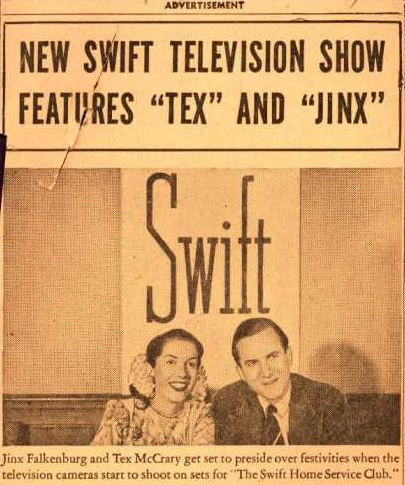
“Tex and Jinx” were Eugenia “Jinx” Falkenberg and her husband John “Tex” McCRary. The couple were popular radio hosts who began on television in January 1947.

“Hopalong Cassidy” made the leap from books and movies to the small screen on June 24, 1949, kicking off the legacy of the Western on television. These were not new, but simply cut-down versions of the feature films that were in cinemas from 1935 to 1948. The film / TV series had William Boyd in the title role. A new TV series (also starring Boyd) with newly-filmed adventures, began in 1952.
Iris’s comment about “taking a bath with Hopalong Cassidy” gets a big reaction from the “My Favorite Husband” studio audience not used to salacious innuendo.
Iris comes up with an idea to help Liz convince George to buy her a television set. She invites the Coopers to come over, where their TV will be showing a football game. George will naturally see the joys of owning a TV and give in!
Instead of Iris or Rudolph, the Atterbury’s front door is answered by their neighbor, Joe Beckett (Jay Novello), the local TVM (television moocher). He says they just missed the big brawl!
GEORGE: “Mr. and Mrs. Atterbury?” JOE: “No. The Terrible Turk and Gorgeous George!”

Wrestling matches were very popular on radio and early television, producing such colorful wrestlers as the Terrible Turk and Gorgeous George. George Raymond Wagner (1915–63), was known as Gorgeous George because of his long blonde hair. He was mentioned on “I Love Lucy” in “Pioneer Women” (ILL S1;E25) and “Ricky’s Movie Offer” (ILL S4;E6). In 1949, Republic Pictures released a film starring Gorgeous George. Laurence LeBell (1907-48) was known as Ali Alaba, The Terrible Turk, a name that was used by many wrestlers from the late 19th century onwards. He died in a car crash just weeks after this episode aired.
Joe warns the Coopers not to sit behind Iris because they only have a ten inch screen. (Liz adds that Iris has a 16″ neck.) He advises that they visit the Schraders who watch “Pantomime Quiz” and serve sandwiches. The Andersons have beer, but you have to watch Western movies.

“Pantomime Quiz” (later titled “Stump the Stars”), was a television game show hosted by Mike Stokey. Running from 1947 to 1959, it has the distinction of being one of the few television series to air on all four TV networks during the Golden Age of Television. Lucille Ball is reported to have been on the series in December 1947, which would make it her television debut.
George realizes Liz’s scheme but is insistent that he won’t watch television. When he hears a football game is on, however, he is intrigued, and decides to see “how bad it looks”.
Liz’s incessant chattering makes Mr. Atterbury miss several key plays in the game. Mr. Beckett is back but then the picture suddenly goes black! They have to imagine the game and the commercials.
ANNOUNCER: “Liz’s plan to get George interested in television has blown a fuse. Right now, Liz is on her way downtown to drown her sorrows by buying a new hat...”
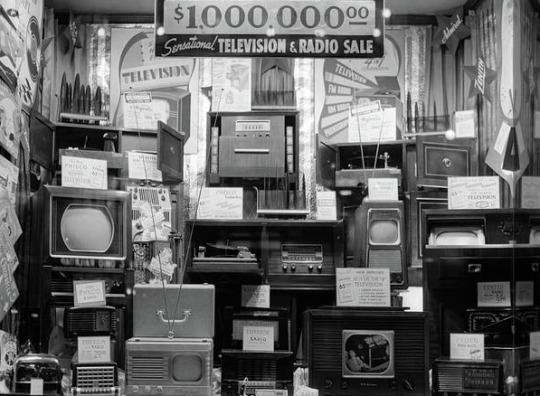
On her way down Sheridan Boulevard, Liz stops in front of a Trimble’s Appliance Store to gaze at the television in the window. An elderly man stops to chat with her about the joys of television. He convinces her to go in and ask about buying one. Of course, he turns out to be Mr. Trimble himself. She tells him to send over a set on trial.
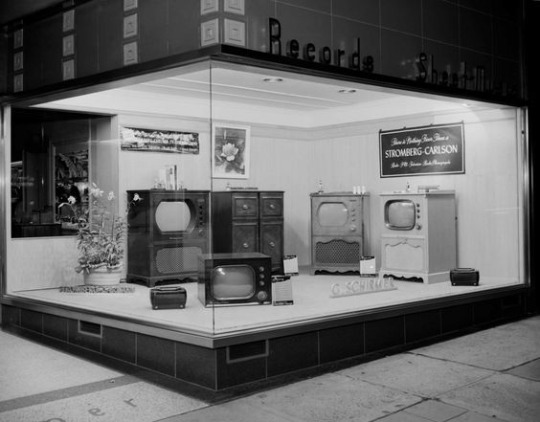
Later that day, George finds himself in front of the same store, where he encounters the same elderly man! Needless to say, Mr. Trimble is successful in selling another set to George! Mr. Trimble thinks the address sounds familiar, but isn’t sure.

Still later, the Atterburys are doing the marketing when they stop in front of Trimble’s Appliance Store. Mr. Atterbury, already having a set, is convinced to send one to George Cooper. Mr. Trimble is now positive that he’s gotten the same address three times. He thinks he is being tricked and vows that he will only send over one TV set on trial, not three.
After dinner, the Coopers decide to stay in for the evening. The doorbell rings. Unbeknownst to one another, they both are expecting a TV delivery, but instead, it is the Atterburys. A moment later the bell rings again and a deliveryman (and Mr. Beckett) is there with one new television set. Naturally, the Atterburys, Liz, and George, all think they are the ones who bought the set!
The Atterburys think the Coopers are ungrateful and they decide to leave. Rudolph tries to take the TV set with him, but the set is damaged in the tussle.
LIZ: “You’re right Iris, this IS the television set you sent out!”
This ending is reminiscent of when the Ricardos and Mertzes argue over who broke a TV set Fred and Ethel gave Lucy and Ricky as a gift. They, too, argue over ownership of the set, until it is irreparably damaged!
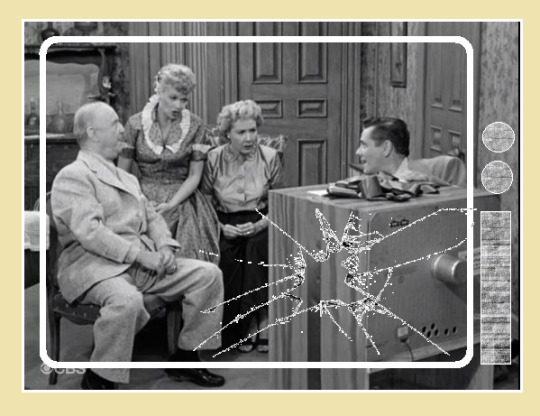
LUCY: “Look what happened to YOUR television set!”
#My Favorite Husband#Television#1949#Radio#Television Set#Pantomime Quiz#Lucille Ball#Richard Denning#Bea Benadaret#Ruth Perrott#Gale Gordon#Bob LeMond#Jay Novello#Peter Leeds#Mike stokey#Gorgeous George#The Terrible Turk#Hopalong Cassidy#Tex and Jinx#Ed Wynn#Kukla Fran and Ollie#Wally Maher
7 notes
·
View notes
Text
BABY SITTING
November 11, 1949
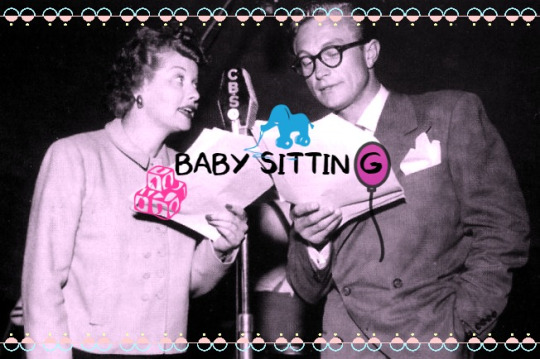
"Baby Sitting” (aka “Liz Takes Up Baby Sitting”) is episode #62 of the radio series MY FAVORITE HUSBAND broadcast on November 11, 1949, sponsored by Jell-O.
This was the tenth episode of the second season of MY FAVORITE HUSBAND. There were 43 new episodes, with the season ending on June 25, 1950.
Synopsis ~ Liz takes up baby sitting to balance her financial books and earn money for George's Christmas present.
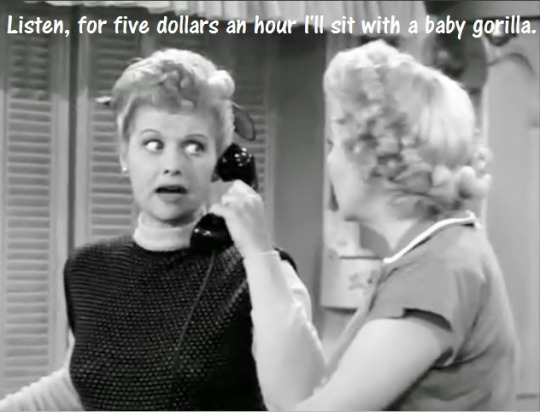
This episode shares plot elements with the “I Love Lucy” episode “The Amateur Hour” (ILL S1;E14) in 1952. Like Liz Cooper, Lucy Ricardo makes extra money by baby sitting.
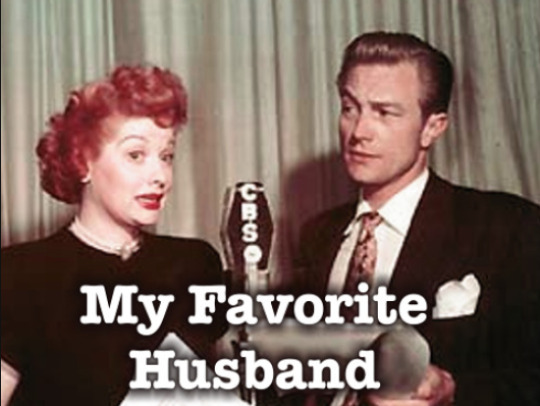
“My Favorite Husband” was based on the novels Mr. and Mrs. Cugat, the Record of a Happy Marriage (1940) and Outside Eden (1945) by Isabel Scott Rorick, which had previously been adapted into the film Are Husbands Necessary? (1942). “My Favorite Husband” was first broadcast as a one-time special on July 5, 1948. Lucille Ball and Lee Bowman played the characters of Liz and George Cugat, and a positive response to this broadcast convinced CBS to launch “My Favorite Husband” as a series. Bowman was not available Richard Denning was cast as George. On January 7, 1949, confusion with bandleader Xavier Cugat prompted a name change to Cooper. On this same episode Jell-O became its sponsor. A total of 124 episodes of the program aired from July 23, 1948 through March 31, 1951. After about ten episodes had been written, writers Fox and Davenport departed and three new writers took over – Bob Carroll, Jr., Madelyn Pugh, and head writer/producer Jess Oppenheimer. In March 1949 Gale Gordon took over the existing role of George's boss, Rudolph Atterbury, and Bea Benaderet was added as his wife, Iris. CBS brought “My Favorite Husband” to television in 1953, starring Joan Caulfield and Barry Nelson as Liz and George Cooper. The television version ran two-and-a-half seasons, from September 1953 through December 1955, running concurrently with “I Love Lucy.” It was produced live at CBS Television City for most of its run, until switching to film for a truncated third season filmed (ironically) at Desilu and recasting Liz Cooper with Vanessa Brown.
MAIN CAST

Lucille Ball (Liz Cooper) was born on August 6, 1911 in Jamestown, New York. She began her screen career in 1933 and was known in Hollywood as ‘Queen of the B’s’ due to her many appearances in ‘B’ movies. With Richard Denning, she starred in a radio program titled “My Favorite Husband” which eventually led to the creation of “I Love Lucy,” a television situation comedy in which she co-starred with her real-life husband, Latin bandleader Desi Arnaz. The program was phenomenally successful, allowing the couple to purchase what was once RKO Studios, re-naming it Desilu. When the show ended in 1960 (in an hour-long format known as “The Lucy-Desi Comedy Hour”) so did Lucy and Desi’s marriage. In 1962, hoping to keep Desilu financially solvent, Lucy returned to the sitcom format with “The Lucy Show,” which lasted six seasons. She followed that with a similar sitcom “Here’s Lucy” co-starring with her real-life children, Lucie and Desi Jr., as well as Gale Gordon, who had joined the cast of “The Lucy Show” during season two. Before her death in 1989, Lucy made one more attempt at a sitcom with “Life With Lucy,” also with Gordon.
Richard Denning (George Cooper) was born Louis Albert Heindrich Denninger Jr., in Poughkeepsie, New York. When he was 18 months old, his family moved to Los Angeles. Plans called for him to take over his father's garment manufacturing business, but he developed an interest in acting. Denning enlisted in the US Navy during World War II. He is best known for his roles in various science fiction and horror films of the 1950s. Although he teamed with Lucille Ball on radio in “My Favorite Husband,” the two never acted together on screen. While “I Love Lucy” was on the air, he was seen on another CBS TV series, “Mr. & Mrs. North.” From 1968 to 1980 he played the Governor on “Hawaii 5-0″, his final role. He died in 1998 at age 84.
Gale Gordon (Rudolph Atterbury) had worked with Lucille Ball on “The Wonder Show” on radio in 1938. One of the front-runners to play Fred Mertz on “I Love Lucy,” he eventually played Alvin Littlefield, owner of the Tropicana, during two episodes in 1952. After playing a Judge in an episode of “The Lucy-Desi Comedy Hour” in 1958, he would re-team with Lucy for all of her subsequent series’: as Theodore J. Mooney in ”The Lucy Show”; as Harrison Otis Carter in “Here’s Lucy”; and as Curtis McGibbon on "Life with Lucy.” Gordon died in 1995 at the age of 89.
Bea Benadaret (Iris Atterbury) was considered the front-runner to be cast as Ethel Mertz but when “I Love Lucy” was ready to start production she was already playing a similar role on TV’s “The George Burns and Gracie Allen Show” so Vivian Vance was cast instead. On “I Love Lucy” she was cast as Lucy Ricardo’s spinster neighbor, Miss Lewis, in “Lucy Plays Cupid” (ILL S1;E15) in early 1952. Later, she was a success in her own show, “Petticoat Junction” as Shady Rest Hotel proprietress Kate Bradley. She starred in the series until her death in 1968.
Ruth Perrott (Katie, the Maid) was also later seen on “I Love Lucy.” She first played Mrs. Pomerantz, a member of the surprise investigating committee for the Society Matrons League in “Pioneer Women” (ILL S1;E25), as one of the member of the Wednesday Afternoon Fine Arts League in “Lucy and Ethel Buy the Same Dress” (ILL S3;E3), and also played a nurse when “Lucy Goes to the Hospital” (ILL S2;E16). She died in 1996 at the age of 96.
Bob LeMond (Announcer) also served as the announcer for the pilot episode of “I Love Lucy”. When the long-lost pilot was finally discovered in 1990, a few moments of the opening narration were damaged and lost, so LeMond – fifty years later – recreated the narration for the CBS special and subsequent DVD release.
GUEST CAST
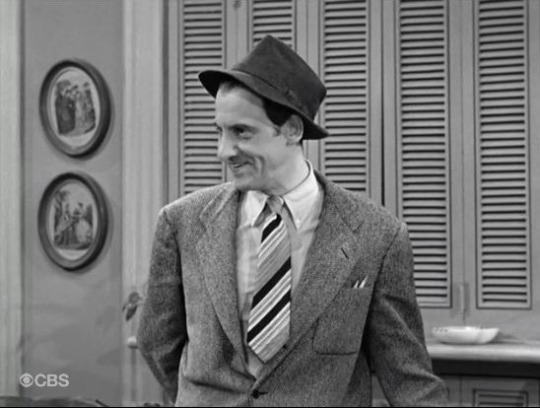
Hans Conried (Mr. Wood) first co-starred with Lucille Ball in The Big Street (1942). He then appeared on “I Love Lucy” as used furniture man Dan Jenkins in “Redecorating” (ILL S2;E8) and later that same season as Percy Livermore in “Lucy Hires an English Tutor” (ILL S2;E13) – both in 1952. The following year he began an association with Disney by voicing Captain Hook in Peter Pan. On “The Lucy Show” he played Professor Gitterman in “Lucy’s Barbershop Quartet” (TLS S1;E19) and in “Lucy Plays Cleopatra” (TLS S2;E1). He was probably best known as Uncle Tonoose on “Make Room for Daddy” starring Danny Thomas, which was filmed on the Desilu lot. He joined Thomas on a season 6 episode of “Here’s Lucy” in 1973. He died in 1982 at age 64.
Mr. Wood has eleven children: Bob, Madelyn, Adele, Lucille, Ruth, Lucius, Jessie, Walter, Jess, Joanne, and Hugo.

Jacob "Jack" Kruschen (Mr. Pearson) was a Canadian character actor who worked in film, television and radio. During the 1940s, he became a staple of West Coast radio drama. He had several roles in programs made especially for the Armed Forces Radio Service (AFRS) broadcast for the benefit of members on active duty in the military in the 1940s and 1950s. He was nominated for the Academy Award for Best Supporting Actor for his role as Dr. Dreyfuss in the 1960 comedy-drama The Apartment. He played a mechanic in The Long, Long Trailer (1954).
Mr. Pearson is the father of Tommy, the child Liz is baby sitting.
EPISODE
ANNOUNCER: “As we look in on the Coopers it’s morning. George Cooper is in the dining room eating breakfast, and Liz is hiding in the kitchen with Katie the maid.”
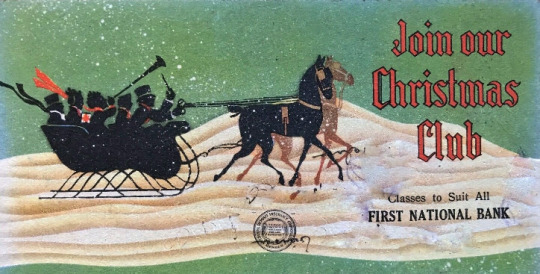
Liz is avoiding seeing George because it is the day he wants to go over their Christmas list and Liz has not put a penny in the Christmas Club account all year long! She reluctantly goes into the dining room to try the ‘smooch’ treatment on him. George wants to take half the money in the account and pay bills. Liz tries to ‘Christmas’ him out of the plan, calling him a Scrooge. He relents but that still leaves Liz with an empty Christmas Club account and a full list.

Later, Liz comes up with the idea to make fruitcake for everyone on the list. That will work for everyone except George. She wonders if she could make money with a part-time job. Since George has taken the newspaper to work with him, Liz goes next door to see Mr. Wood (Hans Conried), since four of his eleven children have paper routes. Liz arrives just as all eleven of them stamped out the door for school at the same time!
MR. WOOD: “Goodbye, Bob, Madelyn, Adele, Lucille, Ruth, Lucius, Jessie, Walter, Jess, Joanne!”
After a pause, Little Hugo also scampers by making eleven. These are the names of some of the staff of My Favorite Husband.
Bob LeMond (Announcer)
Madleyn Pugh (Writer)
Adele is the name often ascribed to Liz’s Mother, Mrs. Elliott
Lucille Ball (Liz Cooper)
Jess Oppenheimer (writer)
Ruth Perrott (Katie the Maid
Mr. Wood says the morning (and evening) stampede can be hazardous since someone has a sharp propeller on his atomic beanie.

Atomic Beanies were previously known as propeller hats. In the 1940s they became a big hit with kids and were widely sold. The word atomic was adopted just a few years after the detonation of the first atomic bomb.
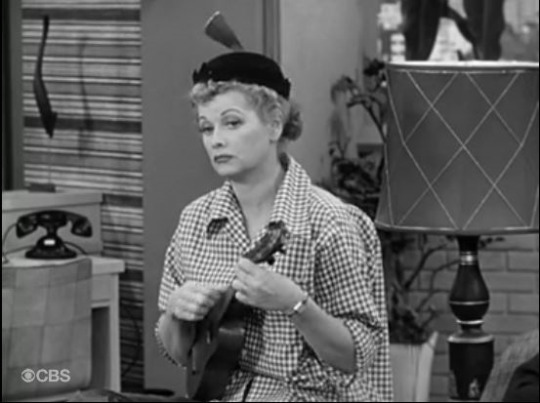
Lucy Ricardo wore one in “Don Juan is Shelved” (ILL S4;E22) in 1955.
Mr. Wood suggests she try to take his daughter Adele’s old job - baby sitting! Liz dresses up to go on her first baby sitting assignment to take care of Tommy Pearson, who is a sure shot with a pea shooter! She tells George she is going to a lecture with Iris Atterbury.
Twenty minutes later, George is pacing the living room without Liz. He figures if Liz is with Iris, Rudolph is available to go to a movie. Iris picks up the phone and knows nothing about the lecture - until she suddenly realizes Liz has lied to George and covers her tracks. But too late! The cat is out of the bag and both wonder where Liz can be!

After a commercial for Jell-O, the story resumes with Liz arriving home from babysitting, driven by Mr. Pearson, Tommy’s father (Jack Kruschen). George is waiting up for her to ask her about the lecture. Liz lies and says the lecture was about financial matters.
LIZ: “He said not to put your money in fiscals this year. The frost ruined them all.”
About the British pound:
LIZ: “It’s being invalidated. It won’t be long before the pound only weighs eight ounces. It makes easier to carry their money around.”
George finally confronts her that he knows there was no lecture. Liz can’t tell him where she really was, so George assumes that he has a rival. Liz, having no other choice, plays along.
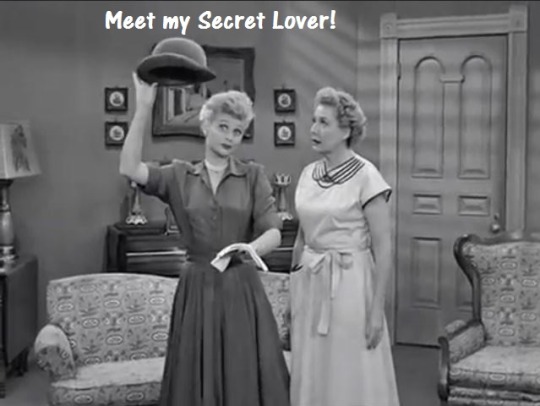
George spends the night sleeping on the couch. Liz fills Katie in on George’s misapprehension, enjoying the fun. Iris phones and asks Liz about ‘the other man’ in her life. Liz denies there is another man and Iris assumes she is lying to her!
George seeks advice from his boss, Mr. Atterbury, who suggest he fight fire with fire and pretend he is in love with another woman. George thinks it might work and is determined to try it.
Next day Liz is ready to leave to baby sit and George acts unbothered. Liz is bewildered by his behavior. He says that he is doing the same thing. Liz accuses him of making it up. To prove it, he makes a phone call to Mr. Atterbury, pretending it is his old girlfriend Helen. Mr. Atterbury plays along, but luckily Liz can’t hear his voice - just the radio listeners. Liz storms out angry.
Mr. Pearson leaves for the day and George is at the door to confront him - thinking he is Liz’s lover! He knocks him out! Liz tells him the truth.
LIZ: “You just punched yourself out of a Christmas present!”
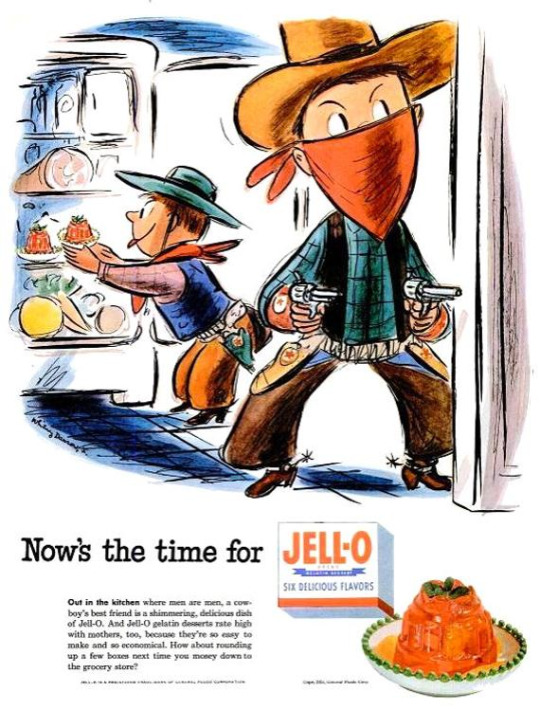
In the live Jell-O commercial Lucy and Bob LeMond adopt a western theme. Hopalong Lucidy is tracking down the notorious Jell-O family.
LUCIDY: “Yippe-yi-o-ky-ah!”
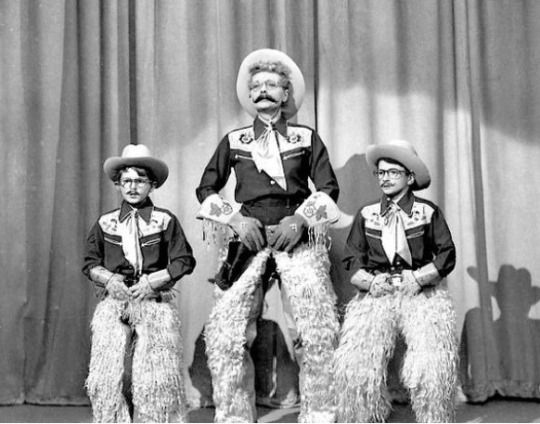
Coincidentally, when Lucy Ricardo babysits in “The Amateur Hour” (ILL S1;E14) the song she performs with the Hudson Twins is also a western.
After the commercial Bob LeMond does a PSA for CARE, who are sending food packages to impoverished people overseas. There is also a commercial for Log Cabin Syrup, another General Foods product.
#My Favorite Husband#Lucille Ball#Babysitting#Richard Denning#Ruth Perrott#Bea Benadaret#Gale Gordon#Jello#Jack Kruschen#I Love Lucy#Amateur Hour#Atomic Beanie#Bob LeMond#Christmas Club
5 notes
·
View notes
Text
SPEECH FOR CIVIC ORGANIZATION
February 4, 1949
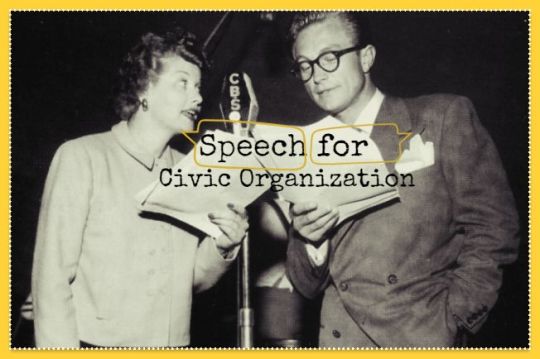
“Speech for Civic Organization” (aka “Liz Debates Alaska in Town Forum”) is episode #29 of the radio series MY FAVORITE HUSBAND broadcast on February 4, 1949 on the CBS radio network.
Synopsis ~ Liz, anxious to win the approval of an important dinner guest, simply agrees with everything he says. The guest is so impressed with her intelligence that he invites her to be a speaker at his next civic forum.

“My Favorite Husband” was based on the novels Mr. and Mrs. Cugat, the Record of a Happy Marriage (1940) and Outside Eden (1945) by Isabel Scott Rorick, which had previously been adapted into the film Are Husbands Necessary? (1942). “My Favorite Husband” was first broadcast as a one-time special on July 5, 1948. Lucille Ball and Lee Bowman played the characters of Liz and George Cugat, and a positive response to this broadcast convinced CBS to launch “My Favorite Husband” as a series. Bowman was not available Richard Denning was cast as George. On January 7, 1949, confusion with bandleader Xavier Cugat prompted a name change to Cooper. On this same episode Jell-O became its sponsor. A total of 124 episodes of the program aired from July 23, 1948 through March 31, 1951. After about ten episodes had been written, writers Fox and Davenport departed and three new writers took over – Bob Carroll, Jr., Madelyn Pugh, and head writer/producer Jess Oppenheimer. In March 1949 Gale Gordon took over the existing role of George’s boss, Rudolph Atterbury, and Bea Benadaret was added as his wife, Iris. CBS brought “My Favorite Husband” to television in 1953, starring Joan Caulfield and Barry Nelson as Liz and George Cooper. The television version ran two-and-a-half seasons, from September 1953 through December 1955, running concurrently with “I Love Lucy.” It was produced live at CBS Television City for most of its run, until switching to film for a truncated third season filmed (ironically) at Desilu and recasting Liz Cooper with Vanessa Brown.
REGULAR CAST

Lucille Ball (Liz Cooper) was born on August 6, 1911 in Jamestown, New York. She began her screen career in 1933 and was known in Hollywood as ‘Queen of the B’s’ due to her many appearances in ‘B’ movies. With Richard Denning, she starred in a radio program titled “My Favorite Husband” which eventually led to the creation of “I Love Lucy,” a television situation comedy in which she co-starred with her real-life husband, Latin bandleader Desi Arnaz. The program was phenomenally successful, allowing the couple to purchase what was once RKO Studios, re-naming it Desilu. When the show ended in 1960 (in an hour-long format known as “The Lucy-Desi Comedy Hour”) so did Lucy and Desi’s marriage. In 1962, hoping to keep Desilu financially solvent, Lucy returned to the sitcom format with “The Lucy Show,” which lasted six seasons. She followed that with a similar sitcom “Here’s Lucy” co-starring with her real-life children, Lucie and Desi Jr., as well as Gale Gordon, who had joined the cast of “The Lucy Show” during season two. Before her death in 1989, Lucy made one more attempt at a sitcom with “Life With Lucy,” also with Gordon.
Richard Denning (George Cooper) was born as Louis Albert Heindrich Denninger Jr., in Poughkeepsie, New York. When he was 18 months old, his family moved to Los Angeles. Plans called for him to take over his father’s garment manufacturing business, but he developed an interest in acting. Denning enlisted in the US Navy during World War II. He is best known for his roles in various science fiction and horror films of the 1950s. Although he teamed with Lucille Ball on radio in “My Favorite Husband,” the two never acted together on screen. While “I Love Lucy” was on the air, he was seen on another CBS TV series, “Mr. & Mrs. North.” From 1968 to 1980 he played the Governor on “Hawaii 5-0″, his final role. He died in 1998 at age 84.
Ruth Perrott (Katie, the Maid) was also later seen on “I Love Lucy.” She first played Mrs. Pomerantz (above right), a member of the surprise investigating committee for the Society Matrons League in “Pioneer Women” (ILL S1;E25), as one of the member of the Wednesday Afternoon Fine Arts League in “Lucy and Ethel Buy the Same Dress” (ILL S3;E3), and also played a nurse when “Lucy Goes to the Hospital” (ILL S2;E16). She died in 1996 at the age of 96.
Bob LeMond (Announcer) also served as the announcer for the pilot episode of “I Love Lucy”. When the long-lost pilot was finally discovered in 1990, a few moments of the opening narration were damaged and lost, so LeMond – fifty years later – recreated the narration for the CBS special and subsequent DVD release.
Gale Gordon (Rudolph Atterbury) and Bea Benadaret (Iris Atterbury) had not yet joined the cast as regular characters.
GUEST CAST

Frank Nelson (Mr. Barton) was born on May 6, 1911 (three months before Lucille Ball) in Colorado Springs, Colorado. He started working as a radio announcer at the age of 15. He later appeared on such popular radio shows as “The Great Gildersleeve,” “Burns and Allen,” and “Fibber McGee & Molly”. This is one of his 11 performances on “My Favorite Husband.” On “I Love Lucy” he holds the distinction of being the only actor to play two recurring roles: Freddie Fillmore and Ralph Ramsey, as well as six one-off characters, including the frazzled train conductor in “The Great Train Robbery” (ILL S5;E5), a character he repeated on “The Lucy Show.” Aside from Lucille Ball, Nelson is perhaps most associated with Jack Benny and was a fifteen-year regular on his radio and television programs.
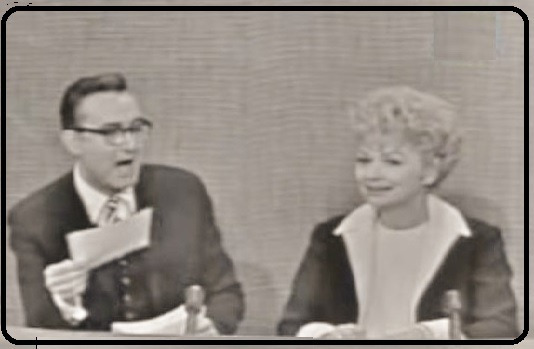
Steve Allen (Scott Campbell, Expert on Alaska) was a talk show and variety host as well as a published composer. Although he was seen with Lucille Ball on awards and quiz shows, their first time acting together on screen didn’t come until 1978′s “Lucy Calls The President”. In 1980, Ball appeared on the premiere of “The Steve Allen Comedy Hour”. He died in 2000 at age 78.
TRIVIA: Madelyn Pugh and Bob Carroll Jr. were writers for the Steve Allen radio show and left that job to write for “My Favorite Husband.” They paid Allen to write his own show one week so they could focus on creating a script submission for “My Favorite Husband.”
EPISODE
ANNOUNCER: “As we look in on the Coopers tonight, they’ve settled down for a quiet evening at home. Liz has discovered an intelligence quiz in a magazine, but she’s having George’s attention, because he is lost in a gripping, blood-curdling murder mystery.”
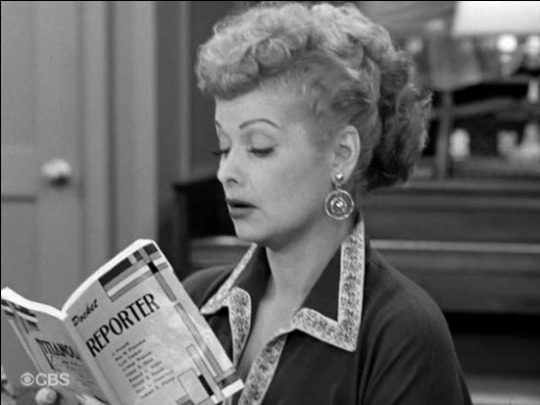
George is reading “The Mummy’s Tummy” but Liz spoils the ending to get his attention. George can’t seem to answer any of the IQ questions correctly.
Q: “What is the name for the chemical formula H2S04?”
A: Sulfuric Acid
Q: “What does it say on the lid of a United States mailbox?”
A: Pull Down
Q: “For what was Ma Ferguson noted?”
A: The first woman Governor of Texas
George decides to quiz Liz, asking her a few questions.
Q: “What is the poop deck of the ship?”
Liz’s Answer: “The deck where the sailor’s rest when they’re pooped.”
Real Answer: “A raised portion of the rear deck.”
Q: “Does sound travel faster or slower in water than it does in air?”
Liz’s Answer: “Next question.”
Q: “Chicle is the main ingredient in chewing gum. Where is the largest deposit found?”
Liz’s Answer: “Under theatre seats.”
Liz realizes that they aren’t very smart and should probably do something about it. Dr. Guilfoyle, author of the quiz, suggests that a score under 50 needs to be addressed.
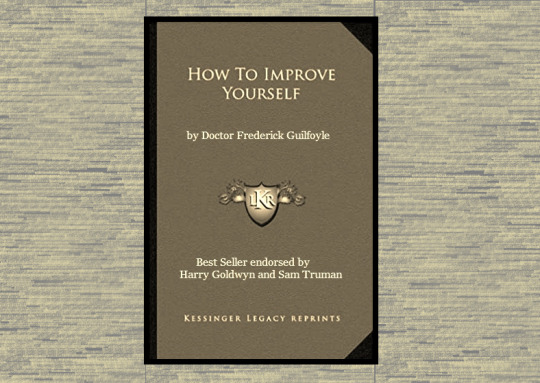
Liz is going to send for his book “How To Improve Yourself.”
LIZ: “Look at the people who recommend this book: Truman and Goldwyn.” GEORGE: “Harry Truman and Sam Goldwyn?” LIZ: “No, Sam Truman and Harry Goldwyn!”

Harry Truman (1884-1972) was the 33rd president of the United States from 1945 to 1953, succeeding Franklin D. Roosevelt after his death. He implemented the Marshall Plan to rebuild the economy of Western Europe, and established the Truman Doctrine and NATO. Sam Goldwyn (1879 -1974) was a film producer best known as the founder of several motion picture studios in Hollywood.
A few days later, the book has arrived and Katie the Maid notices Liz is engrossed in it. Liz states that the Doctor has three rules to impress people:
Learn Ten New Words a Day
Be a Good Listener
Have One Subject Down Cold So You Can Steer The Conversation Around To It
Liz’s has already got her ten new words and has put them in a sentence.
LIZ: “By assiduous application, I have promulgated a plethora of altruistic ubiquity and lugubrious perspicacity.”
The telephone rings, it is George telling Liz he is bringing home an important person named Mr. Barton, to dinner.
LIZ: “How important is he, George? Sirloin, T-bone, meatloaf, or hash?” GEORGE: “Strictly sirloin.”
George explains that Mr. Barton is the one who picks the speakers for the open forums in town. George wants to get picked to be one of the first speakers so he can impress his boss, Mr. Atterbury, and possibly land a raise. George warns Liz to be herself and not try to impress him.
Liz decides to enact rule #3 and cracks open an encyclopedia to pick the subject. Much to her surprise, the subject she randomly picks is bees! Walking up to the house that evening, Mr. Barton (Frank Nelson) confides in George that he is looking forward to meeting a simple housewife, since in his line of work the women are always trying too hard to impress him with their intellect. George introduces Liz to Mr. Barton, who immediately notices that her vocabulary is amped up. Unfortunately, Liz is using the wrong words most of the time, saying ‘plethora’ for ‘pleasure’ and ‘diversify yourself’ for ‘divert yourself.’
George assures a nervous Mr. Barton that Liz is ‘just an old fashioned girl’.
MR. BARTON: “Sounds like she’s had too many Old- Fashioneds!”
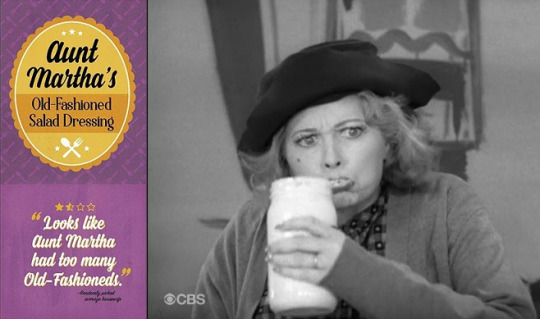
An Old Fashioned is a cocktail made by mixing sugar with bitters and water, adding whiskey or brandy, and garnishing with orange zest and a cocktail cherry. It is traditionally served in a special glass called an Old Fashioned glass. A variation on this wordplay was used on “I Love Lucy” in “Million Dollar Idea” (ILL S3;E13) in 1954 when Lucy (disguised as an average housewife selected at random) describes the taste of Aunt Martha’s Old Fashioned Salad Dressing to deliberately encourage buyers to cancel.
LUCY: “Looks like Aunt Martha had too many Old-Fashioneds!”
In the kitchen, George tells Liz to stop using fancy words, so Liz moves on to rule #3 - her special subject: bees! She no sooner starts buzzing about bees when she is chided by George.
GEORGE (sternly aside): “Liz! Haven’t you forgotten? Mr. Barton’s forum!” LIZ: “Well, I’m for ‘em, too!”

Coincidentally, Lucille Ball was one of several actors known as ‘Queen of the ‘B’s’ - which referred to ‘B’ pictures - films that were done quickly, on a budget, with lesser-known actors. In 1963′s “Lucy’s Barbershop Quartet” (TLS S1;E19) Lucy suggests they sing about bees!
Mr. Barton tells George he is going to sponsor a Shakespearean Company, if they can convince the City Council to fund them.
LIZ: “To bee or not to bee!”
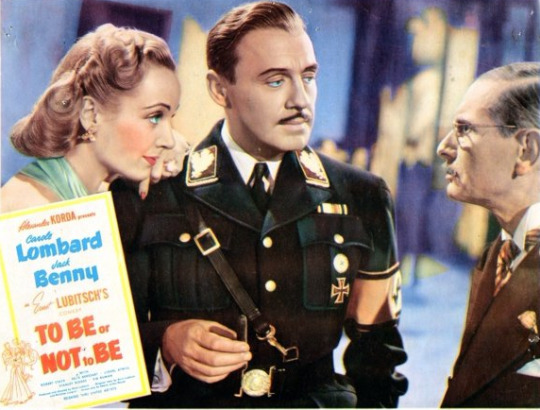
"To be, or not to be" is the opening of a soliloquy by Prince Hamlet in William Shakespeare's play Hamlet, Act 3, Scene 1. In the speech, Hamlet contemplates death and suicide. It is one of the most quoted phrases in all of literature. To Be or Not to Be is a also the title of a 1942 film starring Lucille Ball’s good friend Carole Lombard and Jack Benny, who later became her next door neighbor. The plot concerns a troupe of actors in Nazi-occupied Poland. The film was released one month after Lombard was killed in an airplane crash.
George drags Liz into the hall again, warning her to stop talking about bees! After telling him to “mind his own beeswax”, Liz reluctantly agrees just to listen attentively and agree with everything Mr. Barton says. This works so well, that Mr. Barton barely acknowledges George, but only talks to Liz! He is so impressed by Liz, he offers to have her on the panel of their very first forum on Saturday night! She instantly agrees!
Two days later she learns that the forum’s topic is “the effect of jet propulsion and supersonic flight on the future of aviation.” But Liz is un-phased. She has been preparing by buying a new dress, which she tells George has ‘a dive bomb neckline.’
George and Liz role play to prepare for the forum. Against George’s advice, Liz intends to talk about the Wright Brothers!
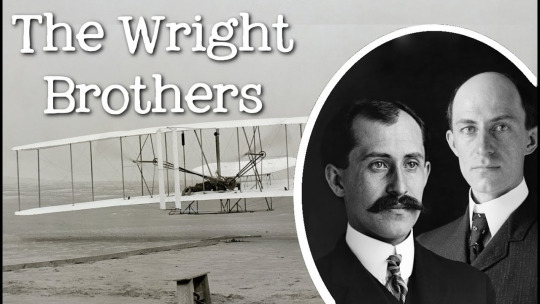
Orville and Wilbur Wright were inventors and pioneers of aviation. In 1903 the Wright brothers achieved the first powered, sustained and controlled airplane flight; they surpassed their own milestone two years later when they built and flew the first fully practical airplane.
At the meeting that night, Mr. Barton announces to the assembled crowd that their aviation expert, Colonel Davis, could not make it.
MR. BARTON: “He started her from Los Angeles, but he got slightly mixed up in a snowstorm and has just cabled us from Bombay, India.”

Bombay, India is the capital city of the Indian state of Maharashtra. It was formerly renamed Mumbai in 1995 to better reflect the city’s roots and cut ties with its British origins. Coincidentally, a few months after this broadcast, the 1942 film Bombay Clipper was re-released. Although the Lucy gang never traveled to Bombay, it was mentioned in 1955′s “The Hedda Hopper Story” (ILL S4;E21) when everyone was looking for Mrs. McGillicuddy.
RICKY (Into phone): “Do you have any flights numbered 930? You do? Where's it coming in from? Bombay?” LUCY: “Bombay?” RICKY: “Well knowing your mother... No, even she wouldn't fly from New York to Los Angeles by way of India.”
Instead, Mr. Barton announces that the guest speaker is a famous authority on Alaska, Mr. Scott Campbell (Steve Allen). Unfortunately, Liz knows nothing about Alaska - so she starts to talk about the Wright Brothers instead!

In 1949 Alaska was not yet one of the United States, but was a US territory. The statehood movement gained its first real momentum in 1946 and Alaska was officially proclaimed a state on January 3, 1959. To mark this event, Desilu created a special episode of “The Westinghouse Desilu Playhouse” in which the Ricardos and Mertzes travel to Nome to cash in on a land deal, although no actual filming was done in the 49th state.
In 1952’s “Lucy Gets Ricky on the Radio” (ILL S1;E32) Lucy presciently (but incorrectly) answers the question “What was the last state to be admitted to the union?” by saying Alaska. At the time, the correct answer to the question was Arizona, admitted on Valentine’s Day 1912.
MR. BARTON: “No! When are you going to get to Alaska?” LIZ: “Let me get the plane invented and I’ll fly up there!”
With nothing else to talk about, Liz starts to talk about bees, but Mr. Barton quickly cuts her off and turns the podium over to Mr. Campbell, who launches into a serious speech about the welfare of the children of Alaska. He suddenly turns to Liz and asks “Who is responsible for these children, Mrs. Cooper?”
LIZ: “You really want me to answer that? Wilbur and Orville Wright!”
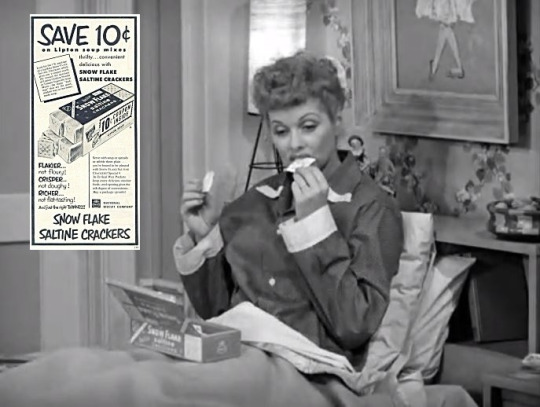
In the bedtime tag, it is 4 o’clock in the morning and Liz is eating crackers in bed. Wrestling them away from her, George gets cracker crumbs all over the bed. A few seconds later, Liz is eating an apple! George takes it from her. He hears her eating a third time and goes to grab whatever it is away from her.
GEORGE: “Whoah! What was that!” LIZ: “A glass of cold milk. Goodnight, George.”
End of Episode
Bob LeMond reminds listeners that Lucille Ball will soon be seen in the Paramount Picture Sorrowful Jones.
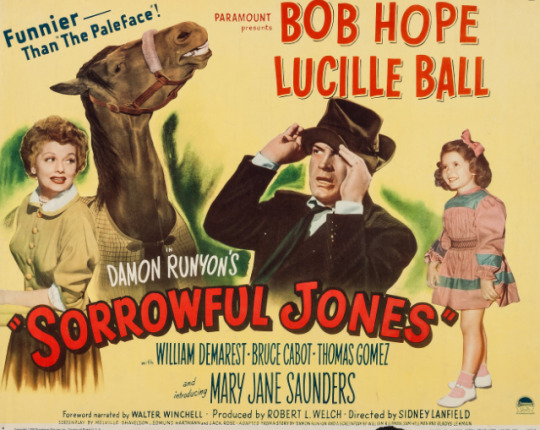
#My Favorite Husband#Lucille Ball#Richard Denning#Bob Lemond#Ruth Perrott#Sorrowful Jones#Frank Nelson#Steve Allen#Alaska#Bombay#The Wright Brothers#Sam Goldwyn#Harry Truman#I Love Lucy#Radio#CBS#Bombay Clipper#To Be or Not To Be#Bees#Old Fashioneds
3 notes
·
View notes